Weekly Writing Summary For The Week Ending 12/19/2024
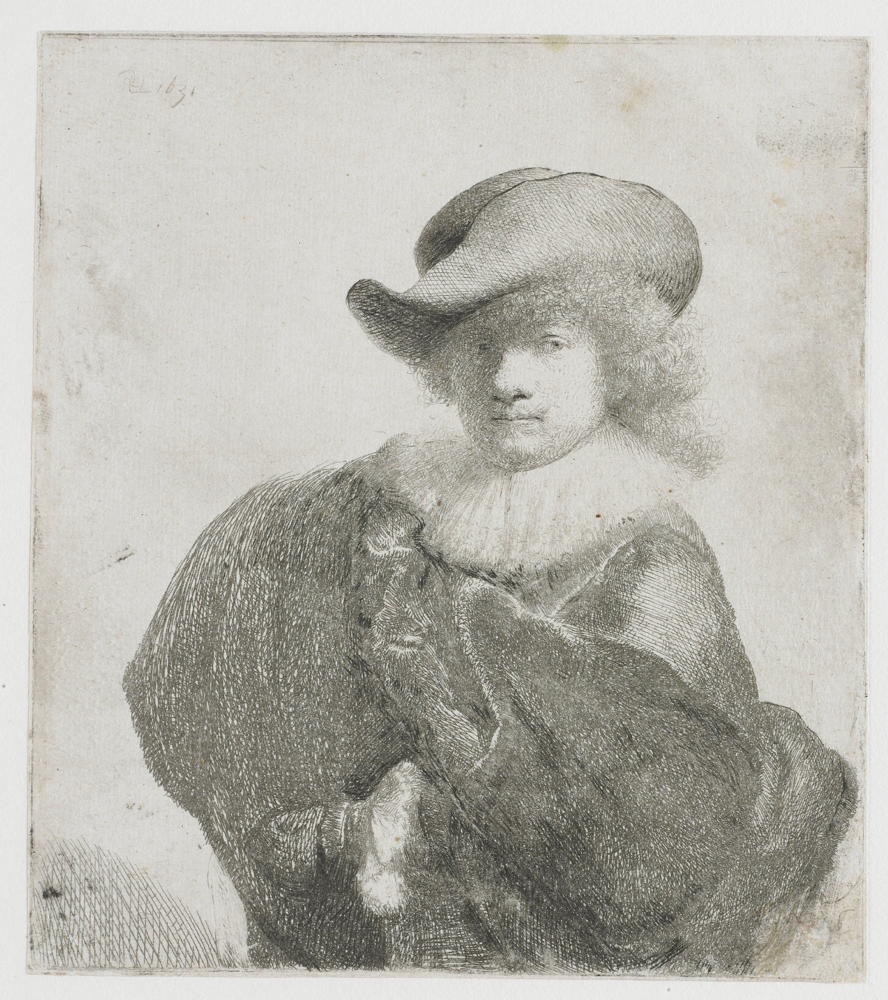
Rembrandt:
Self-portrait in a Soft Hat and Patterned Cloak (1631)
Tomorrow Morning's Problem
Someone I was chatting with at a holiday party asked me if I was retired. I'm never sure how to respond to that question because I don't consider myself retired, yet no one employs me. I responded by declaring myself a writer who puts in his daily hours. I don't know what I'd do if I retired. I still feel the deep need to create something every day and the responsibilities owning The Villa place on me. I continue to get up very early every morning to seriously consider what I should be doing that day. By the time The Muse rises hours later, I've already accomplished something, however modest. The balance of my day builds upon that early success. I rarely fail to achieve something of my own devising, early each morning. If I fear anything, I fear not accomplishing that something. I might suffer from some obsessive-compulsive disorder, except my world seems exquisitely ordered. I am free to procrastinate after I've finished my writing, and I procrastinate plenty, but I am never free to avoid my writing. Am I retired? Not hardly. I can't imagine myself ever hanging up my spurs.
As I finish another series, I ask myself if I have another one in me. The answer is an inevitable maybe. I cannot know until I've finished whether I have another in me. The honest answer would be that I didn't but that I didn't need to have another one in me before I started writing. What would become another one was never in me before I began but passed through me as I continued once I started. The starting primed the pump. The daily ritual maintained the flow. Knowing was never necessary or, I suspect, sufficient. There's no going back to recover what was never started. There's never a good enough excuse for not starting. I have not yet decided what my next series will focus on. That's tomorrow morning's problem.
Passing
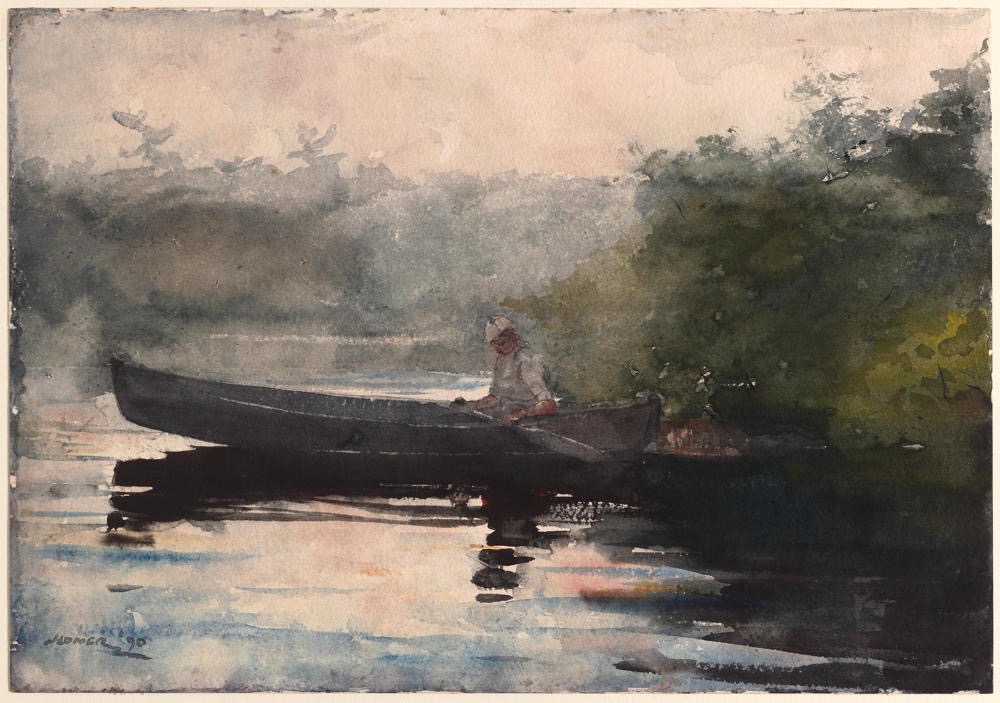
Winslow Homer: The End of the Day, Adirondacks (1890)
" … anyone Exiled never returns."
Our Exile didn't so much end as pass. In the same way, a person passing from life to death does not undo what they've accomplished; their story continues in their absence. As this series might have demonstrated, my Exile, our Exile, remains a prominent presence even now, three years after it passed. It continues Passing. I expect its Passing to continue until I pass, too.
The final few weeks away were excruciating.
PiecesOfMe
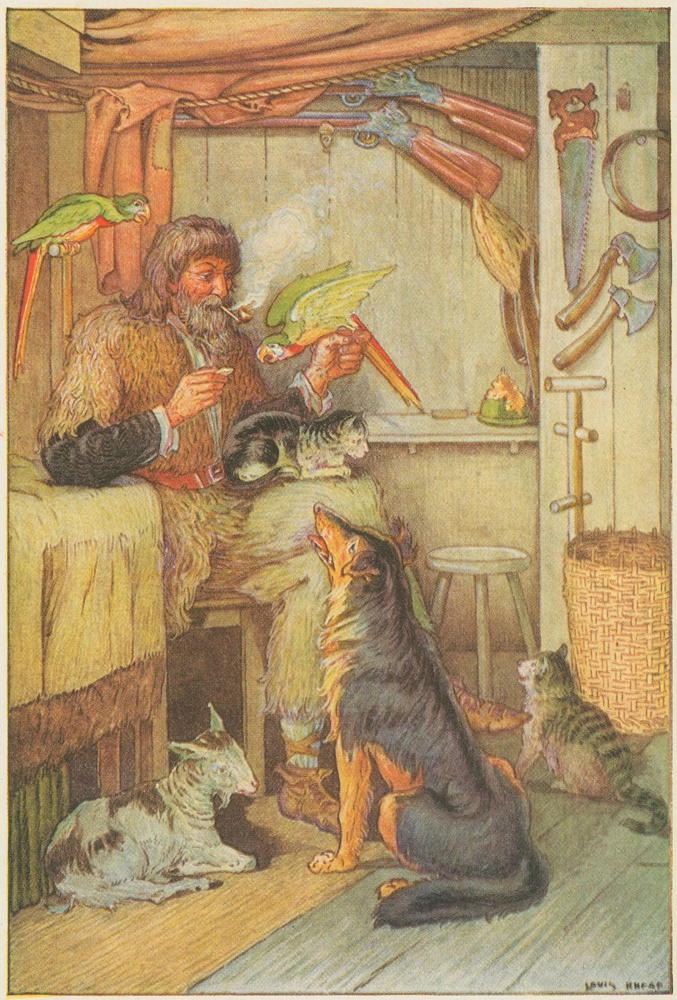
Louis Rhead:
I diverted myself with talking to my parrot (1900)
"Another Exile might be in all of our near futures."
These Exiled Stories have not just been about me, but actual PiecesOfMe. Everywhere we landed on our twelve-year odyssey, PiecesOfMe sloughed off and were left behind. By the end, I felt as though I had been pruned to within an inch of my existence. Though I supposed I was supposed to return with treasure, I returned immeasurable instead. What had I gained but some stories? What had become of me in my absence? Who was I supposed to have become? I returned dumber than I left and likely no wiser, either, for I had been absent the entire time. I'd learned a raft of things that have no practical application back in my homeland, even as generalized abilities. How could I apply my learned facility with public transportation in a place offering little of that? How would my learned tolerance for high humidity serve me when living on the edge of a vast desert? I returned with very little to show for my absence but stories.
Did my extended absence at least make my heart grow fonder?
LastAdolescence
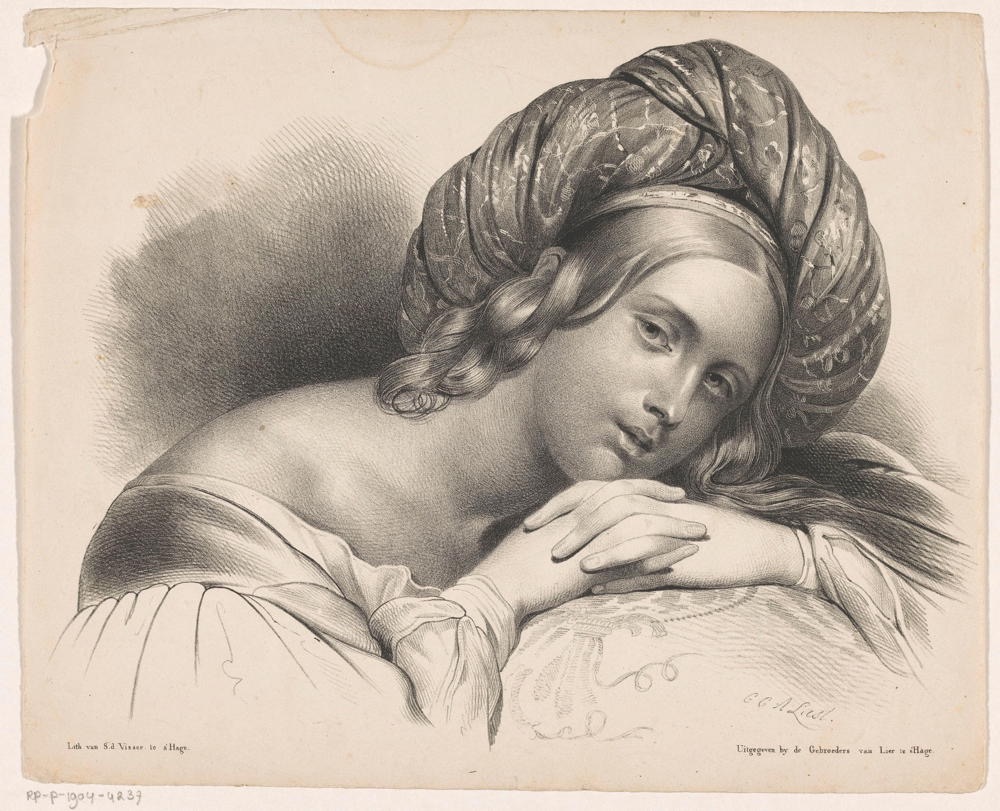
Carel Christiaan Antony Last:
Meisje met Tulband [Girl with turban]
(1835 - in or before 1839)
"Once we were empty nesters again … "
More than a year before we returned from Exile, well after we'd comfortably settled into Colorado, The Muse received an urgent message from her granddaughter, our GrandOtter. The Otter had struggled since graduating high school, and even achieving that success had proven extremely stressful. All drama aside, and there had been ample drama from The Otter over recent years; she suffered from a baffling collection of diagnoses. One suggested she exhibited symptoms of some borderline personality disorder that seemed to me to have been an over-the-border one. Whatever the context, when The Otter contacted us, we couldn't help but respond, for she was our GrandOtter, and we'd considered ourselves an implicate part of her childhood and life. If she were in trouble, we'd respond.
It was always difficult to separate the real from the imagined with her.
Separations
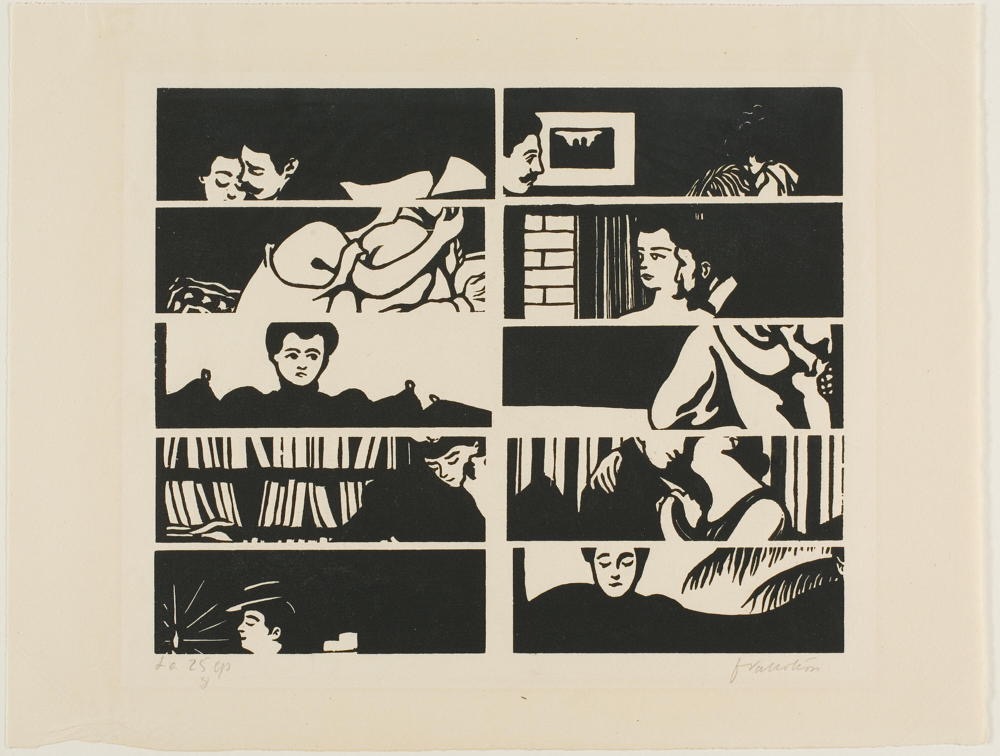
Félix Edouard Vallotton:
Cancellation sheet,
fragments of ten woodblocks from Intimacies (1898)
" … actively engaging in her separation dance."
We ended our Exile with several preliminary Separations, for we'd become connected, perhaps even addicted, to our Exile after more than a decade gone. We had been Exiled for almost as long as we'd been together before we were Exiled. The Exile threatened to outshine our prior experience together to become the new anchor. The shelf life of any Exile experience was never meant to outlast the sum of any of the Exileds’ pasts. We felt some pressure to return before we exceeded some imagined upper limit, after which no one can credibly reappear, but we couldn't simply disappear. We had made connections. The Muse was still employed and more or less enjoying her Exile career. I'd made peace with where we'd landed, only rarely feeling too isolated to bear. Wherever we were once we landed in Colorado; we were much closer to home but still more than merely a long two-day drive away.
My mom died after we moved to Colorado.
LeaveMaking
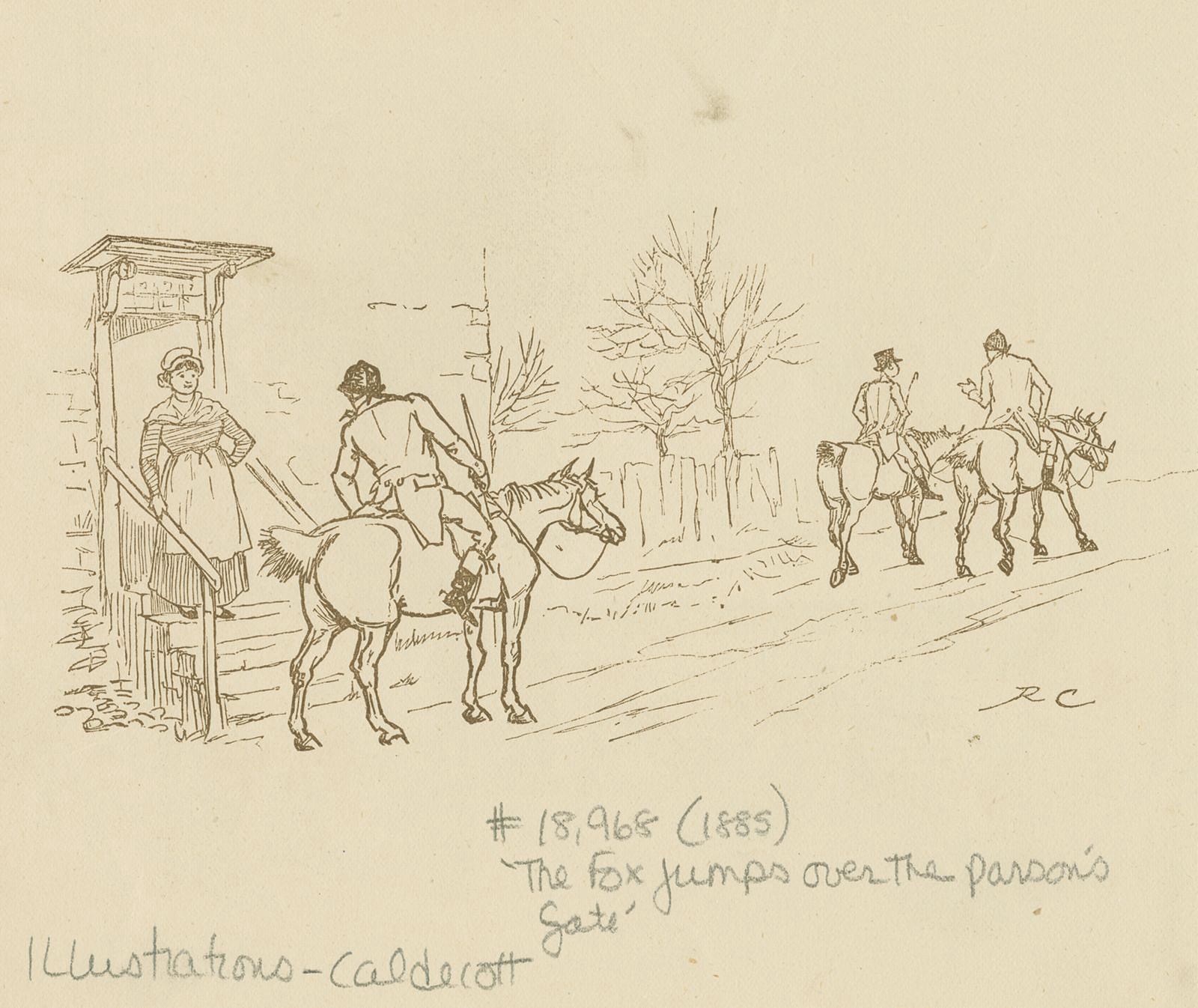
Randolph Caldecott: Taking leave. (1885)
"More complications sat between us and our exit."
We focused on leaving through the last half of our Exile. For over six years, The Muse schemed to position herself—us—where we could cleanly leave. In Takoma Park, Maryland, our starting point seemed impossibly far away from our target in Southeastern Washington State. A single hop home seemed unlikely to work from there. Further, after the first six years in Exile, we barely had our heads above water. We'd need more capital to achieve what we aspired for upon returning from our Exile. The Villa would need considerable refurbishment once we returned, and we'd learned that opportunities for accumulating wealth were few and farther between there than they would be almost anywhere else, like in Colorado.
Our first move took us to Colorado, then, where we figured we just might be able to swing purchasing a home.
ChristmasesPast
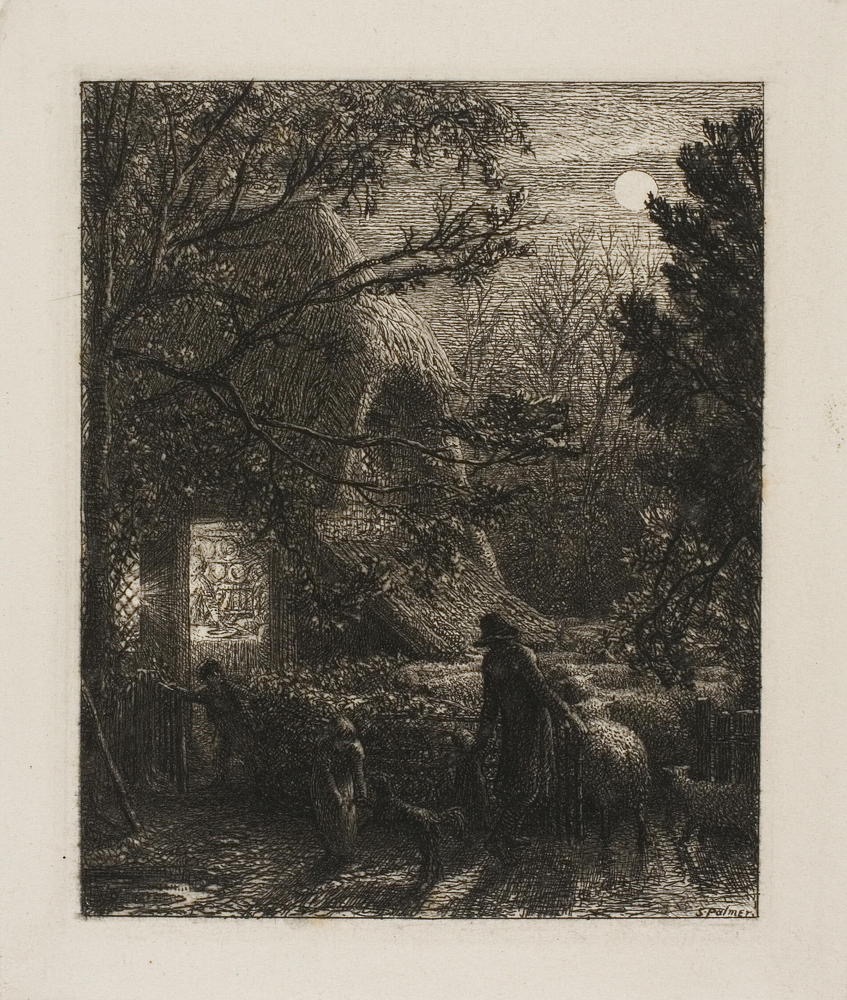
Samuel Palmer: Christmas (c. 1850)
"Our Exile was best when ChristmasesPast were the present."
The Muse and I didn't dwell day-to-day upon our dilemmas. We had our lives to live, Exiled or not, and the usual activities of daily living consumed most of our available attention. However miserable we might have become, we maintained a believable semblance of normalcy. Wee-hour thoughts rarely visited and never persisted into full obsession. We did not live lives of silent desperation. We were comfortable after a fashion. In some ways, we became more comfortable than we'd ever been before while we were Exiled, for some of the complications of regular life didn't haunt us in our absence. Our social obligations narrowed. Our acquaintances slimmed. We knew few. Our time largely remained our own. Once we developed routines, little further problem-solving was involved in our daily lives. It was sometimes like we had been furloughed from our regular life instead of being absent without leave.
When the Christmas season came, though, we teleported ourselves home.
Weekly Writing Summary For The Week Ending 12/12/2024
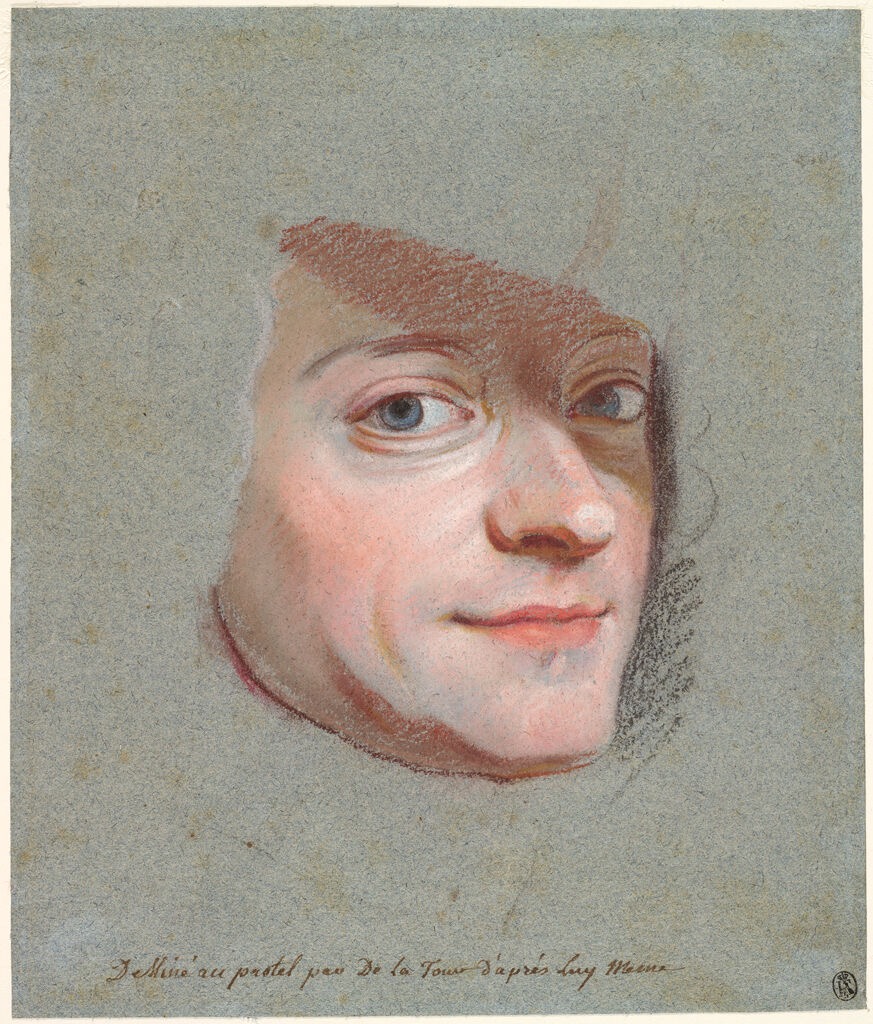
Copy after(?) Maurice-Quentin de La Tour:
Self-Portrait (18th Century)
Except For Occasional Reappearances
I took myself to lunch today, the busiest day of my week after the carpenters finally showed up this morning to begin installing our new porch deck. They'd hauled away the gold-plated deck boards—clear, verticle grain Douglas Fir tongue and groove three-inchers—a few weeks ago to sand and finish them in a heated shed. The boards returned transformed! We'd discussed the final details as light snow fell, and I left exhausted. I decided to take myself to lunch to purchase some respite. I went to the Sub Shop to order some of their chicken rice soup, which isn't soup so much as a thick goup, perfect for a chilling Thursday lunch. I ordered the soup and a half of a tuna sub. As she dished up my goop, the checker said she'd bring out my sandwich when it was finished.
I retired to a table in the back and enjoyed my goop, but my sandwich never came. I returned to the counter, and the checker reacted as if she'd never seen me. I responded to her asking how she could help by saying I was back for that half sandwich she'd said she'd deliver to my table. She looked astonished! "I wouldn't have said that," she replied, "because I don't deliver sandwiches to tables." She went on to ask what I'd ordered as if she were speaking to someone who had recently returned from the Twilight Zone. She turned to dish up the goop, and I stopped her, saying I'd already eaten my goop and just wanted the sandwich. She asked me what I wanted as if I had yet to order and paid for what I wanted just a few short minutes before. She took my order and passed it on to the sandwich maker, who had witnessed my earlier interaction. A minute or two later, she handed me the tuna in a to-go bag, though I'd ordered it for there, and, curiously, didn't charge me again for the sandwich she'd not acknowledged I'd earlier ordered and paid for. She'd even thrown a chocolate chip cookie into the bag. I retired to my table to swallow that sandwich, wondering.
The Muse has been out of town this week, so I've been lacking one of my usual verification mechanisms to confirm I'm present. Due, probably, to some Heisenberg factor, I might not actually exist unless observed by someone who knows me. My cats often perform this service, but in that sub shop, I was missing my verification medium and, therefore, experienced what it might be like without me being present. This episode perfectly encapsulated my Exiled experiences. You might recall the episode where I was feeding feral cats with a four-year-old. We named one of those cats The Cats Who's Never There. I got to experience how that cat must have felt. My certainty that he probably didn't exist and that raccoons were eating the food we left collapsed his existence wave, but only for me. For lunch today, I had a dish best never served, the sense that I might not actually exist and that I might have been permanently Exiled to someplace else, except for those occasional reappearances.
ConstantCompanions
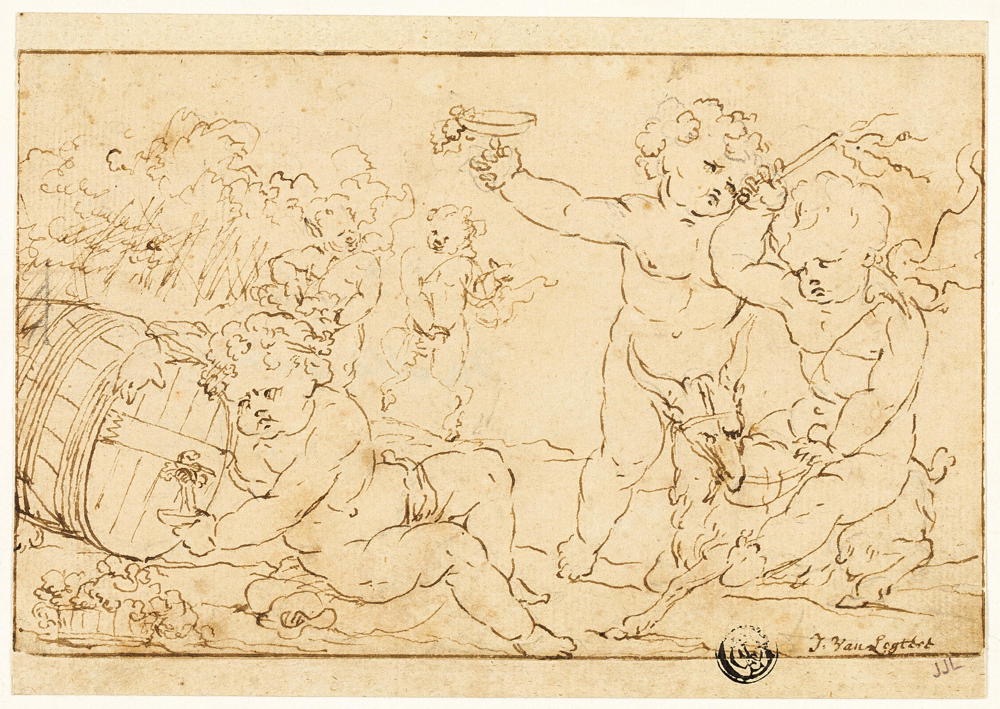
Possibly after Ignatius van Logteren:
Young Bacchus and Companions
(not dated- Early Eighteenth Century)
"He serves as a continuing inspiration."
My Exile was eased and occasionally burdened by the presence of ConstantCompanions in the form of two cats. Crash, the senior partner, had adopted me when I was recovering (poorly) from my second divorce. I suspect he recognized me as a fellow Exile and took to jumping up in my lap. I've always suspected that cats are clairvoyant or, if not, that they're not entirely subject to the same space/time limitations that contain us. I believe he knew what a remarkable companion he would become for me and chose that fate as an act of appreciation and service. He was a life-saver through those harrowing days when The Muse and I first found each other. We were both exiled then, and both were somewhat worse for the wear. Crash took great care of us.
Later, after we found The Villa and relocated to Walla Walla, we found our second cat, Rose, who was forever skittish.
FellowTravelers
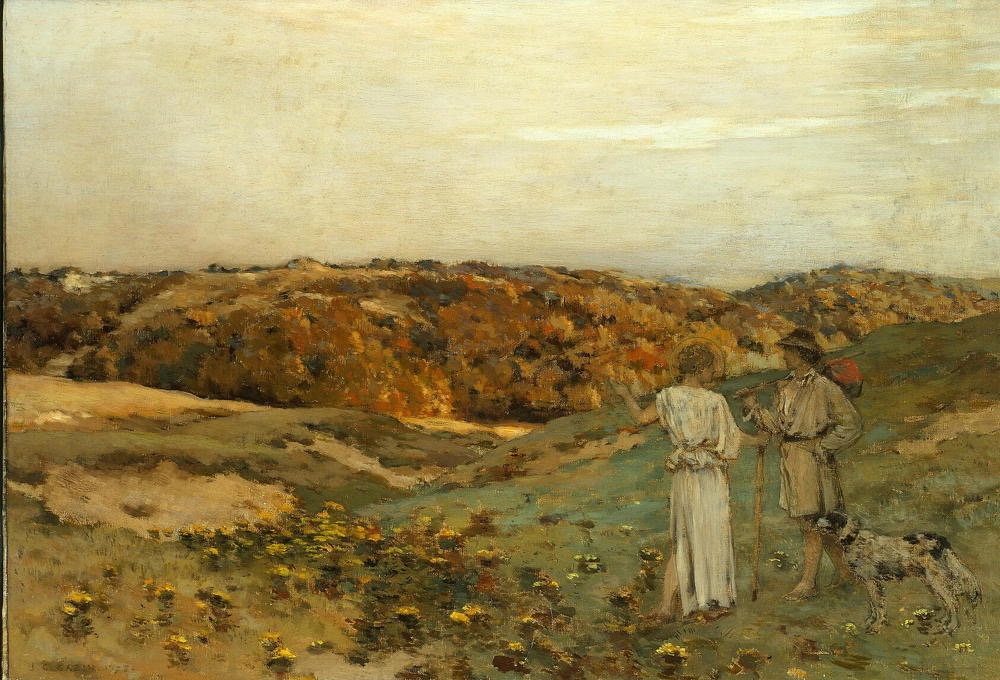
Jean Charles Cazin: Tobias and the Angel (1878)
Background Note:
Tobias and the Angel is the traditional title of depictions in art of a passage from the Book of Tobit in which Tobias, son of Tobit, travels with the Archangel Raphael without realizing he is an angel (5.5–6) and is then instructed by Raphael what to do with a giant fish he catches (6.2–9). The Book of Tobit is accepted by Catholic and Eastern Orthodox Christians as part of the biblical canon but not by Judaism or most Protestant Christians, the latter including it in the Apocrypha. (Wikipedia)
" … mirror images playing before us."
Those who have been Exiled develop an ability to recognize others who have been Exiled, their FellowTravelers. This fraternity was never anything anybody aspired to join. Each was conscripted, much as each was Exiled, not necessarily against their will but probably without anybody first asking permission. Being Exiled must leave similar wounds across its population. Exiled men, women, and children each seem to carry this common attribute. Time doesn't seem to affect its presence. Neither does any trauma related to the experience. For some, their Exile served as an escape; for others, an imprisonment, yet for both, the experience seems to leave similar indelible traces. It's rare that anyone quickly discloses their personal experience with Exiles. Most keep this story secret until the listener can be fairly classified as an intimate. Yet when the disclosure finally emerges, the previously Exiled listener will probably experience an I Knew That Moment. They realize that they knew without being able to assign an explicit label to that sensation.
We're all connected in myriad ways.
Arrogance
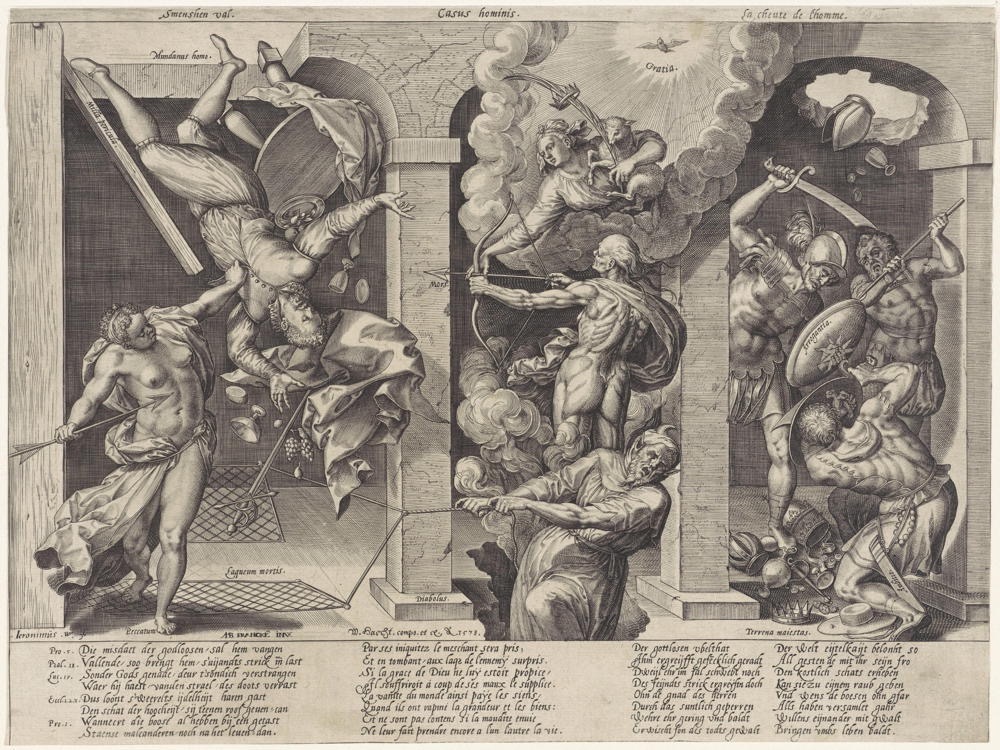
Hieronymus Wierix: Val van de mens [The Fall of Man] (1578)
Allegorie op de ondergang van de mens. De Wereldse Mens (Mundanus Homo) valt met tafel en al door het geopende luik in de vloer. De duivel (Diabolus) houdt zijn netten gereed om hem te vangen. Een naakte vrouw, de Zonde (Peccatum), trekt de Wereldse Mens aan zijn jas, zodat ze hem met haar pijl kan doorboren. In het midden richt de Dood (Mors) zijn pijl op de vallende man. Hij wordt tegengehouden door de Goddelijke Genade (Gratia). Boven haar hoofd de duif van de Heilige Geest. Geheel rechts vechten Arrogantie (Arrogantia), de man met helm, schild en opgeheven zwaard, Eerzucht (Ambitio) en Geweld (Violentia). Ze strijden om de aardse rijkdommen die van het bed van Vanitas door het gat in de vloer zijn gevallen. De voorstelling wordt verduidelijkt in de Nederlandse, Franse en Duitse onderschriften in de marge.
Allegory of man's demise. The Worldly Man (Mundanus Homo) falls into the floor with the table and all through the open hatch. The devil (Diabolus) keeps his nets ready to catch him. A, Sin (Peccatum), pulls the Worldly Man by his coat so that she can pierce him with her arrow. In the middle, Death (Mors) points his arrow at the falling man. He is held back by the Divine Grace (Gratia). Above her head, the dove of the Holy Ghost. On the far right, fight Arrogance (Arrogantia), the man with helmet, shield, and raised sword, Ambition (Ambitio), and Violence (Violentia). They compete for the earthly riches that have fallen from Vanitas' bed through the hole in the floor. The performance is clarified in the Dutch, French, and German captions on the margins.
—
" … an infantile worldview and a wound that could never heal."
The Exiled exhibit a common Arrogance. The act of being Exiled feels undeserved. Consequently, the Exiled feel wronged. They believe themselves to be, as a class, innocent parties. Nothing better fuels an Arrogance than having been unjustly punished. The Exiled feel almost saintly superior in their anguish. Many carry a martyr complex. The world they've been cruelly forced into feels far beneath their station. Having been coerced into abandoning the center of their universe, they recognize how everything in the Exiled-Into hinterlands stands well beneath their standards. Forced to live among the rabble, the Exile might seem withdrawn. They are probably not as shy as they first appear. They are seething and have no idea what rules govern their presence there. They feel embarrassed.
Washington, DC, might seem like a shining city surrounding Capitol Hill until you search for an apartment on the backside of that shining hill.
Impermanence
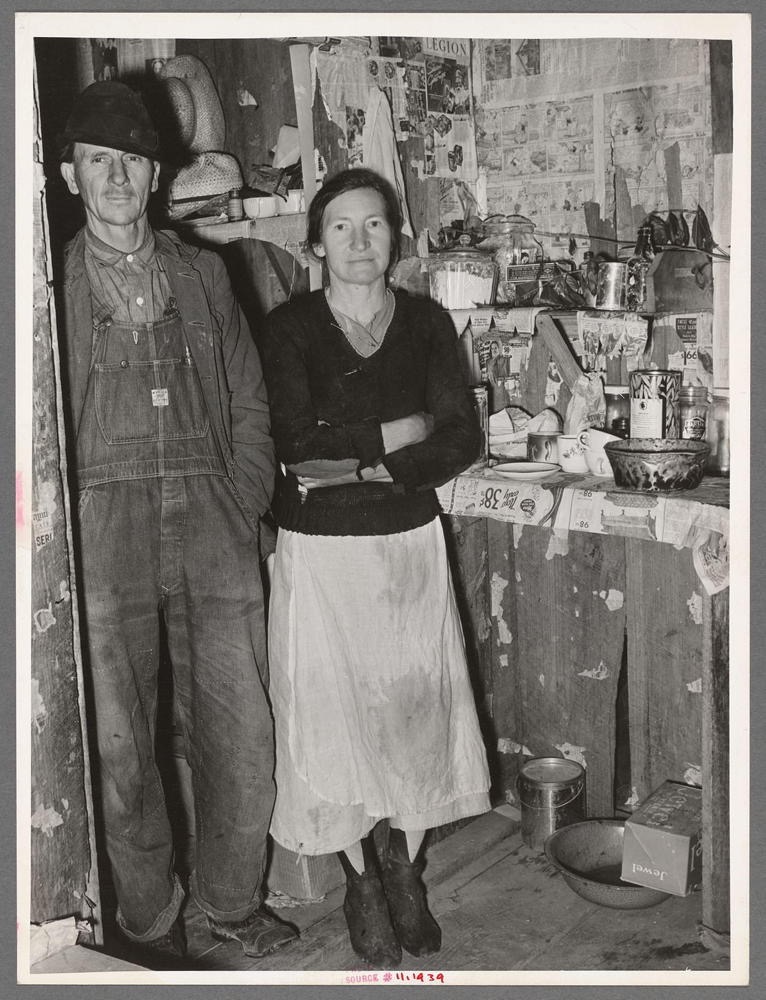
Lee Russell:
Migratory berry pickers in temporary home
near Ponchatoula, Louisiana (1939)
[United States. Farm Security Administration]
"My sense of Impermanence gratefully proved impermanent itself."
A fundamental paradox of living involves the necessity of seeing the temporary as somehow permanent. Life is a wasting state, destined to end eventually, but living seems best served when presumed to be permanent. We don't take the temporary as seriously as we take the eternal; just a subtle reframing materially transforms experience. We live in a too-disposable era where many things come in single-use packaging. We've grown too used to discarding so that we too easily perceive even our precious, non-refundable minutes as somehow disposable.
When I was Exiled, my life seemed to go off the books.
Untreatable
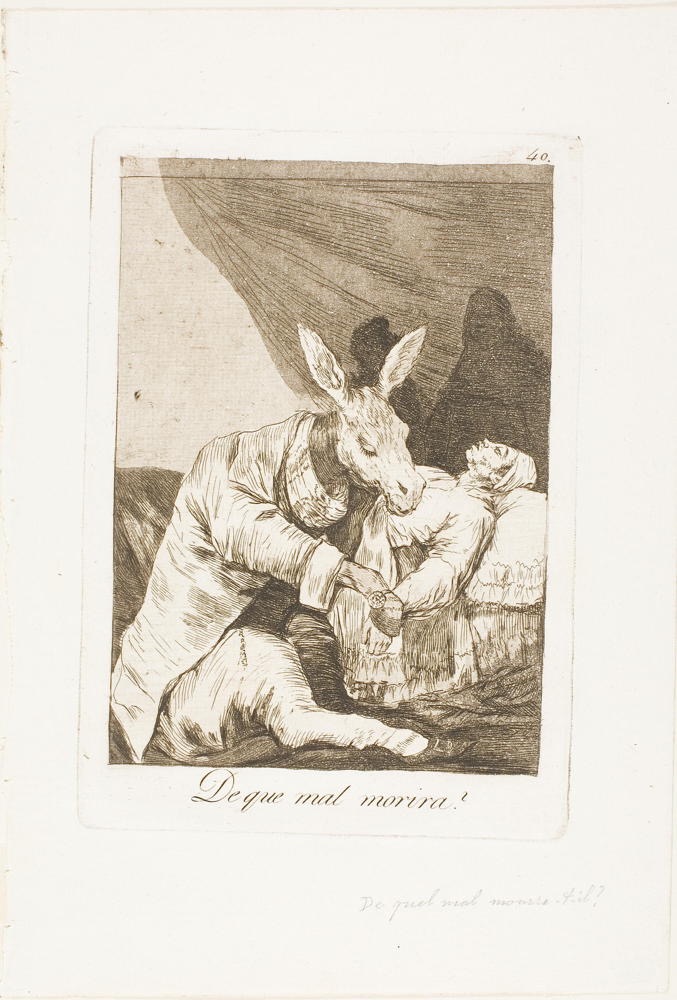
Francisco José de Goya y Lucientes:
Of what ill will he die?, plate 40 from Los Caprichos
(1797–98, published 1799)
" … the lesson that seems to need to be relearned anew every time."
Being Exiled does not amount to a treatable condition. It is not a problem requiring a solution, though I first considered it a serious problem. I spent considerable nonrefundable time needlessly and fruitlessly seeking a solution. My life became a parody just as certainly as if I had awakened to find myself cast in an old I Love Lucy episode. This experience might have been tragic. Indeed, it seemed as though it certainly could have become tragic. That it didn't, or eventually didn't, amounts to a form of magic. I certainly contributed to the comedy of errors. I sought salvation from what I might have more productively considered a mere flesh wound, a scratch. I blew my condition out of proportion and then blamed the Gods, the universe, or my ineptness for cursing my meager existence. I felt cheated, wronged, and violated. I was the one wielding the weapon, though. I was burgling myself unawares.
In this life, stuff happens.
Reappearing
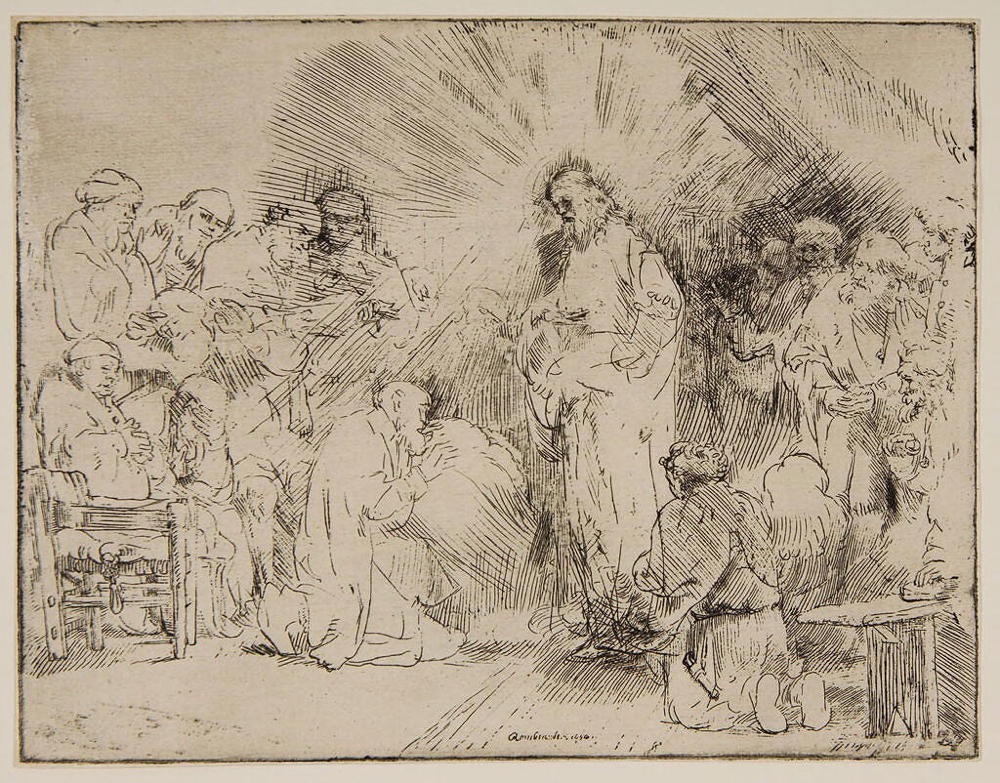
Rembrandt Harmensz. van Rijn:
The Incredulity of Thomas
["Christ Appearing to the Apostles"] (1656)
"Home seems less where the heart grows fonder than where one's pasts live …"
After Being Exiled, The Muse and I occasionally Reappeared on our old home turf. We came for various reasons, usually to see family, though I also once came alone to repaint the Villa. I'd slip down to the Main Street Starbucks at 5 AM to swipe some wi-fi and post my latest dispatch. I would inevitably get spotted by somebody from my former existence. I would get the opportunity to explain where I'd gone and what I was doing returning. Somebody would usually ask if we'd come back, but I'd have to admit we hadn't. Not yet. We'd recount a few of our former misadventures before disappearing into the ether again. I'd run into old friends wherever I went, even visiting my mom in the old folks' home. Another inmate's kid or a staff member knew us under other circumstances and usually asked after us.
Our stories always seemed pretty lame to us.
Weekly Writing Summary For The Week Ending 12/05/2024
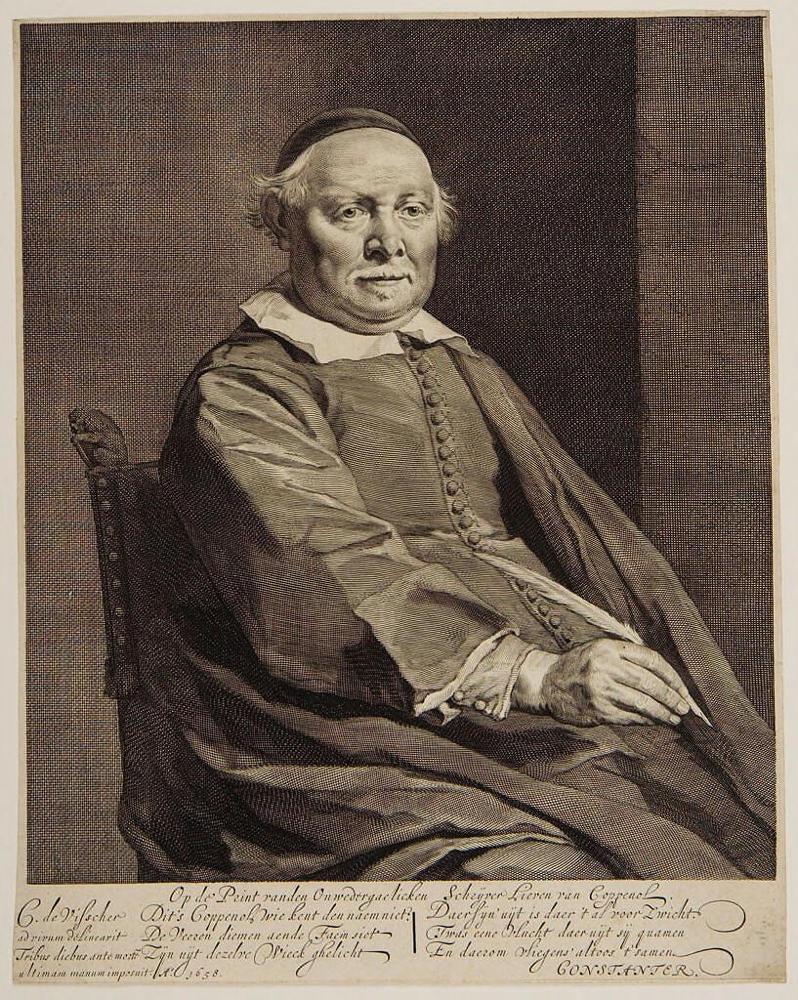
Cornelis Visscher: Lievens van Coppenol, Writing Master (1658)
Muster An Effective Resistance
As Winter approaches here, a persistent inversion layer appears. It brings low cloud and consistent temperatures that very slowly work their way downward toward freezing. For weeks, temperatures might hover in the low thirties without actually freezing. The petunias have not yet been frostbitten, nor have the geraniums. Their days will come as December unfolds. Genuine cold will arrive, and the fireplace will become the center of our lives again. This old house becomes its coziest when it's coldest outside. Sure, a place this ancient leaks a lot. A more or less subtle yet constant breeze discloses its respiration, but it's nothing that can't be cured by putting on another sweatshirt.
The Muse becomes even more the South Dakota Farm Daughter when this weather arrives. She bakes her pies and buys a hog's head to render into head cheese and souse. She finds poppy seed for Stölen-making, and we continue experimenting to find better ways to shell fresh chestnuts. The outside world seems as though it's upside-downing itself, preparing for a new administration spouting absolutely insane notions. Another inversion, with temperatures hovering just above chilling. It remains out-there as it has always been in-here. This time of year, we might just as well celebrate something as collapse into tears. We celebrate being here, at the right time and place for a change, rather than Exiled. Exile might come again next year. For now, we're still here, having so-far survived. The outside might rage in impotent insistence. We can muster an effective resistance.
Mine

Kate Greenaway: Baby Mine (1910)
Edmund Evans, Wood Engraver
"I haven't quite yet gotten over it."
Being Exiled eventually reframed my notions of possession. Before, I held a narrow idea of what belonged to me. Besides books, I never cared much for possessions. After Exile, I held onto my collection of books until just before we relocated to Colorado, when I gave away at least a quarter of my collection to the Takoma Park Library fundraising book sale to avoid moving so many. I took to borrowing books from libraries instead of buying them, and I grew to feel that I came to own any book I'd read and even those I'd just perused. Before Exile, I'd also imprinted on our home as our possession. This relationship was a unique one. I felt more the steward than the lord of that manor. That possession was more obligation than anything else. Exile left me feeling as though I was neglecting that obligation.
My relationship with real estate shifted when we bought that second house in Colorado.
Never_Returning
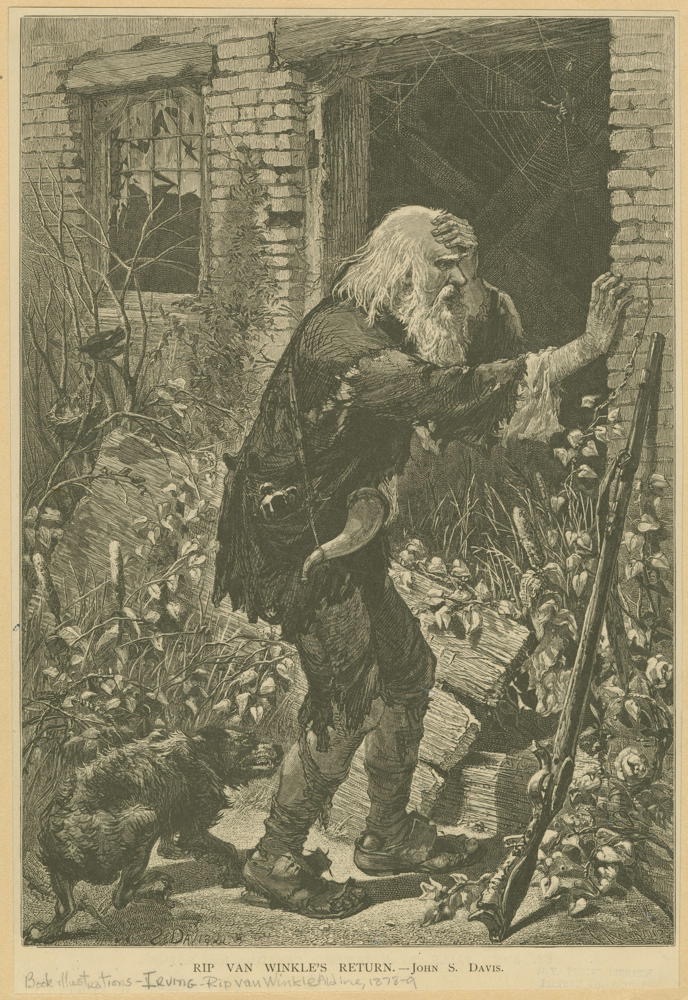
John Steeple Davis: Rip Van Winkle's return. (1879)
Charles Maurand, Wood Engraver
"We returned sequestered and suspicious if we ever returned at all."
At some point after we'd relocated to Colorado for what we imagined would be the final part of our Exile, I started believing that we would be Never_Returning from that excursion. Our source had by that time changed too much for me to believe that we might find enough recognizable remnants of our former existence to believably argue that we'd returned, for time and passing circumstance had already pulled that rug out from underneath us by then. I didn't necessarily view this realization as tragic, for it seemed simply inarguable. We had once imagined we would one day return. Then we came to understand that returning might have never been in the cards, that the plane within which our return might manifest might have evaporated like a wave function upon the moment of our exit. Only constancy of perception could have ever argued otherwise. That constancy almost always proves to be little more than an illusion, albeit reassuring, until it isn't any longer.
If I'd been baited and switched, I had baited myself.
Explorers
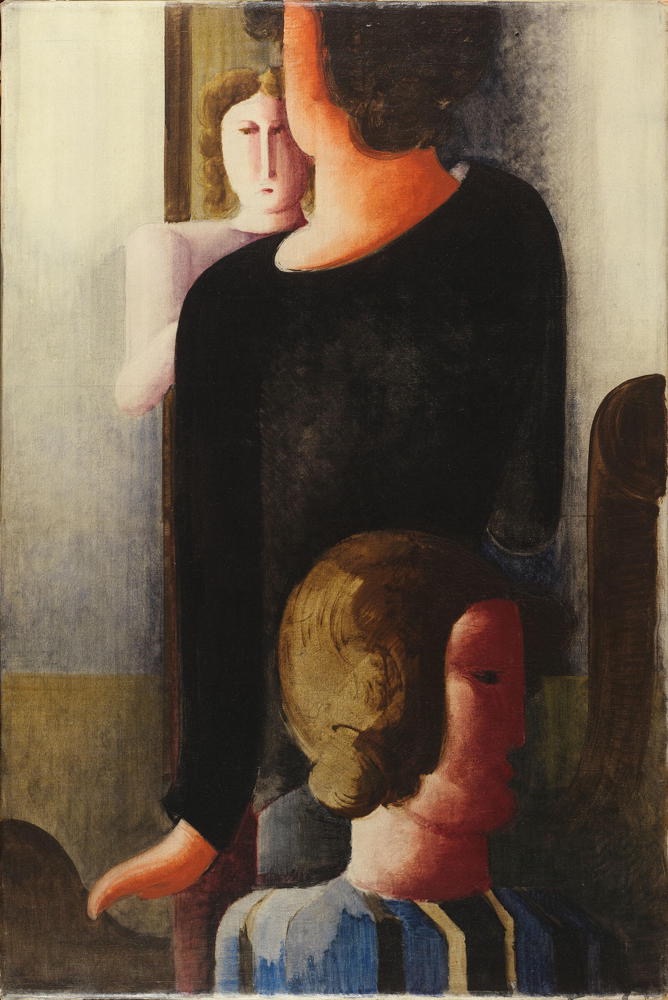
Oskar Schlemmer:
Three Figures with Furniture-like Forms
[Drei Figuren mit Möbelformen] (1929)
"That wanderlust has largely left us since we returned from Exile."
Exploring became one sure way to distract ourselves from often depressing realities after being Exiled. We could go discover something. Though earlier explorers had already discovered every possible thing, our surroundings were new to us; strange customs always surrounded us. We were looking for roads less traveled since traffic seemed to be the most significant barrier to going anywhere. We learned when to avoid the freeways and when they might be okay. We'd often chart a course around the most direct route since they frequently proved to be the most significant hassle. If everyone's discovered a shortcut, it takes longer. We ached to discover our own secret passages.
We kept our navigating systems offline when Exploring because we didn't want The Cloud to learn and then advertise our secret shortcuts to anybody else.
SnappingBack
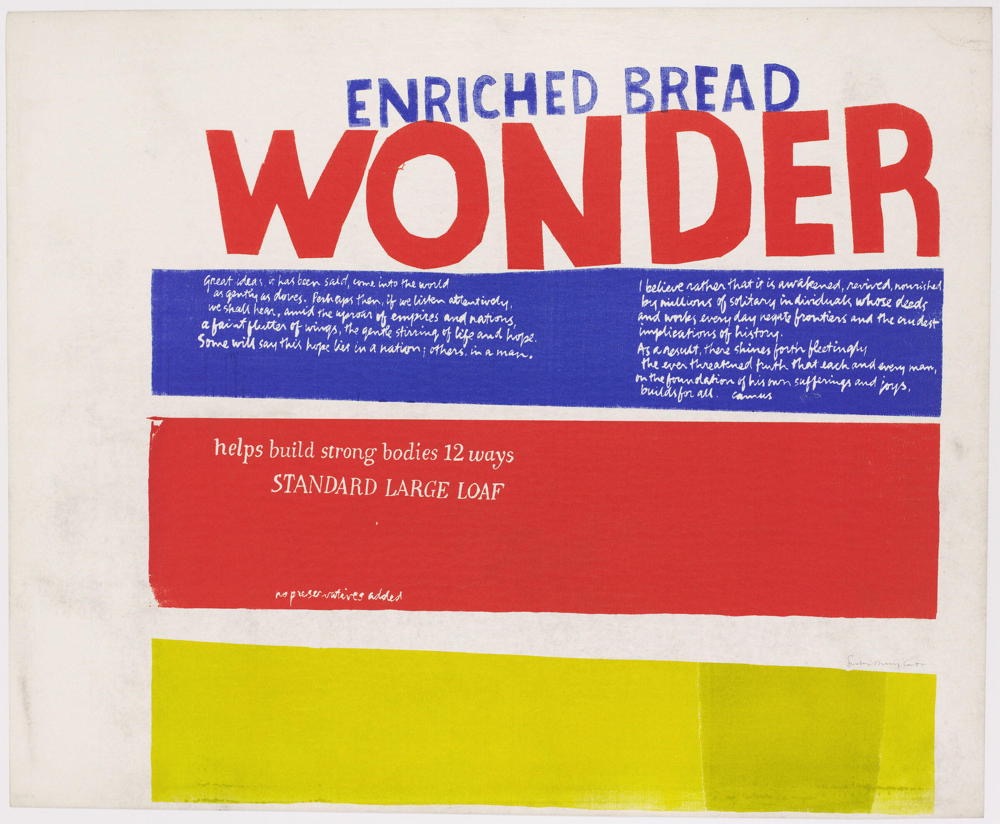
Corita Kent (Sister Mary Corita): enriched bread (1965)
Inscriptions and Marks:
Signed: l.r., in black ink (ball point): Sister Mary Corita
Inscription: ENRICHED BREAD / WONDER / Great ideas, it has been said, come into the world as gently as doves. Perhaps then, if we listen attentively, we shall hear, amid the uproar of empires and nations, a faint flutter of wings, the gentle stirring of life and hope. Some will say this hope lies in a nation; others in a man. I believe rather that it is awakened, revived, nourished by millions of solitary individuals whose deeds and works everyday negate frontiers and the crudest implications of history. As a result, there shines forth fleetingly the ever threatened truth that each and every man, on the foundation of his own sufferings and joys, builds for all. Camus / Help build strong bodies 12 ways sTANDARD LARGE LOAF no preservatives added
Inscription: On verso, l.l.: 65-2
" … still in more or less one piece."
When we were Exiled, losing my DelicateBalance and slipping into LostDays rarely lasted long. We would shortly be SnappingBack into more fully functioning organisms. Just the continually threatening nature of being Exiled sort of insists upon the Exile's full functionality. Days lost cannot turn into lost weeks without increasing the already screaming threat level. We had defenses to handle and offensives to scheme. Exiles do not simply take care of themselves. As with everything, there's always something insisting upon attention, threatening an already tenuous homeostasis. Remember, we had chosen not to be mere renters, so we needed to maintain that all-important owner mentality. We had responsibilities! However powerless or exhausted we might have felt, no excuses could have worked. Like our pioneer ancestors, we'd get back behind the plow mule again, usually by the following morning.
Our discipline doubtless helped us recover after we'd stumble.
LostDays
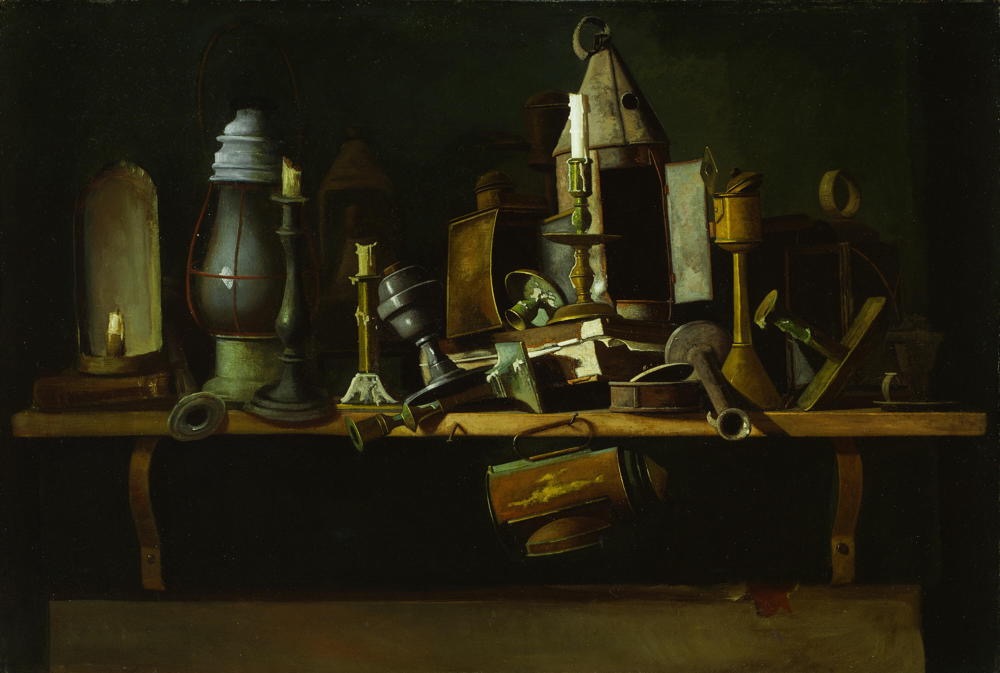
John F. Peto: Lights of Other Days (1906)
" … a familiar part of our regular repertory."
Lest any reader of these chronicles receive the impression that The Muse and I were exceptionally courageous or virtuous after being Exiled, I must note that we experienced at least our share of LostDays there. Sundays seemed to have presented particular problems for me, for I couldn't seem to settle into any rhythm for them. Separated from my weekday routines and alienated by bizarre local rituals, I often felt like the odd man out on Sundays. Both DC and Denver exuded football madness in season, an attraction I never even wanted to muster. There are rituals that inhabitants of big cities observe that nobody not of those places can ever come to understand. The Sunday morning church bells served to alienate me further there. Our small hamlet outside of Denver featured a mega-church with parishioners in the tens of thousands among its half-dozen affiliated campuses spread along the front range. Whatever might have occurred in their sanctuary, they reliably produced a mega-traffic jam every Sunday at noon. We were wise to head in the other direction.
I mentioned in an earlier installment that shopping seemed to be the entertainment of choice for those living anywhere near shopping centers.
DelicateBalance
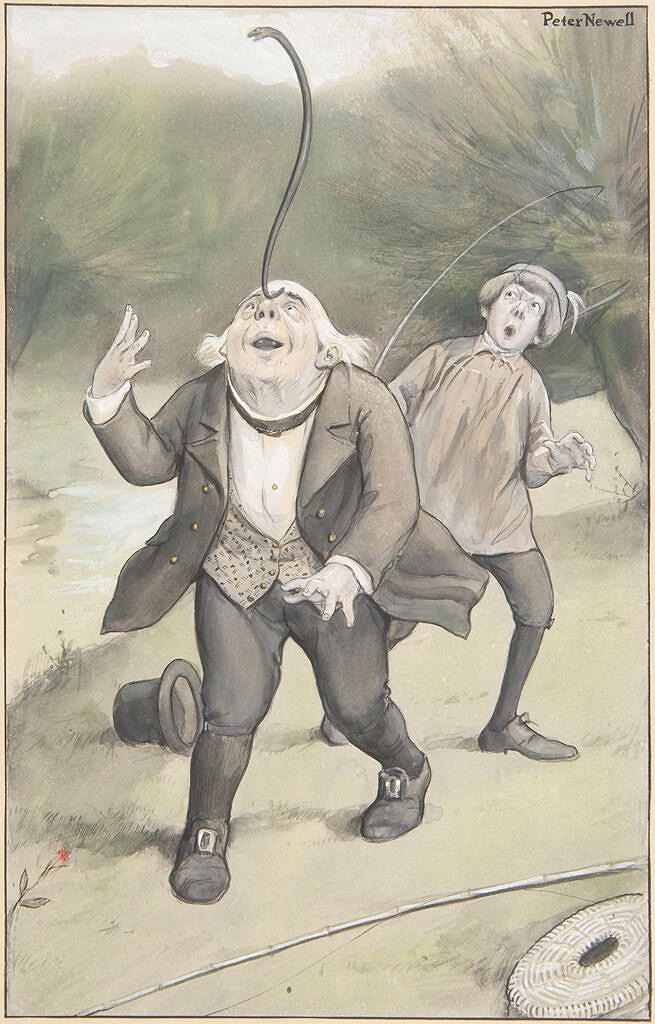
Peter Sheaf Hersey Newell:
Old Father William Balancing an Eel,
from "Alice's Adventures in Wonderland" (c. 1901)
" … whimpering like a wounded puppy."
I live in a DelicateBalance. I never know precisely how delicate my balance might be until some event or experience nudges me off my center. I sometimes seem remarkably robust with the sense that almost nothing could possibly throw me off balance. Other times, I feel precariously poised upon some precipice and likely to take a terrible tumble. Most days, under most conditions, I feel in no danger. I've always been most imperiled by forces I could not see coming. I seldom accurately anticipate the arrival of any unbalancing. These events bushwhack me into becoming their victim. I seem powerless to avoid these, depending upon my allostatic load, a rough measure of the level of burden I'm already compensating for carrying. When that load's been excessive, a feather in the wrong direction can tip me over and pour me out all over the floor.
I don't suppose I carry an unusually high allostatic load.
Weekly Writing Summary For The Week Ending 11/28/2024
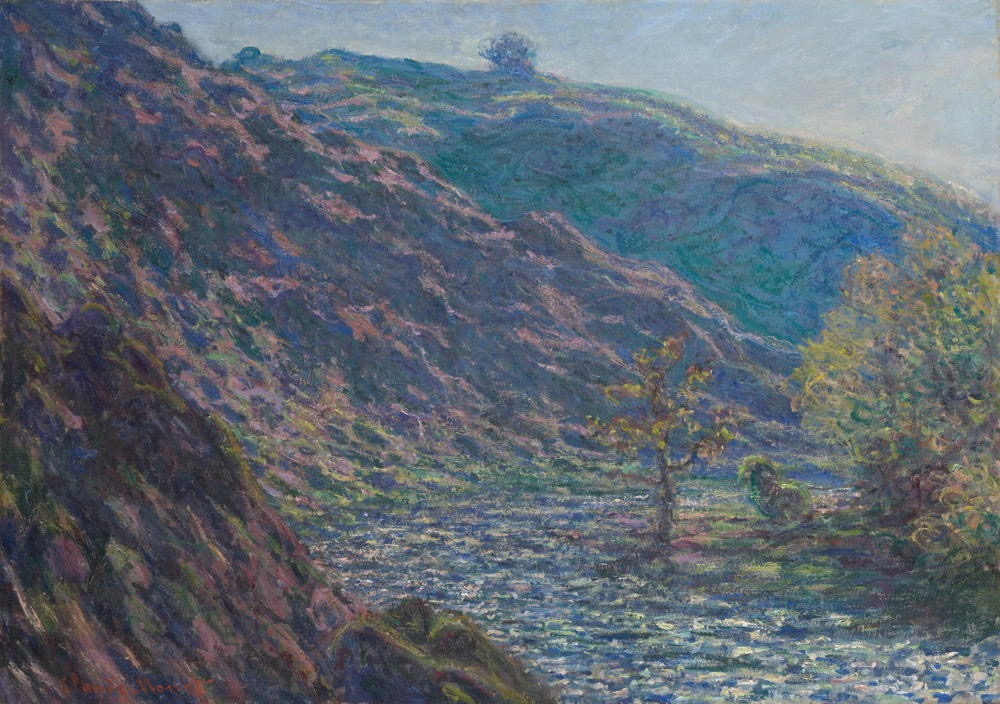
Claude Monet: The Petite Creuse River (1889)
The Impending Downfall
My Business Law professor told me back when I was still an undergraduate that if I wanted to predict our political future five or ten years out, I should just keep an eye on British politics. He insisted that the United States parrotted whatever our British cousins did over the prior couple of centuries with a few years' lag. It never seemed to matter whether the British did something brilliant or stupid; we'd be following on their tail. Their Brexit vote, arguably the most foolish political movement in modern history–at least up until the MAGA movement kicked in—took place in 2019, with the catastrophic effects starting immediately. Their government's "conservative" response to the vote's impact proved disastrous, for they began to engage in austerity to manage the immediate effects of choosing to walk away from their previous prosperity. After a few years of that absurdity, with government services worn to less than a nub, their conservative movement in Britain effectively ceased to exist, a victim of their own appalling excesses. We're about five years behind. November 5, 2024, was our Brexit vote, and we narrowly chose to leave our union. We will shortly experience an austerity-induced recession, which could become depression-quality depending on how quickly we smarten up. Our unemployment numbers should soar as qualified workers are serially disqualified from contributing because Congress could never codify the rules for their inclusion. They took five years. Like Britain, we chose to follow lies rather than obvious facts, chasing pasts improved with fictional proofs. Our government, by and for The People, seems set to turn against The People in favor of a regressive austerity that can only wound the weakest while enriching the already wealthy. The comeuppance will come after providing a lesson Britain had already learned and we could not quite learn from yet. Divided, we fall. We can only stand tall when united. I'm grateful for the coming comeuppance if not for the impending downfall.
ThanksGiven
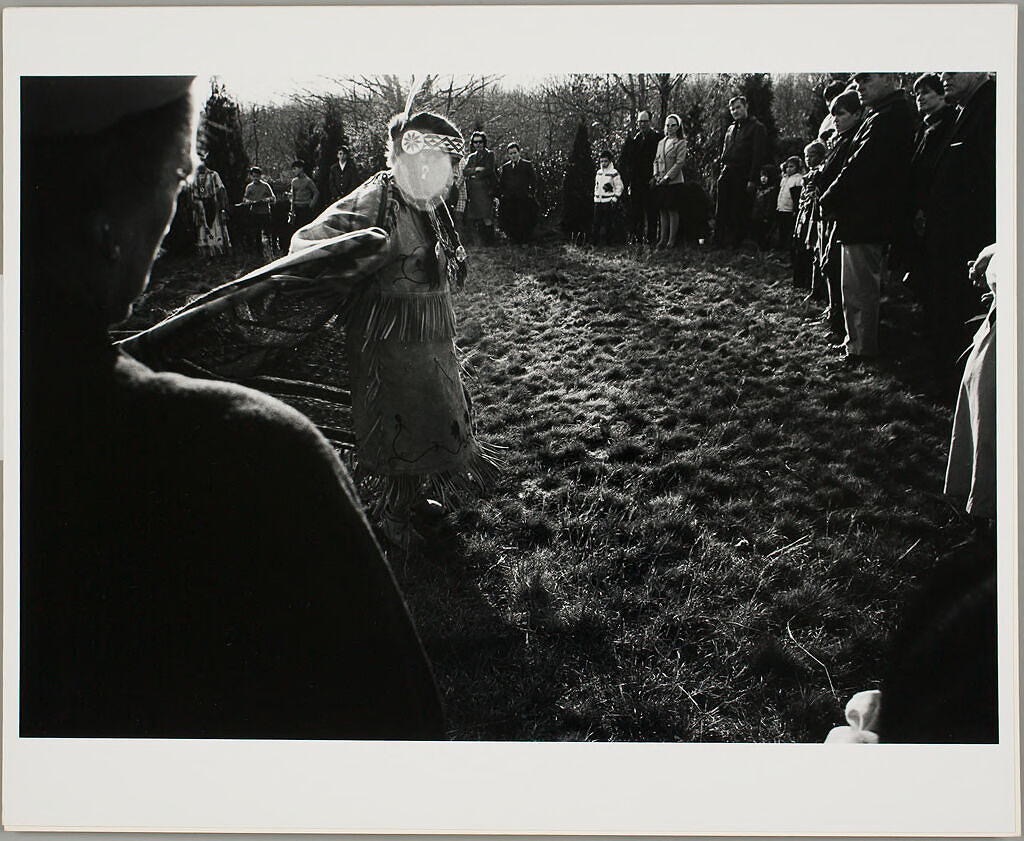
Giuseppe Rosso: Thanksgiving (1968)
" … an experience one cannot choose but for which might feel gratitude later."
I had not understood when, sixty-seven installments ago, I began this Being Exiled chronical. I thought I might be trying to release some trauma by recounting it; a strategy long ago rejected as ineffective by trauma specialists. I had no intention of discovering justifications for gratitude, for had we not been wounded by the experience? Didn't it ding our dignity and leave us wondering about our viability? Of course, it did, but those feelings seem no different from what any random day might deliver. Nothing's strictly one thing or another. We live bittersweet existences, usually more salty and savory than sweetness, anyway. As we age, we grow to favor bitter flavors and think of ourselves as more sophisticated for appreciating them. We find our friends in the most unlikely places and grow to appreciate experiences that might have otherwise just made us bitter.
I might as well feel grateful, for all was not lost.
IdEntity

Julia Margaret Cameron: Julia Jackson (1867)
" … I returned an IdEntity with Ego clearly absent."
After bankruptcy took my professional identity, my ego seemed to recede. I became progressively less and less interested in making something else of myself. For the first time, I stopped striving to become something other than I was. I also lost much of my former curiosity for uncovering who or what I actually might be beneath my cloaking exterior. I became more instinctual as I became less purposeful. I began following my senses. I was never skilled at following maps, so I relied upon a kind of dead reckoning to guide me. I'd imagine the topography, then follow where that notion led me. I often ended up very near where I intended. I sometimes ended up in another county, but neither outcome mattered. I usually had no particular place to be. I held few imperatives. I began thinking of myself as more an observer than a player. What I wanted or needed didn't seem to matter very much after we were Exiled.
My therapist friend Carole first noted my ego's absence.
MissingHistory
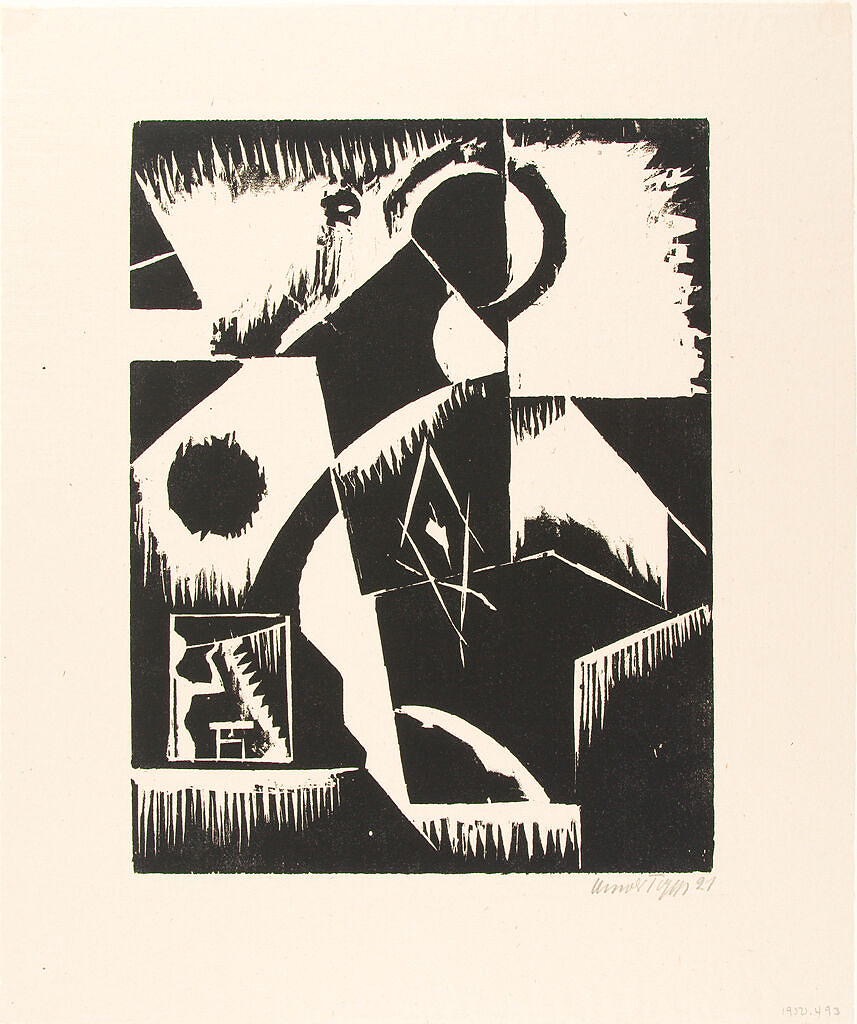
Arnold Topp: Abstract Composition, from the portfolio "New European Graphics, Portfolio III: German Artists"
[Abstrakte Komposition, aus Bauhaus Mappe "Neue Europäische Graphik III: Deutsche Künstler"]
(1921)
"I couldn't hope to become a local while being Exiled there …"
Exiles arrive with little knowledge of the history of the place they're relegated. They remain contextless for a time. In some ways, their initial contextlessness never leaves them, for most of the local history could never have been captured in stories and books but needed living to comprehend. Even the written stories impart little meaning without some understanding of locations. Locations take considerable time to imprint on any newcomer who first tries to get from place to place and can't yet be bothered with history's subtler dimension. Later, an insipient disorientation settles over the Exile, and he seeks resolution. He asks questions, hears stories, and slowly starts comprehending.
Once we'd arrived in Colorado, I'd occasionally meet someone who claimed to have grown up there.
TrackingIn
![]()
Pierre Redouté: Morus rubra = Murier rouge. [Red Mulberry] (1801 - 1819)
"We couldn't help but TrackIn some of what we'd acquired … ."
The house I grew up in featured a Mulberry tree in the backyard. It grew over the clothesline, resulting in some interesting sheets reminiscent of Batik in season. Us kids would climb high to reach the ripe fruit, TrackingIn bright purple footprints across my mother's kitchen floor. Ever since then, I can't help but imagine myself TrackingIn whatever I've just been walking through. This time of year (late November), I notice my Muck shoes carrying smashed Dogwood berries in their treads. Last night, while The Muse and I were preparing supper, I noticed we were listening to The Big Broadcast, a Sunday night tradition broadcast on Washington, DC's NPR station, WAMU. This show replays radio dramas from the heydays, and it, along with Hot Jazz Saturday Night, became a habit when we were living in Exile in Takoma Park. We continued listening when we relocated our Exile to Colorado and still tune in sometimes now that we've returned home.
Nobody returns unchanged from any Exile.
ElbowRoom
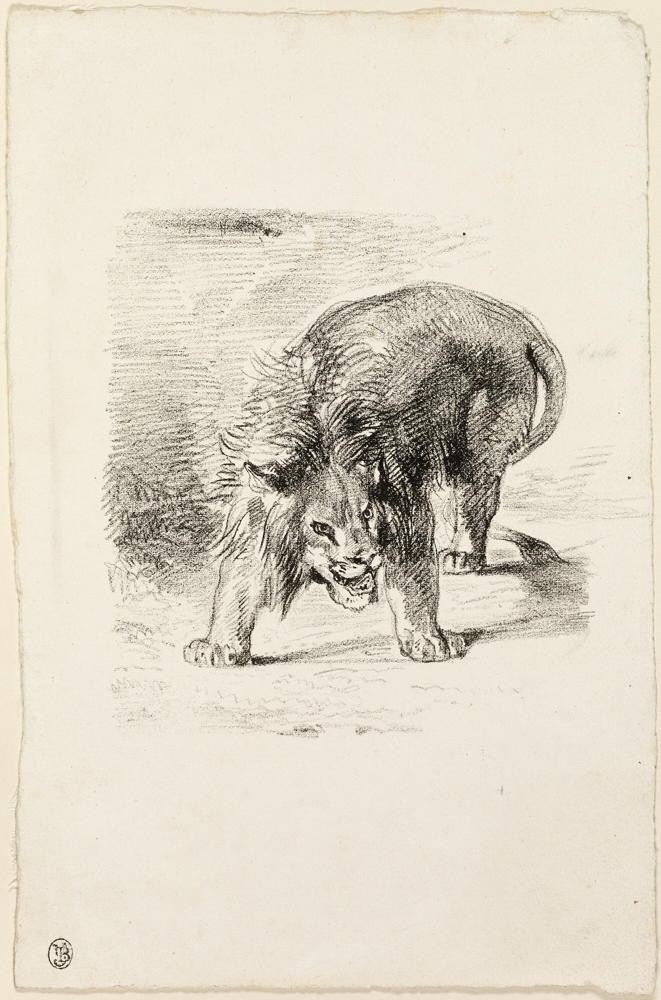
Eugène Delacroix: Standing Lion (1833)
" … lest I become a traitor to my home."
I continued my Discrediting efforts for the duration of our Exile. I wanted to avoid becoming 'of' Colorado, for that would violate my relationship with my true home, the one from which The Muse and I were then Exiled. I tolerated no mixed emotions; even when I found some aspect of our temporary home endearing, I'd find some reason to characterize it as one down from my "real" home. Denver was remarkably easy to characterize so, for it was always a curious major city. It didn't look the least bit pretty, though the views could be fantastic. It grew according to nobody's master plan, being one of those railroad towns that got out of hand. It grew by booms and busts, upward and outward when the times were good, and then down and out when the booms went bust. All the booms eventually went bust except for the population one. A confusion of brick buildings were torn down in the fifties and sixties in the unlikely belief that skyscrapers would replace the resulting naked parcels. The naked parcels remain today and serve as eyesores and parking lots, some with unlikely single-story suburban buildings littering urban views.
Had the place been Vienna or Rome, I would have extended the same treatment, for I was in the business of ego defense.
Discrediting
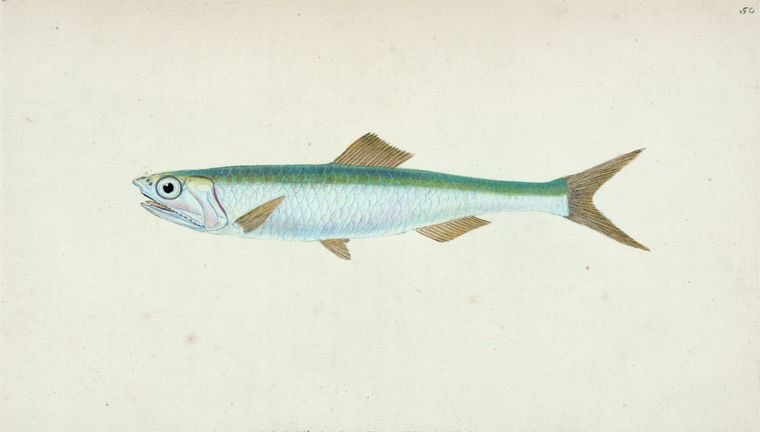
Edward Donovan: Anchovy, Clupea encrasicolus (1804)
" … not a single deli in all of Denver could hold even a small candle [to the one I left behind.]"
Under the Absence Makes The Heart Grow Fonder Clause of the Exile's Charter, I set about hazing our new location shortly after we arrived. I've noticed that I do this by attempting to discredit the new place by demonstrating how different it is from the old familiar one. As with anywhere, living there accustoms one to certain readily available items. For instance, people living near the ocean grow accustomed to eating only the freshest fish. Move one of them inland, and you'll likely hear no end of complaining at first about how much better the fish were when they lived at the beach. There will be no slight hint of derision embedded within these complaints. Perhaps they're protecting or promoting their ego. The net effect of these grumbles reduces the validity of the newer place. I'm uncertain why this is so often the case.
I felt the lack of Italian delis almost as soon as we landed in Colorado.
Weekly Writing Summary For The Week Ending 11/21/2024
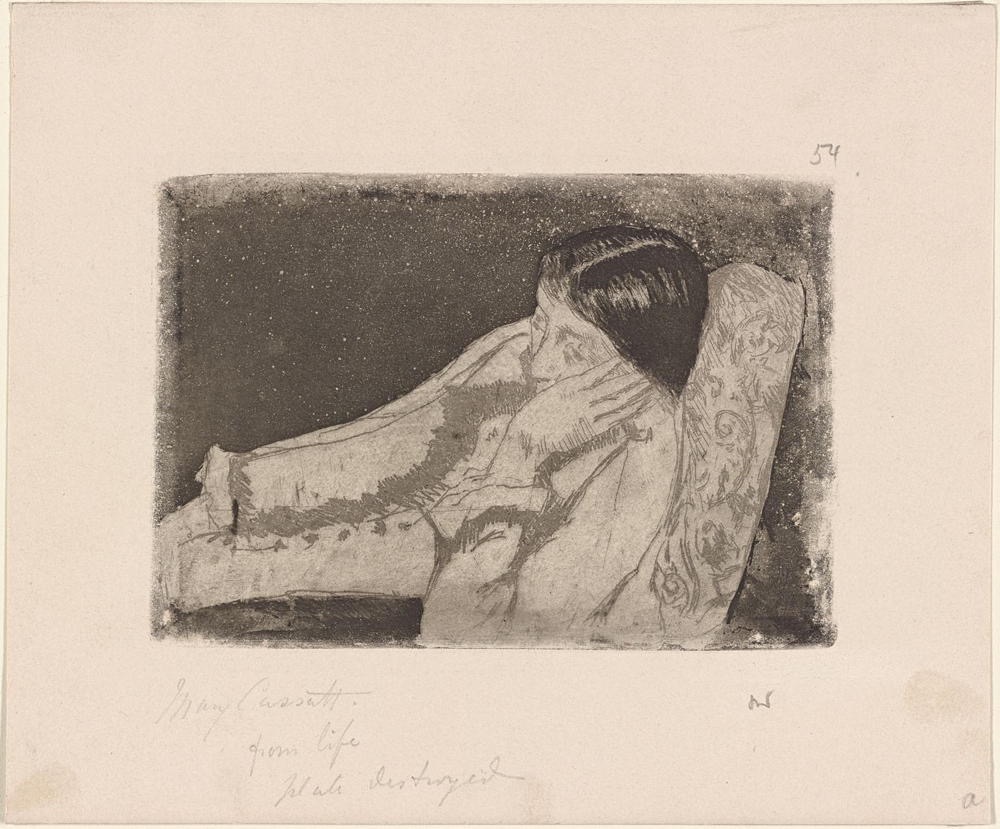
Mary Cassatt: Meditation (1883)
You Were A Gem
My first wife's mother, Nancy, my first mother-in-law and kids' grandma, died this week, aged ninety-six. Her mother, "Grandma Nelly," had lived into her nineties before her, just like most purebred Norwegian women do. She was an educator and a former Dean of both Seattle Central Community College and Chemekita Community College in Salem, OR. She profoundly influenced me, her son-in-law, who had been designated Not College Material in high school. She encouraged me to continue my education after I'd been out of high school for seven years. She gave me a book that showed me what my working-class upbringing had never known. It explained which clothes fit what conditions, when to wear a brown suit and what to wear with it, and how to comport myself in business, stuff my business school studies never covered. I learned to dress at a price point above my station and to shop the all-essential menswear sales. Her master's degree was in home economics, and her PhD was in education. She was a whiz in the kitchen and could paint, hang wallpaper, and sew with the best of them. She finally convinced her caregivers to stop trying so hard to prolong her life. She told them this dying stuff was boring, like watching paint dry. She died like she'd always lived, on her own terms. Rest In Peace, Nancy. You were a gem!
AWriter_(4)
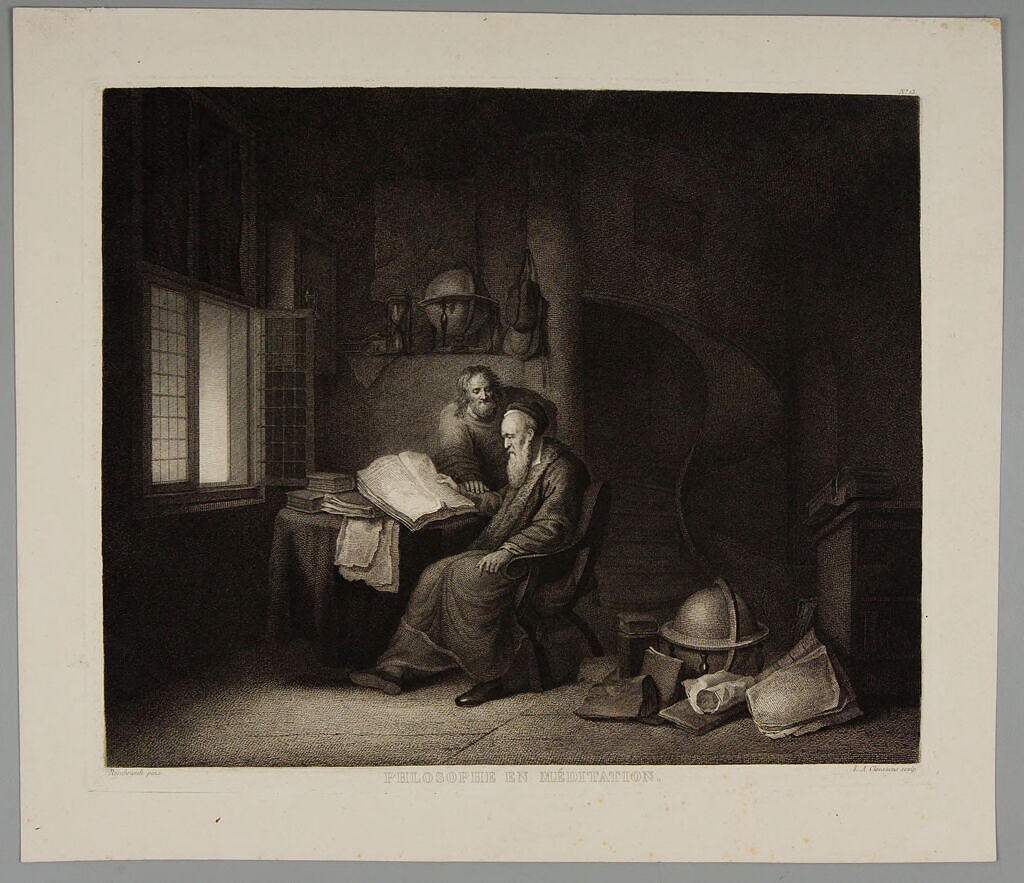
Lambert Antoine Claessens,
After Rembrandt Harmensz. van Rijn:
Philosopher, Meditating (18th-19th century)
" … evidence that I'm at least still trying to make some difference."
I recently realized that this year, 2024, I have been meditating twice daily for fifty years, with very few instances where I could not maintain this pattern. I have yet to give up on the promise the practice held, and while it promises nothing explicit, the implicit benefits continue to attract my almost undivided attention. Initially, the promoters of the practice promised no end to the benefits. They described it as a backdoor route to everything from perfect health to increased intelligence. Some of the devotees went on to carry their originating metaphor out of all reasonableness, claiming they could break some of the otherwise immutable laws of physics. I never held much interest in violating otherwise immutable laws of physics, so my practice has encompassed much more modest objectives, like no explicit objectives at all.
I firmly believe that it's beneficial for me to engage in something diligently, so fervently that I will not shirk even such a trumped-up obligation as meditation.
AWriter_(3)
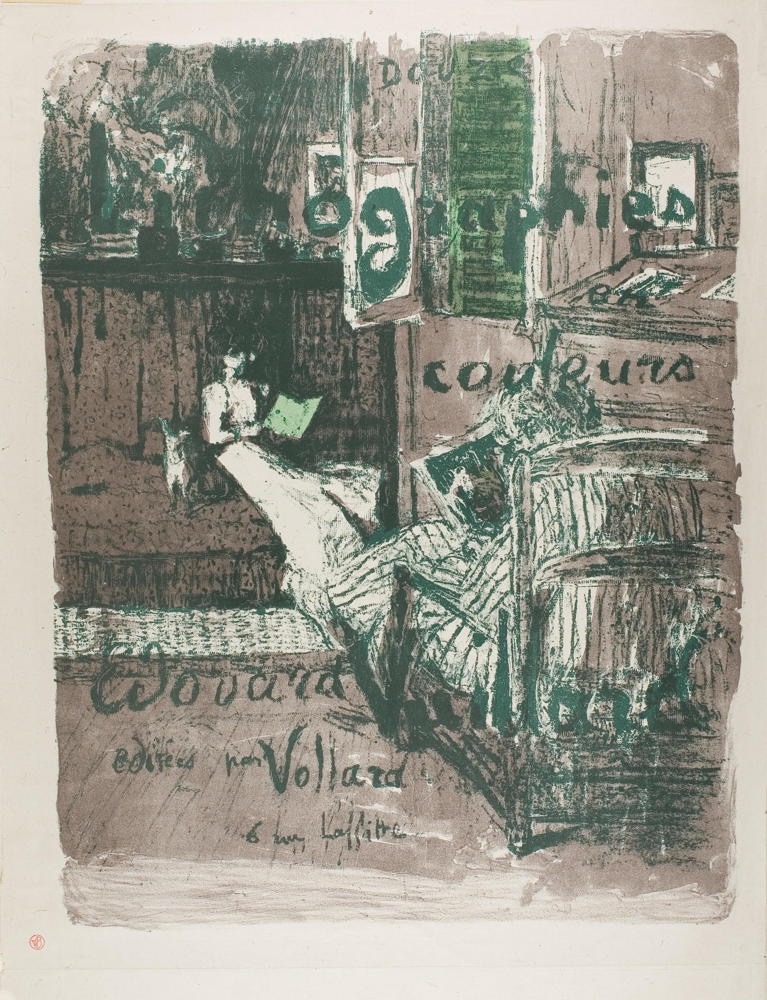
Edouard Vuillard: Album Cover for Landscapes and Interiors (1899)
"I became AWriter by typing with my two-and-a-half typing fingers: Another Summer."
The Muse recalls always thinking of me as AWriter because I always seemed to be writing, but I had not gained the discipline being AWriter requires. She says she thought I'd become a consultant to collect material, and she might be right. To my mind, AWriter, a real one, writes. Their writing can't be contingent upon how they feel or whether they're inspired unless they trade in mere transcription. I once believed writing required inspiration or some other high-minded situation to express itself. That became a self-defeating belief because it often dissuaded me from writing. It generated excuses instead. Whatever else might be the case, a straightforward fact underlies the whole writing business: Writers Write. It's just as simple and certainly no more complicated than that.
That said, though, it must matter what AWriter writes.
AWriter_(2)
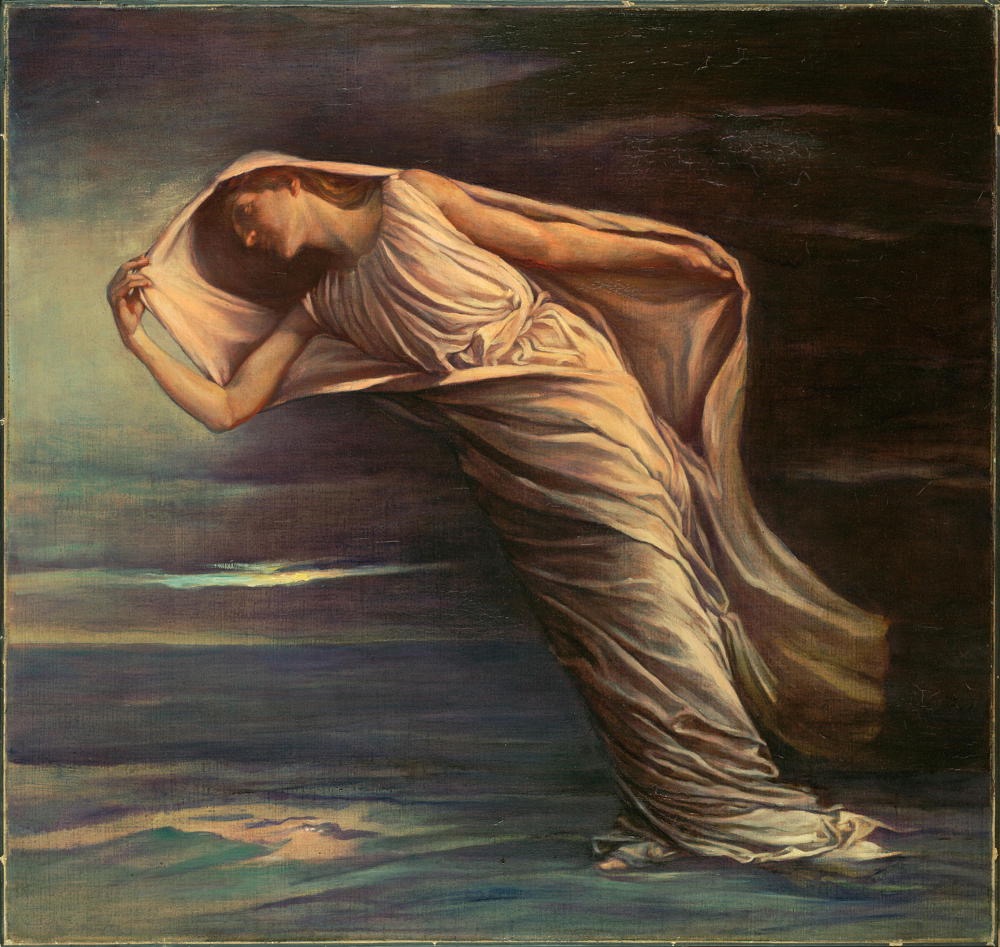
John La Farge: The Dawn [Former Title: Dawn on the Edge of Night] (1899)
" … before I could properly proclaim myself AWriter."
When my soul brother died of ALS, I became the apparent heir to replace him as the author's representative on our mutual publisher's board of directors. This nomination boosted my sense of legitimacy as an author, if not necessarily as a writer. It was unusual in the publishing industry for an author's representative, let alone an actual author, to serve on a publishing company's board. Other board members included a bookshop owner, a diversity and inclusion expert, also an author, and a woman who worked for a prominent author's company, so it was more than just me there representing author interests. The assignment confused me since its details had little to do with what interested me. I was never that into balance sheets, but the responsibilities leaned more toward encouraging a coherence between the firm's philosophy and its operations. That purpose was right up my alley. I even felt hesitantly competent to serve.
The firm's CEO took to coaching me through a book idea I'd been harboring but hadn't managed to get flying.
AWriter_(1)
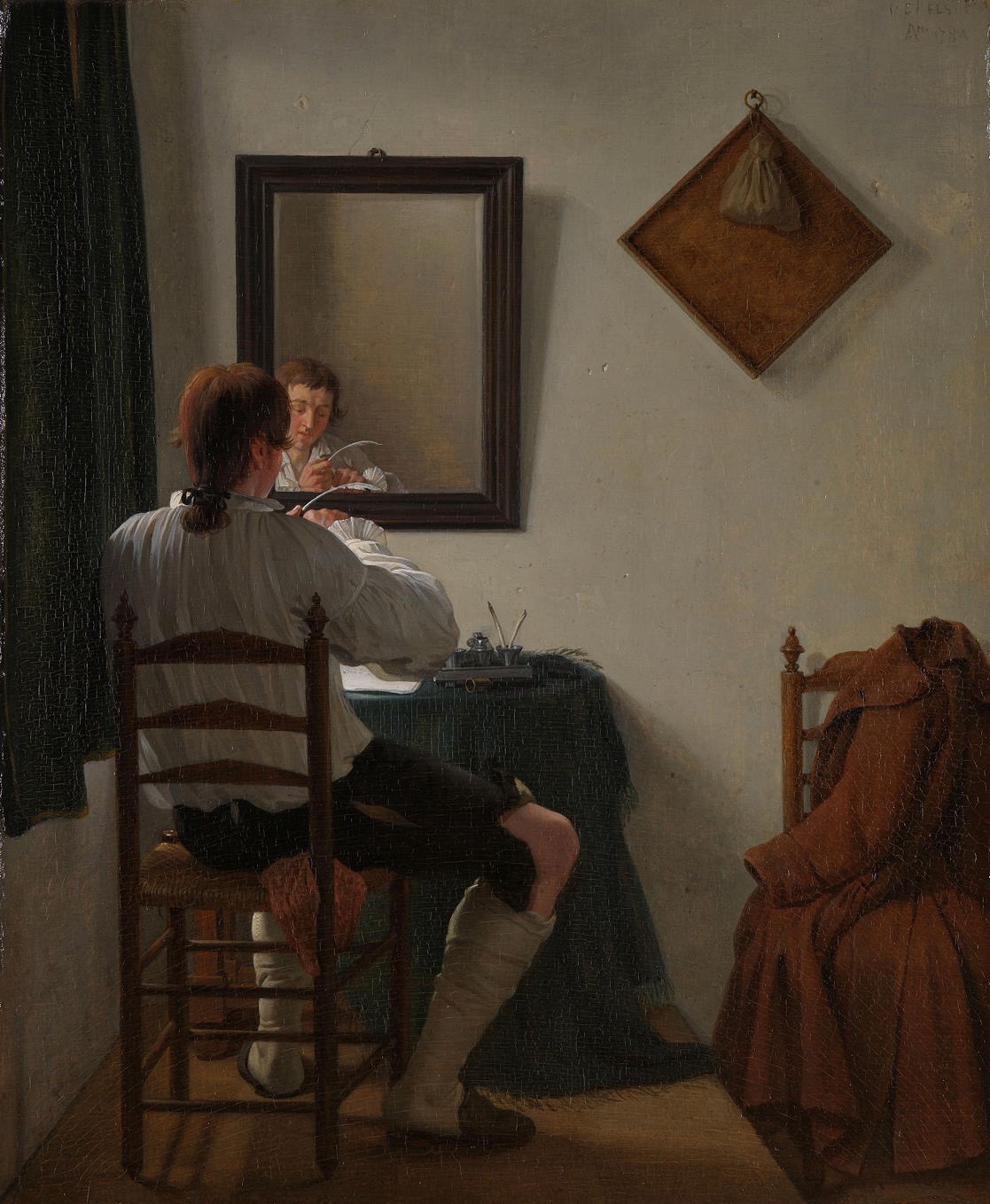
Jan Ekels II: A Writer Trimming his Pen (1784)
"I wasn't quite a writer yet …"
I discovered that I'd become a writer while in Exile. This discovery took a while, for I needed to work through the usual stages of acceptance to make it. I had already become an author by the time I made this discovery, and though I'd been writing for decades, this discovery shocked me. I had previously considered myself a wannabe writer with the aspiration but without the necessary certifications. I didn't yet understand just how one became a writer. I just knew that I hadn't become one until then, I had. The final transformation came in a moment of begrudging and beligerate acceptance, an "alright, then, dammit" moment that finally quieted the roiling questioning and controversy forever. Before, I wasn't. After, I really was.
This discovery resolved nothing but the lingering background uncertainty anybody might hold about any aspiration.
TheLight
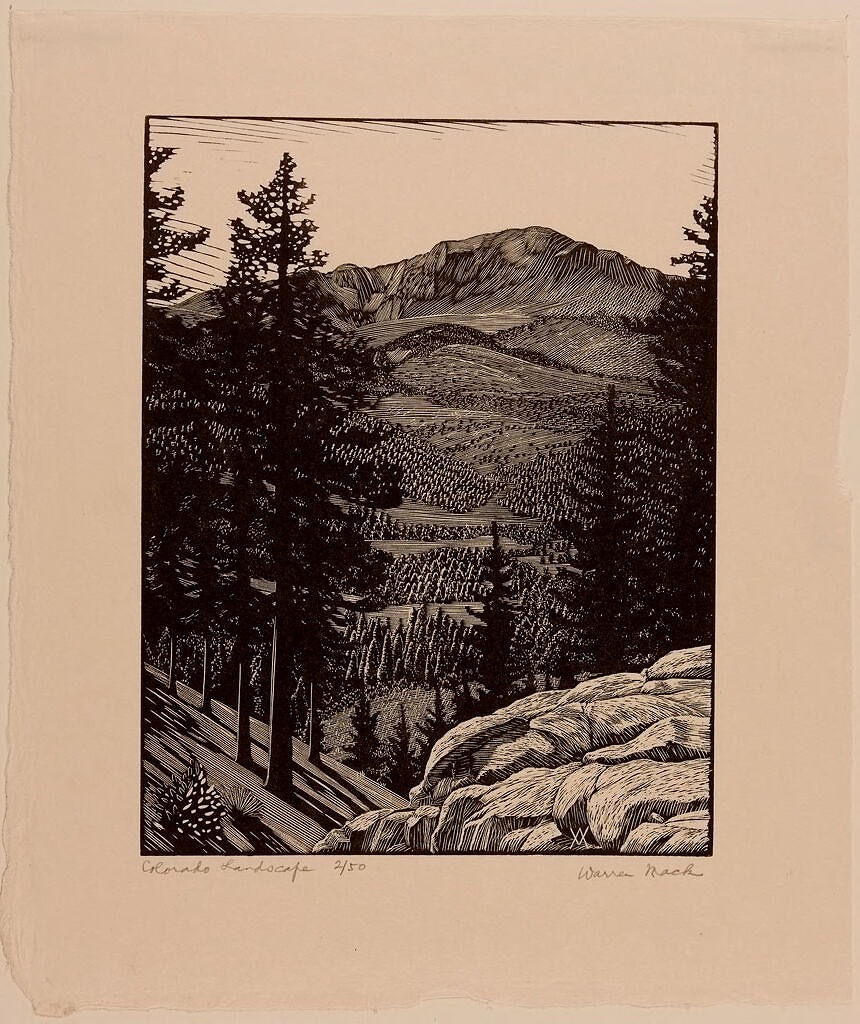
Warren Mack: Colorado Landscape (First half, 20th Century)
"The last half of our Exile would surely cast lasting shadows."
Before we left Takoma Park and The East, I would tune into television serials set in The West to vicariously experience TheLight. The atmosphere in the East becomes heavier. It seems to blot out much of light's native intensity. A few Spring and Autumn days might approach the everyday clarity of TheLight in The West, but in Colorado, every day features blinding brilliance. I noticed that difference first. I'd rise early to write on the East-facing concrete pad porch of our Barbie and Ken transitional apartment to watch the sun rise out of Kansas to bathe the bluffs and plains in its purity. At better than a mile high, the air's thin, so the sun slips right in. Sunglasses were never optional there. I wore long sleeves and havelocks to avoid melanomas.
I watched for that returning sun every morning The Muse and I lived there.
Suburbia
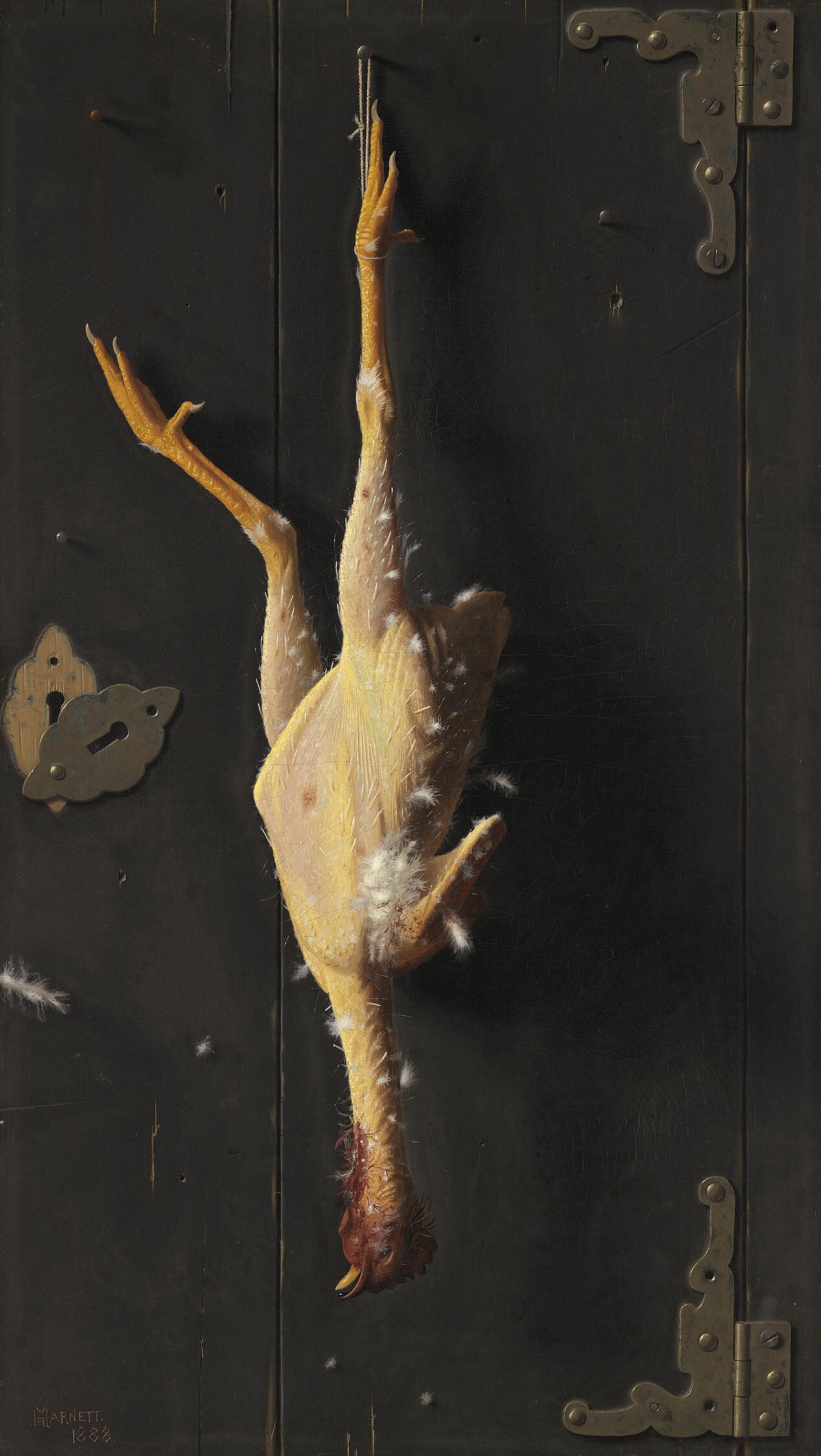
William Michael Harnett: For Sunday’s Dinner (1888)
"I said I thought I might be able to live there …"
Though I was raised in the fifties and sixties, I came of age without developing an appreciation for the modern American suburb. We lived in a turn-of-the-century castle, compared to the concrete slab construction passed off as Mid-Century Modern. I disliked the gently curving streets inevitably leading into cul-de-sacs in which those places tended to be built. The streets typically sported what I labeled Tourquise Names, with hyphenations stolen from far-away places, describing nothing similar to the local topography. Mar-a-Lago Lane overlooking high desert terrain. Their cookie-cutter sameness and visual blandness, with each place identical to its next-door neighbors, disturbed something wild within me. I'd always dreaded ending up in some Suburbia somewhere.
Exiles exist to expose us to our worst-case scenarios.
Weekly Writing Summary For The Week Ending 11/14/2024
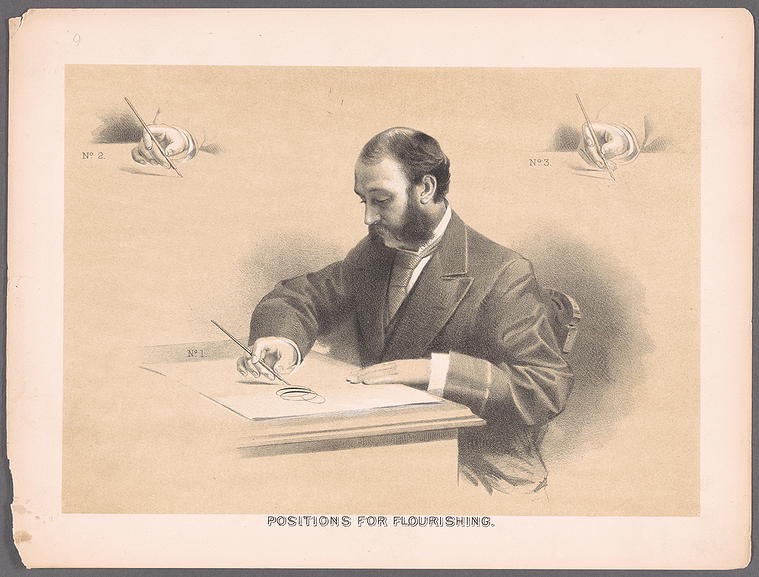
Archibald McLees, Engraver: New Spencerian compendium of penmanship, Part 2 (1879)
We Can Be Certain Now
When I began writing this series, I couldn't have known we would experience something like another Exile together when I was halfway through creating it. Exiles might be much more common than I had earlier appreciated. I had innocently figured that most people never experience that sort of trauma, and it was consequently a rare sort of event. I recognize familiar tells when surveying my friends and colleagues' reactions since the recent election. We're all Exiles now, seemingly kidnapped against our will and forced to cope with conditions we'd hoped we'd never have to face. Our faith has already been wounded, and we anticipate it will get worse, much worse. We're heartbroken, and we damned well should be. What's coming still seems utterly unnecessary. We seriously believed that we were better than this. It sure seemed like we used to be. These feelings provide the context within which Exiles have always existed. The sense of unfairness never completely relents. It would be unreasonable for me not to doubt my ability to cope with the upcoming insults. Must we exist on platitudes now? We were formerly engaged in serious business. We're forced to struggle to barely achieve survival, and even that's in question now. All Exiles start the same, with their end in question. Every Exile ends differently; of this, alone, We Can Be Certain Now.
VenueChange
She wrangled a transfer to her lab's home office in Colorado, where real estate seemed more affordable. Slip over here for more ...
Visitors

Isaac Israels: Two Donkeys (1897 - 1901)
Gallery Notes:
Scheveningen’s donkeys were not just entertainment for seaside visitors; Israels made grateful use of them in his paintings. He portrayed them a few times, either with children riding or a boy leading, or as here, waiting for the next ride. Their keeper lies in the foreground, on the sand.
"I remember we'd once been Exiled before our Visitors found us home."
Visitors transformed our Exile. On our first days there, two old friends just happened to be passing through the area to visit relatives, and we spent two days easing into that terribly unfamiliar place together. It seemed much less foreboding with them there to distract us into entertaining. Something about visitors brings the host out in us. We might not usually take ourselves out to dinner, but when we have Visitors, we're much more likely to consent to the splurge and even try to find the best. I become tour guide-y, even when I'm unfamiliar with the territory. I have an almost uncanny ability to find interesting places, and our Visitors almost always appreciate my efforts. We wouldn't have visited half the tourist traps in DC had Visitors' presence not quietly goaded us into agreeing to go.
The GrandOtter was our most frequent Visitor after we were Exiled.
Just_Visiting
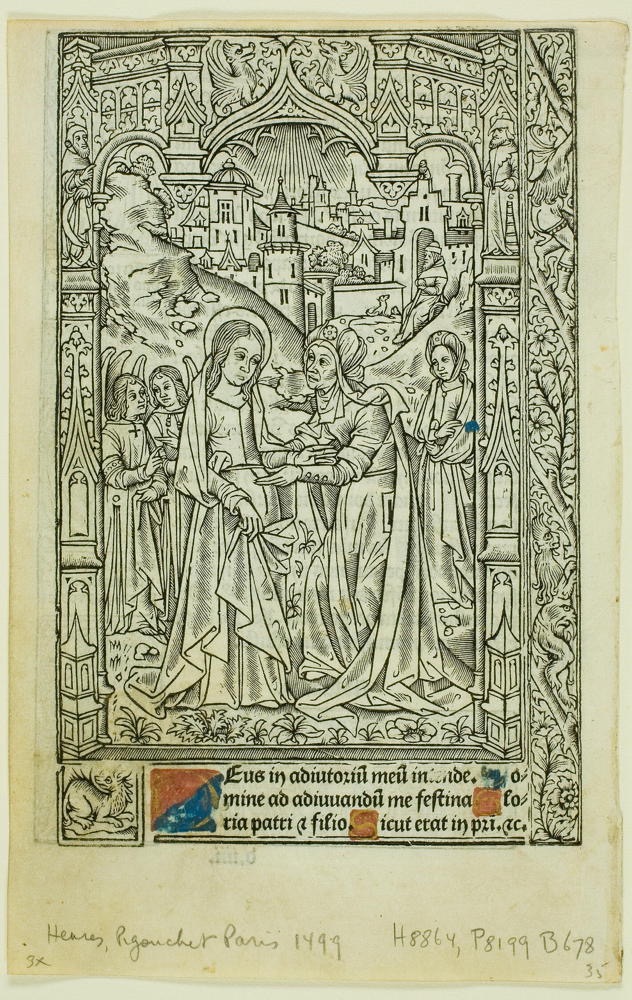
Philippe Pigouchet: Visitation, from Book of Hours (15th Century)
" Who would greet us when we returned?"
During Exile, The Muse and I were able to infrequently return to the scene of our banishment to visit family and friends. We learned early in our Exile that holidays were lousy times to visit since people already had their traditions, and the last thing they needed was some fifth-wheel visitors messing up their rhythms. Also, we ached to visit ordinary times rather than during celebrations when people might be on their best or worst behavior. The one visit we made over Christmas, early in our Exile, proved disastrous. We never attempted a repeat performance.
I usually managed to make it back for my grandson Roman's birthday, even though it was in February.
DaGoils
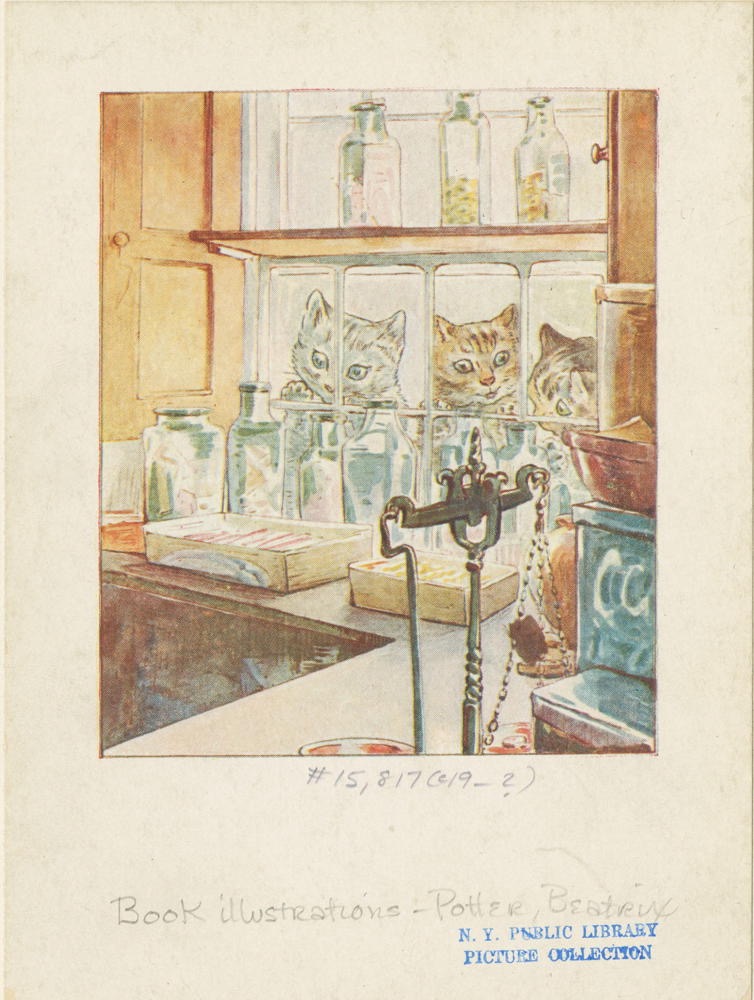
Beatrix Potter: Cats in the Window (1909)
" … those fading days may never go away."
Before I move these stories away from Takoma Park, I must recount one of the most fulfilling activities I engaged in there. Our Sherman Street neighbor and benefactor Clair had been involved with a group that cared for the town's many feral cat colonies. He recruited me to take a turn. Rather than try to domesticate these critters, these people trapped and neutered them, then returned them to the wild, returning daily to feed them forever. Each volunteer agreed to feed a certain number of cat colonies for specific days each week. I decided to service five drops, four days each week. I was responsible for buying and dropping the food off each designated day.
The colonies lived invisibly.
StatusQuoing
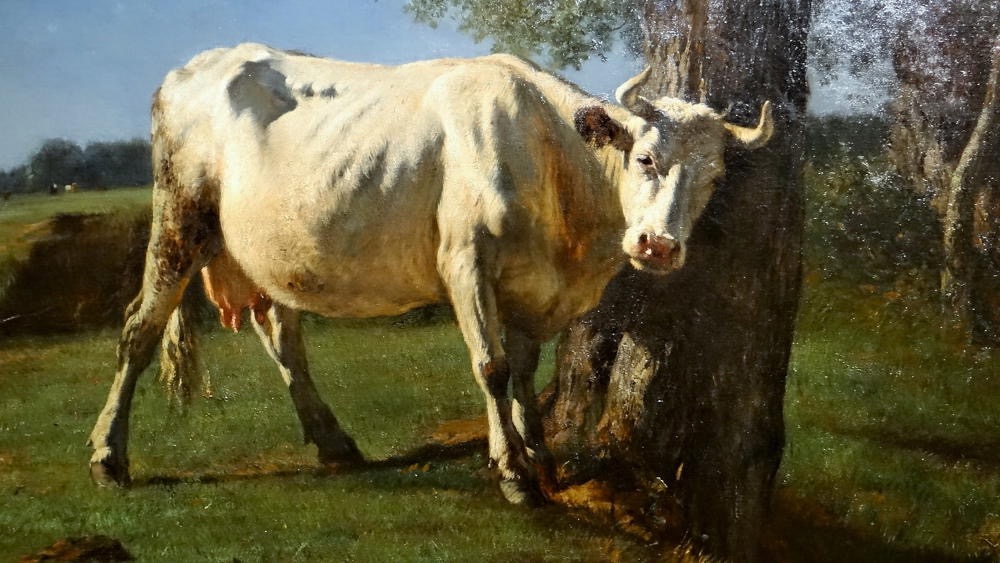
Constant Troyon:
Vache qui se gratte [Scratching Cow] (1858)
"I knew most people only in passing."
Eventually, that second Exile settled into the very soul of domestic tranquility. The Muse's early struggles to adapt to her job's politics settled into her widely acknowledged mastery of that context. She held a job that made a difference and was held in high esteem by her colleagues. I, too, had found a level. The yard in Willow Street offered me opportunities to tend a garden and mow a lawn. That house could have been more reliable. The HVAC repair man and I were on a first-name basis. He confided that the owner had installed the air conditioners upside down and backward. The house was so big, and the climate was so fierce that two air conditioning systems were stacked into the attic. The heating system, too, exhibited problems. We returned from a visit home to learn that the young woman we'd hired to tend cats and plants hadn't noticed that the furnace had failed. We lost about half the house plants, and the basement filled with millipedes. Millions of them. That took some serious cleaning up.
That landlord had hired a management company to watch over his home while it was rented out.
Preservation
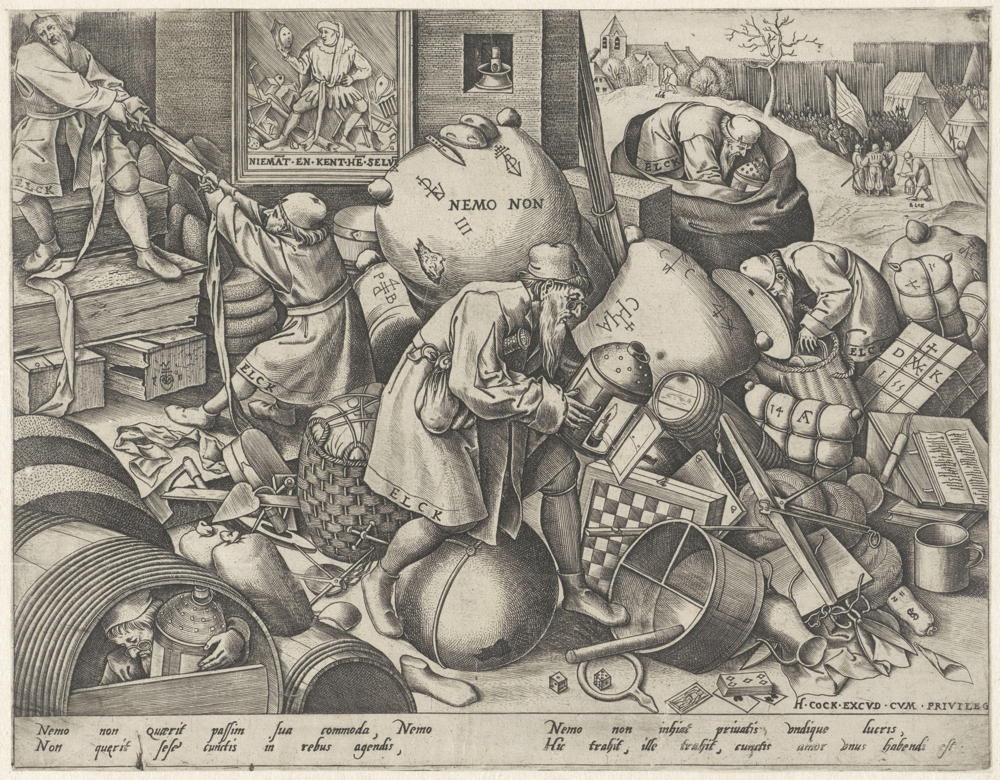
Pieter van der Heyden after Pieter Bruegel: Everyman (1556 - 1560)
Gallery Notes: The bearded figure with the lantern represents Everyman during his lifelong search. The legend explains, ‘Everyone searches for himself in various things, all over the world. How can anyone then get lost, when one is always looking for oneself? However, no one knows himself, … Whoever understands this has insight into a great miracle’.
"We live lives of ritual and habit …"
Pieter van der Heyden after Pieter Bruegel: Everyman (1556 - 1560)
Gallery Notes: The bearded figure with the lantern represents Everyman during his lifelong search. The legend explains, ‘Everyone searches for himself in various things, all over the world. How can anyone then get lost, when one is always looking for oneself? However, no one knows himself… Whoever understands this has insight into a great miracle’.
"We live lives of ritual and habit …"
Life continues in remarkably similar aspects even after being Exiled. Conservation and Preservation Laws applicable to physical systems also seem to apply when considering social ones. My rituals and familiar patterns continued trying to replicate themselves even once their originating contexts disappeared. Many attempts seemed absurd, though I rarely considered whether my intentions were reasonable. We were used to taking Sunday toodles when living in our small city, so we attempted to continue the ritual after moving into a big one. It might have taken us half the afternoon to get to what we might consider country, at which point we'd have to turn around to get back home by suppertime. We toodled anyway! In this and a thousand other ways, we preserved our rituals even into Exile.
Before, we'd home-can tomatoes every summer.
Weekly Writing Summary For The Week Ending 11/07/2024
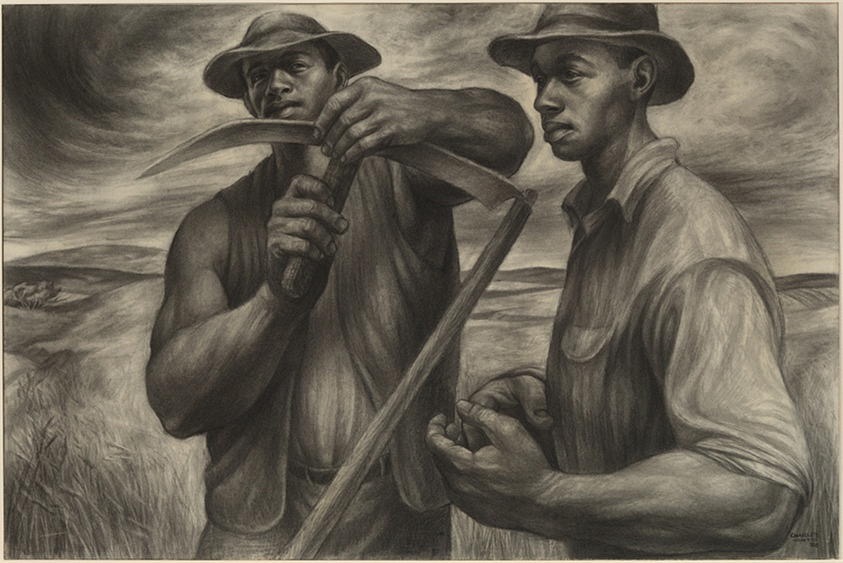
Charles White: Harvest Talk (1953)
Frequent readers might recall that The Muse and I started a project to remodel our front porch in the first week of August. We end the first week of November without a completed remodel, ultimately violating our original worst case by not completing it by Halloween. Halloween found me camped out in front of the blocked-off front porch steps to ensure no goblin fell into our porch deck frame's black hole. I’ve reset my original expectations a half dozen times since we started. Everything I knew about project work informs me that we're executing normally. No project was ever supposed to be completed on the initially expected schedule. Each rightly became an exercise in recovering from the shock and shame of turning out different than initially expected. Project Mastery, a subject in which I once taught well-respected workshops, was always about managing emerging expectations rather than ensuring the originals occurred. No force in the known universe could ever ensure satisfying original expectations and it's at best naive to presume that anyone in this generation could so succeed. No, we're born to experience serial failures and somehow manage to recover from them. The MAGAs will prove to have been every bit as cruel and unreasonable as we expected they would be, and we will prove to be worthy of unexpected opponents. Who will ultimately win depends upon whether one believes in an end to history. I suspect the people to whom I will become the 16th great-grandchild will still wrestle with the same dichotomies. Evil might be just as eternal as good. My job, and your job, must be to stand on the side of good, however seductive evil might seem this time. Thank you for following along!
Tourististan
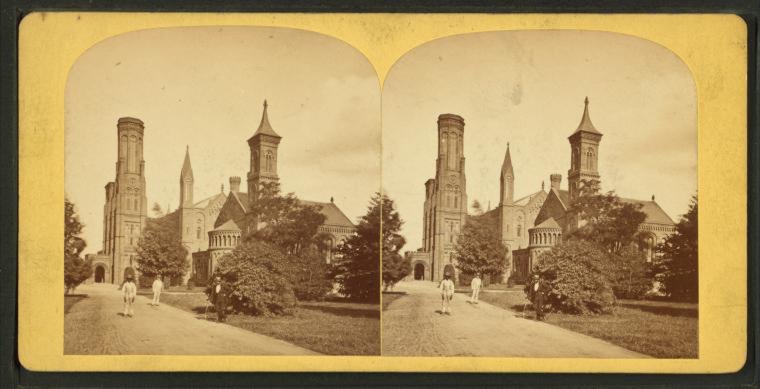
C. M. Bell: Smithsonian Institute.[still image Stereograph} (1870-79)
" … charge nothing for admission but leave a much more lasting impression."
Neither The Muse nor I had ever lived in such proximity to famous places until we were Exiled to our nation's capital. There, a National Mall holds a collection of monuments and museums that contain something akin to our national heritage. Millions of visitors travel long distances to visit these places. It's a tradition that if you're about to graduate from a high school located anywhere along the Eastern Seaboard, your class will travel by bus to what The Muse and I came to call Tourististan. On any odd summer afternoon, tour busses line The Mall from Fifteenth Street to the foot of Capitol Hill, idling, belching diesel smoke. They disgorge their passengers into swirling crowds of the usual suspects: boys showing off to imaginary girlfriends and preening teen females carrying identical non-functional purses. Add to the mix families pushing strollers filled with kids too young to appreciate anything they might witness. Welcome to Tourististan.
We gave The Mall wagon room and usually went out of our way to avoid the place.
Dislocated

7310 Willow Street, Takoma Park, MD (2012)
"Dislocations do not always prove to be as perilous as they seem."
Three years into our Exile, The Muse and I were Exiled again when our landlord informed us that he would sell the Sherman Street house. He and his wife were relocating back to the States from The Hague and needed the cash out of that house to buy themselves a place in Houston—no hard feelings, nothing personal. We would have put an offer on the place if we had been in any position to purchase it, but we were still recovering from our bankruptcy three years earlier and couldn't quite imagine floating the deal. We'd been juggling finances since we began our Exile. The Muse had contracted with a couple to make a down payment on a rent-to-own arrangement that gave us some cushion, but that deal had fallen apart after less than a year. Those renters had left the place worse for their wear. The Muse's son agreed to move in and help recover from the damage for reduced rent, so we'd been paying premium rent in Takoma Park and subsidizing our original mortgage back home.
The last thing either of us wanted was to go out searching for another place to live.
Self-Determination
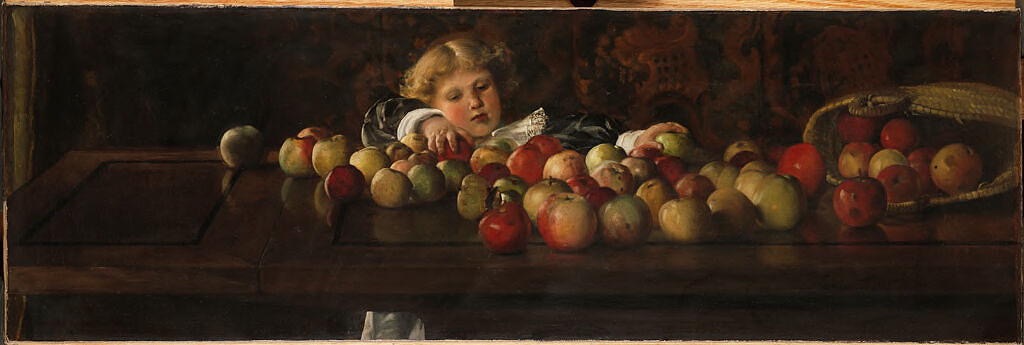
Laura Theresa Alma-Tadema: Self-Help (c. 1885)
"When I could no longer believe in who I might become …"
Besides laying open the myth that I could return home for Christmas, my Exile also displaced my inherited faith in the great American Self-Determination Myth. Most Americans of my generation were taught that we could accomplish anything we put our minds to and that any of us could grow up to become President. This might have been an odd offshoot of Jefferson's assertion that all men are created equal, a helpful fiction not necessarily intended to have been interpreted literally. Anyway, like almost everybody, I came of age believing my lot in life, if not at that moment improving, was definitely, if invisibly, trending better. Sure, my current trajectory might seem unpromising, but the magic of Self-Determinism would shortly muster a miracle. I just needed to contribute faith, patience, and persistence.
The thing about belief was always that it conveniently becomes self-sealing.
AwayForHolidays
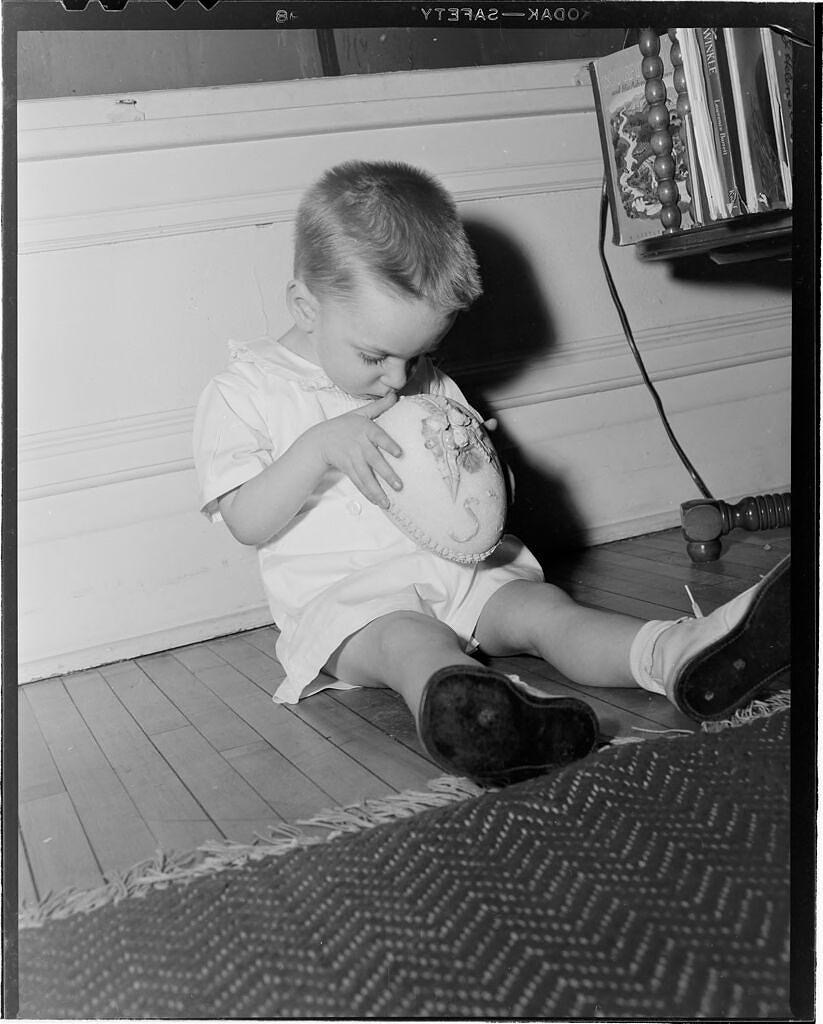
Lucian and Mary Brown: Untitled [boy with Easter egg] (c. 1950)
" … celebrations exclusively reserved for nuclear families …"
A myth promotes the idea that anyone far away might successfully return home for holidays. I'd attempted to accomplish this end for most of my adult life before being Exiled. Once Exiled, the underlying truth finally sunk in. Before Exile, I grew up and moved away, dutifully returning almost every Christmas and many Thanksgiving holidays. I considered these excursions high points. I'd reclaim my childhood bedroom and introduce my kids to country Christmas traditions, though I might have noticed I no longer belonged there. It had not been my home for years, and my annual return was more nostalgic than substantial. I'd forgotten how to appropriately dress there, and my interests seemed more distant from theirs every year. I sincerely wanted to be everybody's favorite uncle, but nobody ever gets to be an absentee anything. You're either there or not; if you're not almost always there, you've already gone, your annual appearance more ghostly than actual.
Exiled to the odd other coast, returning home for Christmas was mostly out of the question.
PoliticalExile
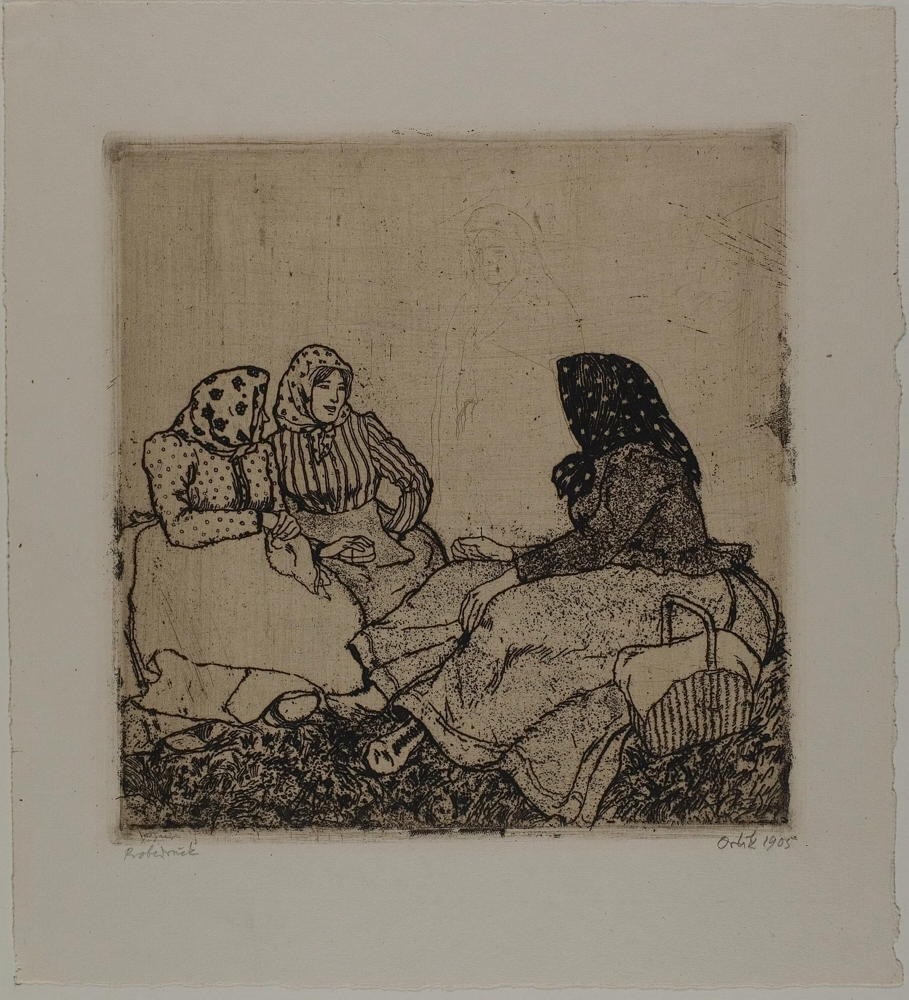
Emil Orlik: Three Women 1905
" … a much broader connection than I ever could have discovered had I just stayed home."
Our Exile was as much a political act as it was social. Our business went bankrupt in no small part due to the corrupt practices of the George W. Bush administration. The mortgage bubble his supply-sided economic policies promoted ultimately brought down the economy on our shoulders. He'd been doing damage to the high-tech industries our consulting firm relied upon since the very beginning of his very first term. His hasty invasion of Afghanistan, followed by his foolish incursion into Iraq on blatantly false premises, had amplified uncertainty, which is one thing every economy fears. The oughts were fraught with stupid political turbulence. We fled into Exile and the welcoming, reassuring arms of the first term of the Obama administration. Washington, DC, in those days, was a palpably hopeful place. Obama had made viable a hope many had not dared to dream. We relocated to a place very near the center of that renewed enthusiasm.
We had been politically active before being Exiled.
TheInvisibleHusband
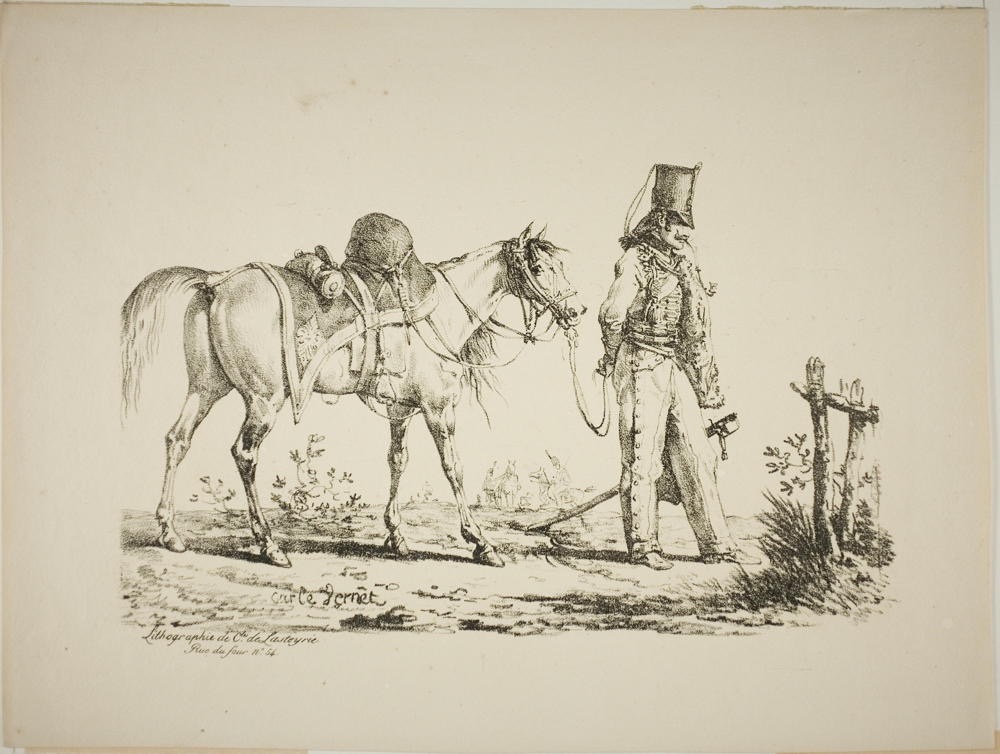
Carle Vernet: Hussard Walking in Front of his Horse,
Smoking a Pipe (February 8, 1817)
" … one impossible plan."
It might be true that every Exile serves their time alone. Certainly, The Muse's Exile seemed very different than mine. She would disappear into the Takoma Park Metro Station every morning and return every evening, off to engage in meaningful work and petty politics. She was an increasingly significant presence in her workplace, expanding her role from its initially forgettable status into something with genuine if informal, influence. She was becoming something. I was the one who ensured she got up on time and would often give her a ride to the station. In the six years we lived in Takoma Park, she drove the car to work three times. I regulated her departures and arrivals. Having supper ready when she returned became my primary occupation.
I had rarely had so much alone time.
Weekly Writing Summary For The Week Ending 10/31/2024
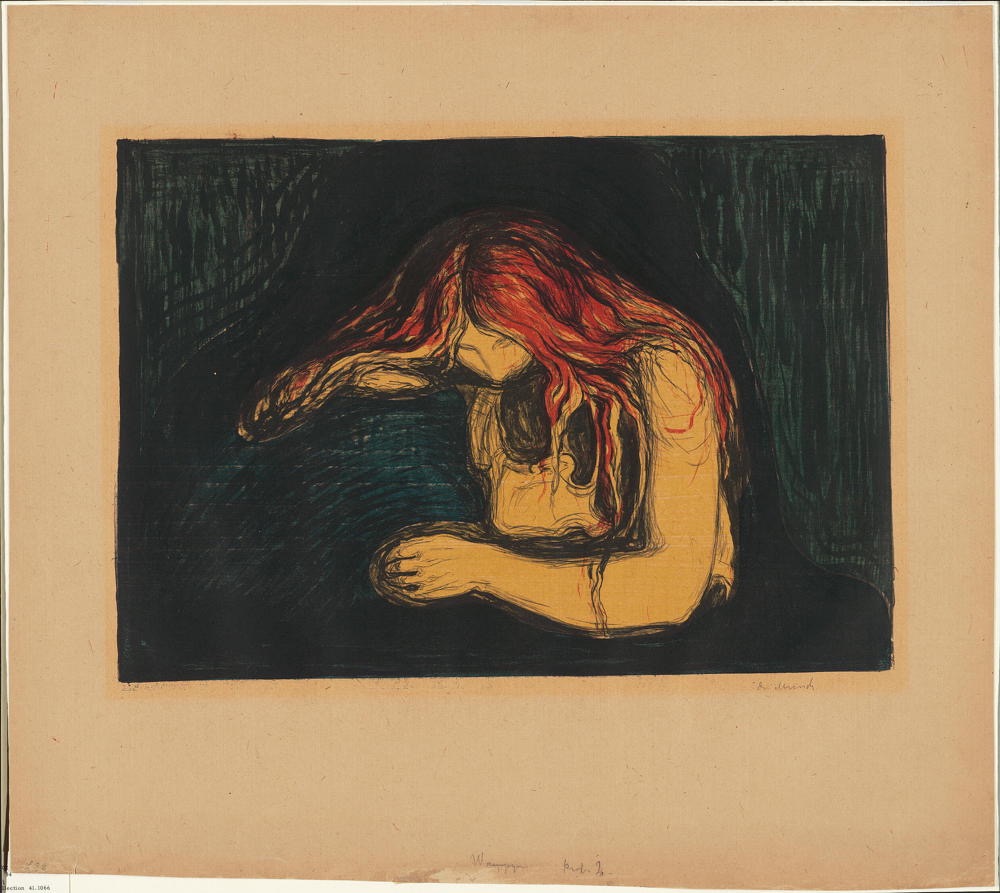
Edvard Munch: The Vampire II (1895/1902)
We're Not Going Backward
I have avoided making overt political statements in my stories, and not only because politics tend to render stories less timeless. For instance, I did not write a January 6, 2020 story, though I've never tried to hide my affiliations. Like you, I have always believed Trump was a dumpster fire. He represented what was always reprehensible about Americans stretching back before and including Andrew Jackson’s champions, which included some of my forebears. I might be remiss if I missed this opportunity to acknowledge at least that these Exiled Stories, as well as the preceding Grace and Fambly stories, were all created beneath a pall of the possibility that old Mr. Corruption might get reelected. Now, five days before the election, his reelection seems even more impossible than it appeared eight years ago when we were all blindsided by the most catastrophic election returns in the country's history. Trump didn't disappoint my expectations for an instant of his term. He proved inept and incapable, the very soul of terrible. He's only gotten worse since.
But I come here to praise Harris, not to recount Trump's many shortcomings. If he didn't have shortfalls, he wouldn’t have any falls at all, for he's a singularly unimpressive person, a failure by almost every measure; even his purported wealth appears to have been phony. He still owes money to every venue he rented for his 2020 campaign. This campaign only made that debt worse.
Harris has already accomplished what so recently seemed impossible. She's managed in a few scant months to remind us who we were and who we might become again. The seething foreground her opponent foments was never once a threat unless, and of course, we took that noise seriously. She didn't and hasn't, and in the process of taking her opponent unseriously, she's reminded me of who I intended to be. I had been afraid and needed reassurance. I believe we all needed to see a slim woman stand up to that shameful fatcat and his minions as if they couldn't ever lay a hand on her. They haven't. They couldn't. They can't. They will continue to ineffectively rant, but we're well on to their con.
I feel courageous now, American rather than cowardly courageous, the kind that proudly hails instead of disgracing itself. Harris did the impossible. She reignited a flame that most commentators had insisted might never burn again. I could not have been more delighted to vote for Harris and Walz. I have avoided engaging in the traditional catastrophizing Democrats always engage in every four years. I have at times pretended to feel confident that the American character remained intact, that it had only been napping and would be ready to engage again once awakened. I'm awake now that we're not going backward but forward again. Finally!
Reading

Anonymous: A Man Reading (c. 1660)
"I gratefully retained little but the memory of the pleasure I derived when Reading to survive my exile."
However hostile and unwelcoming DC initially seemed, its libraries warmly embraced me. From the Arlington County library in Ballston, Virginia, and on to Takoma Park's little city library and Montgomery County, Maryland's Silver Spring branch, I found warm refuge within each. I rushed to the Ballston Branch to find a remarkably bright and well-appointed space when we were still in temporary housing. I marveled at the selections and immediately chose two books that would profoundly influence me and my upcoming transition. James Carse's The Religious Case Against Belief and James Hoopes' False Prophets: The Gurus Who Created Modern Management and Why Their Ideas Are Bad for Business Today. Carse's book reminded me that the purpose of inquiry might never be to find an answer but perhaps to more deeply appreciate the questions. Hoopes' book read like I had written it and reassured me that maybe I wasn't as crazy as I sometimes felt. I also found some CDs by Acoustic Academy. These became the soundtrack for my upcoming successful house search. I devoured those books before rushing back for more.
Those libraries and, more importantly, their books became my refuge while I was Exiled.
Carole
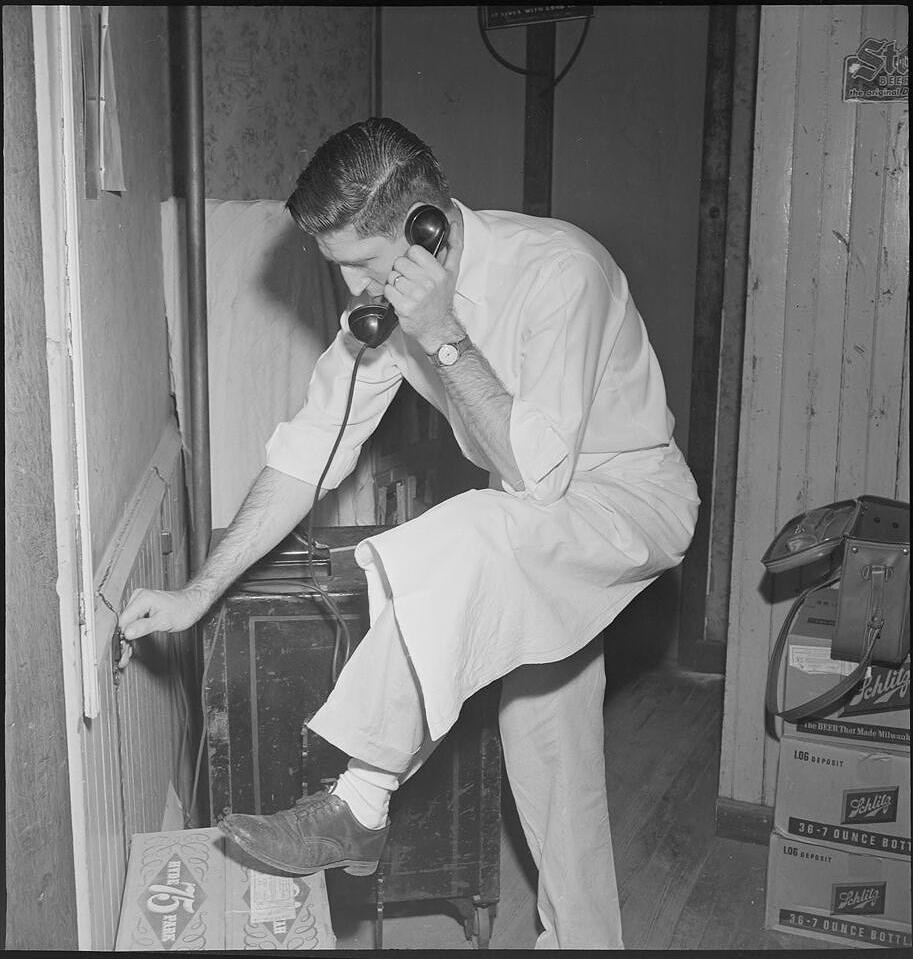
Jack Gould: Untitled (man talking on telephone, looking down) (c. 1950)
"She was my guardian angel …"
Joinings and ChanceEncounters aside, I felt intensely lonely after we were Exiled. I became a resident alien who would never feel entirely at home in my indentured homeland. I'd lost more than my home. My career had imploded with the bankruptcy. I lost my business partner, who had necessarily moved on and into another career so that we might survive. I proved less adaptable. The Republicans had left the economy in another tailspin again, and jobs were scarce, but even if jobs had not been thin, I was uncertain if I would ever prove to be employable again. The segment of society I'd successfully serviced seemed to have evaporated, and I felt every bit the old dog considering new tricks. I had not just been Exiled but obsoleted. None of my formerly familiar employments seemed available. I felt cut loose and sinking.
My writing seemed like something I might successfully fall into again.
ChanceEncounters
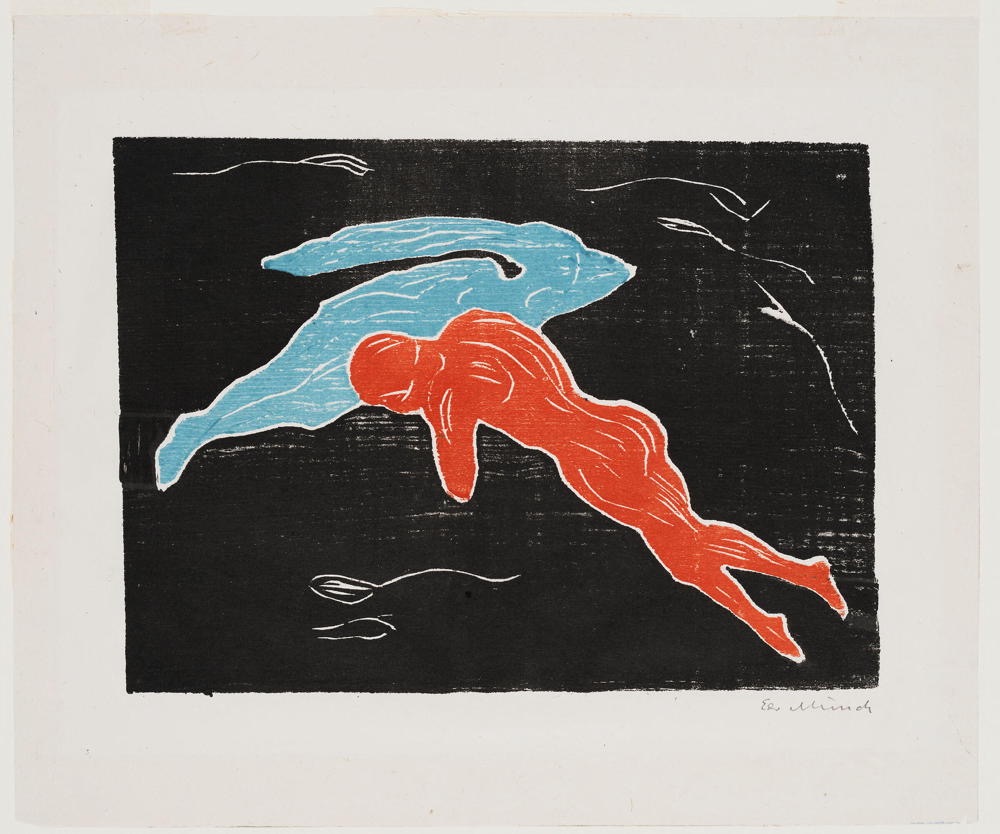
Edvard Munch: Encounter in Space
Original Language Title: Møte i verdensrommet
Original Language Title: Begegnung im Weltall
Former Title: Meeting in Space
(1898-1899)
"It’s the purpose to which we are blind that determines what we’ll leave behind."
Meeting Mitzi during that GWU lecture series was just one of the consequential ChanceEncounters I experienced while Exiled. It seemed as though one of the purposes of being Exiled was to stir up the old routine to increase the likelihood of ChanceEncounters occurring. I've long considered them just the sort of magic this world relies upon, for formal channels seem far too narrow to produce sufficiently substantial connections. However much the matchmakers might insist on the importance of formal introductions, informal ones most often suffice. Of course, they lack the sense that anything of substance might be brewing.` They're notoriously easy to miss, even if one's paying close attention. I suspect that a certain inconvenience improves these outcomes. They happen through a fog of annoyance. They happen to us. How fortunate for us and the world when we notice.
The Muse was never fully satisfied that I had not become a hermit while we were Exiled.
Cadencing
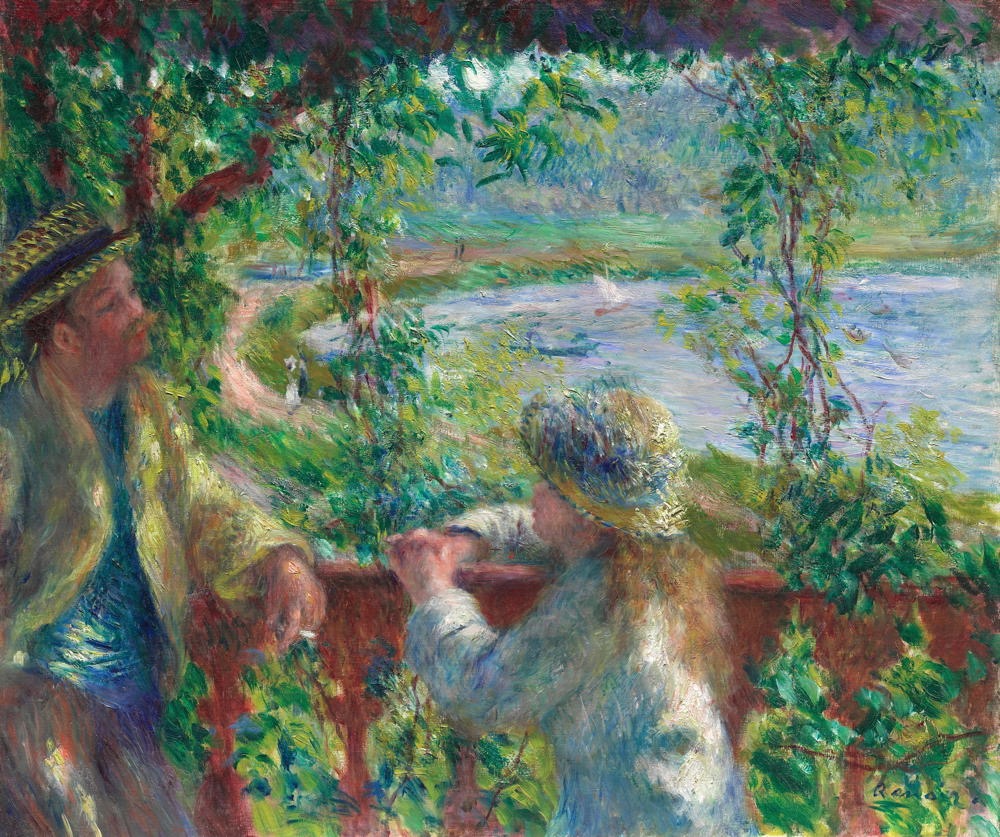
Pierre-Auguste Renoir: Near the Lake (1879/80)
"Better if it stays a mystery …"
As unlikely as it had seemed when we moved in the first of July, a rough rhythm had begun emerging from our SettlingIn by August. The GrandOtter was visiting, as she had back home in summer's past, encouraging a sense of continuity. Sure, we were still almost entirely unfamiliar with the territory we'd inhabited. Still, with remarkably few repetitions, the sense of surreal novelty began dissipating, with a false sense of familiarity replacing it. We were still strangers enough to believe we'd mastered what we couldn't comprehend, but a routine emerged. We knew where to go to find gelato, which provided ample encouragement that we were at least secure.
While we were still in our temporary housing, when we were still searching for a place to live, my publisher sponsored a book marketing seminar I attended.
Joinings
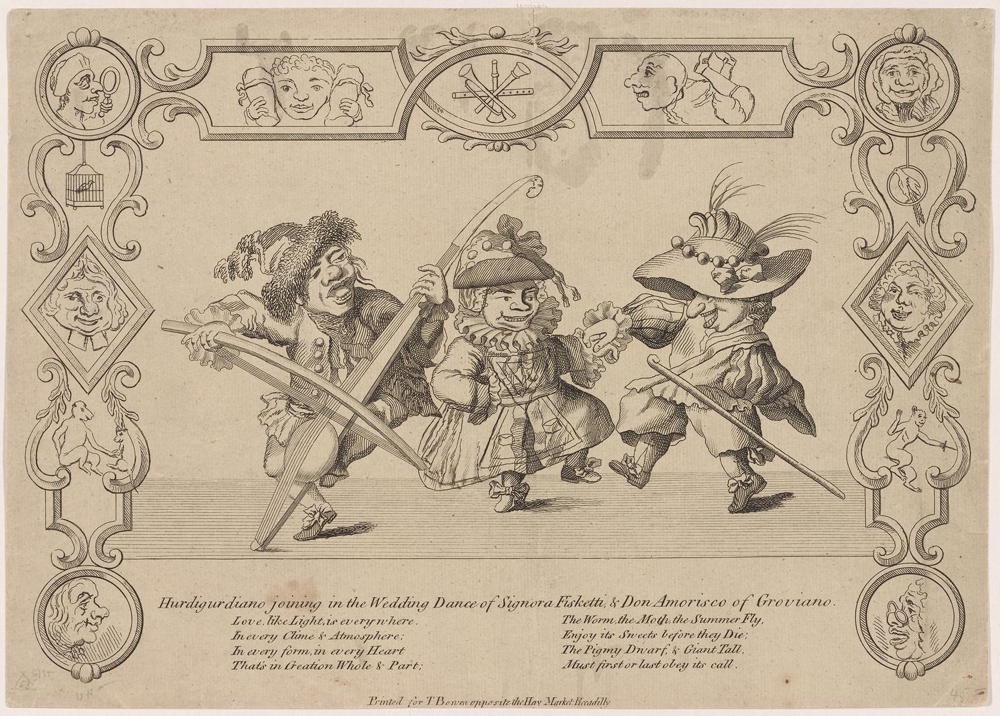
Unknown Artist: Hurdigurdiano joining in the wedding dance of Signora Fisketti (19th Century)
" … a heretical thought for this formerly heartbroken Exile."
Unknown Artist: Hurdigurdiano joining in the wedding dance of Signora Fisketti (19th Century)
" … a heretical thought for this formerly heartbroken Exile."
I was never much of a joiner. The Muse belongs to a half-dozen societies and study groups. I stay at home to get supper ready for when she returns. If I had been a joiner, I might have found a church to join after we had been exiled. Takoma Park featured several fine churches to choose from, representing all the usual denominations, but I never learned how to select a denomination, and I remain uninterested in doctrine. I "joined" the Library of Congress. The Jefferson Building's Reading Room served as an ample cathedral for me. I could choose my own doctrine there from the most extensive collection of material ever assembled. I could access much of it, too, and even have books delivered to my study shelf. I'd hop the Metro or sometimes ride my bike down to that library, where I'd sit on a hardwood chair every bit as torturous as the worst Pilgrim or Quaker pew. I almost always felt saved when I stood up to leave at the end of the day.
The Muse was dissatisfied, though, with my general get-up-and-go.
Belonging

Cornelis Visscher (II): Abraham verlaat Haran
(Abraham leaves Haran], after Jacopo Bassano (1638 - 1702)
"I could not hope to thrive without holding some deep sense of Belonging …"
Being Exiled disrupted my sense of Belonging. I fled from a place I had been steeped in all my life to a place where I didn't know myself from Adam. So much of anyone's identity seems intrinsically tied to their place, their spot, that prolonged distance from there wears one down. The open-ended prospect of never returning should be more than merely disturbing; it should and did spark a genuine existential crisis for me because I'd lost the defining element of my identity. I could and did navigate our new world as if I were present, but I wasn't. I might have been somebody else, and I could not have told anyone who that somebody else might have been. I arrived and lived initially as a placeholder of myself, hollowed out and thin.
A concerted search for myself ensued and took several forms.
Weekly Writing Summary For The Week Ending 10/24/2024
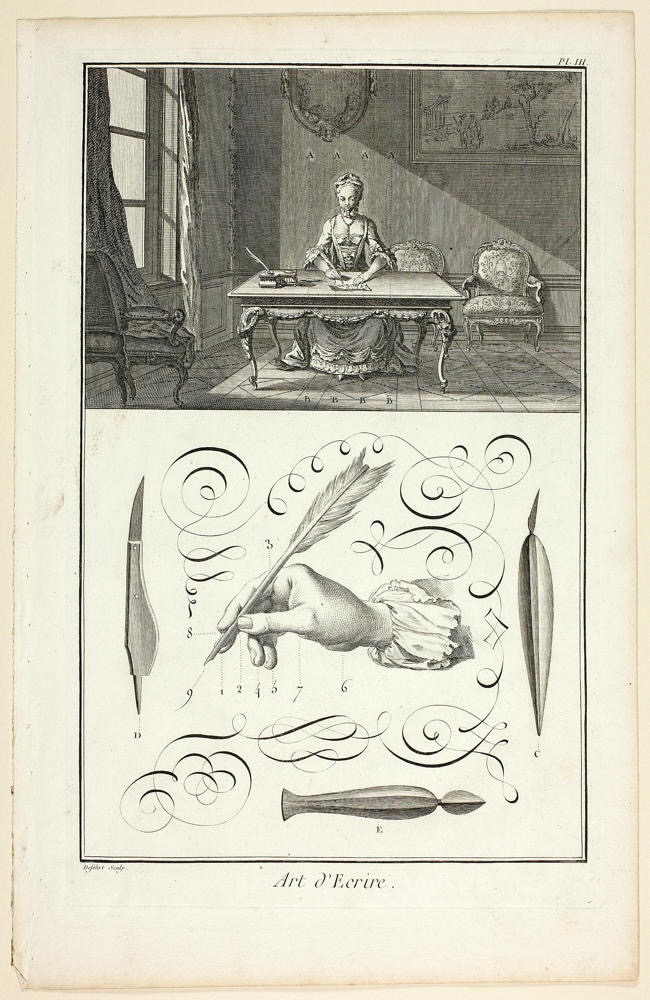
A. J. Defehrt: Art of Writing, from Encyclopédie (1760)
Memorable And Mild
Anticipating the season's first freeze has always signaled a frenetic response from me. Even when we were Exiled, I'd scurry around draining hoses and composting the contents of planters, maybe managing a final garden weeding before the pre-winter freeze settled in. I accomplish an easy dozen long-procrastinated chores that final afternoon. I even bring a few favorites inside, believing they might thrive, though they only sometimes manage to survive. The Muse complains that I bring in more white flies than begonias and geraniums. I have always been a soft-hearted gardener, hesitant to prune, so my garden becomes overgrown. I meticulously compost, though, and that last afternoon before the first freeze typically sees much material added to the composter. I'd bought some fresh composting worms and added them to my newly relined bins earlier in the week. I added the remaining rhubarb and that volunteer tomato that has seeded itself beneath the witch hazel bush with the contents of a half dozen petunia planters on top. When the frost coats the pile, the guts of that bin will be seething with enthusiasm. By Spring, I'll have a couple of cubic yards of the finest worm casings and a few hard husks and cobs of indigestible corn, marking the end of this year’s growing season. May the upcoming winter be memorable and mild!
Walking

Gesina ter Borch: Walking Skeleton (c. 1656)
"Better for me to maintain about the speed of a walking horse …"
Exile encouraged The Muse and I to engage in Walking. I believe it's true that urbanites walk more than their suburban or rural counterparts. The suburbs seem predicated upon automobile travel. One must hop in the car to go anywhere there. Even more so, our rural relatives, for everything there lies further than a short walk away. Our Takoma Park place was almost a mile from the Metro station, a comfortable twenty-minute walk. We soon considered it nothing to take that hike. Likewise, we could walk to the food co-op, the farmer's market, the local library and the video store, and even supper. Before we realized it, we had changed our lifestyle. Walking became an integral part of our Exiled days. The house was also within two blocks from about five different bus lines. It became more convenient to hop on the bus and walk than to find and pay for a place to park on the other side, so we walked. We became walkers.
In this respect, if few others, our lives in Exile were vastly improved over how they'd been before.
Credentials
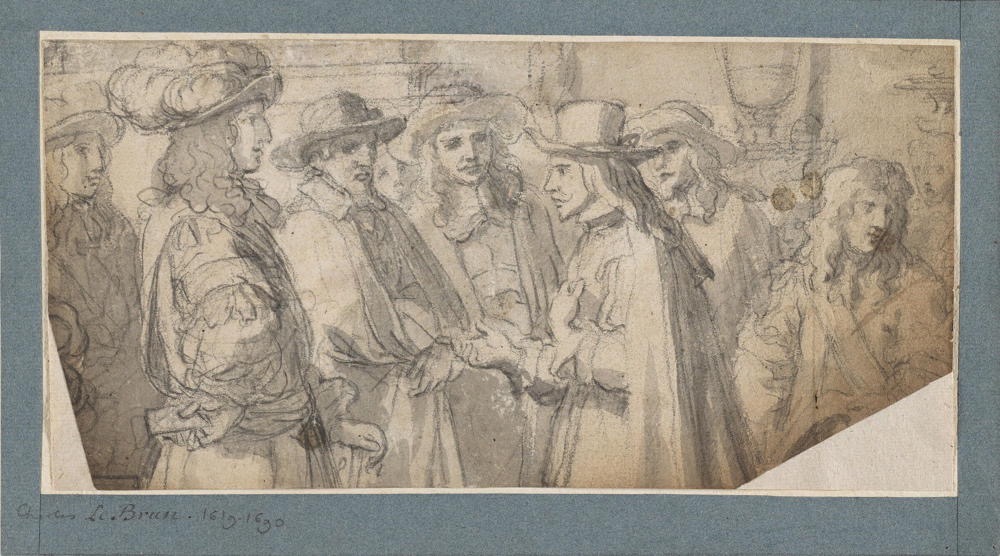
Charles Le Brun: King Louis XIV Receiving Ambassadors from the Court of Spain (c. 1674)
" … just another form of playing the same game …"
No other place in this country was ever even half as formal as Washington, DC. Everybody there seems to carry Credentials, usually on a lanyard around their neck. Those without that lanyard seem mysterious. Perhaps they're visitors? Maybe one of the rare private sector employees? Most work for our government and interact with material deemed secret from somebody. Every lobby features a security checkpoint requiring ID to pass. Office suites require a magnetic card or an escort to enter. Further, business casual has yet to arrive and might never arrive. The men wear suits and ties, and the women wear equally formal attire. Casual Fridays were never observed. People engage exclusively in serious business, much of it mandated by Congress.
The Muse received her credentials after undergoing a thorough FBI background check.
BigBox
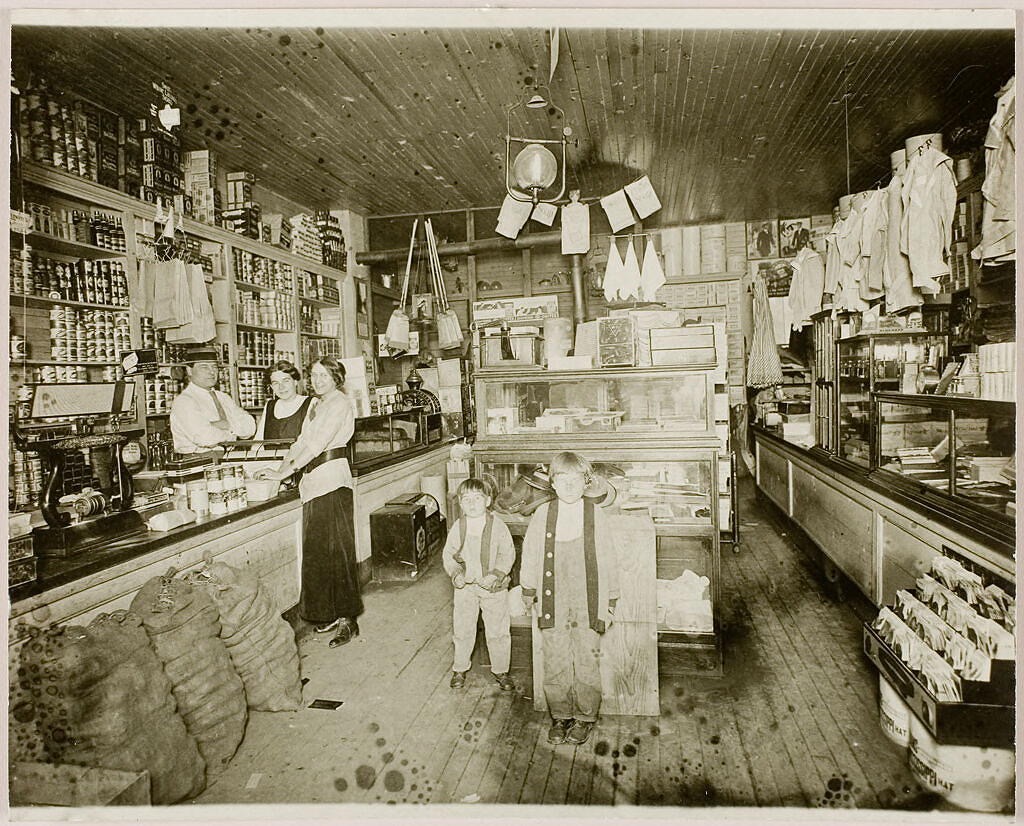
Ken Whitmire Associates:
Untitled [interior of a store] (c. 1940, restored 1970s)
"I preferred the neighborhood hardware store over the Home Despot …"
Shopping seemed less a necessity in DC than a pastime. Sundays, it seemed people flocked to shopping malls and Big Box Stores. Parking lots filled, and a seemingly sacred commerce commenced. Somebody would always be in the market for a mattress, so they were always on sale, never not! Families seemed to promenade around shopping centers as if on display themselves. Kiosks featuring the most curious businesses attracted what appeared to be primarily teenage girls. We would go when The Muse deemed necessary, for I would never even imagine going to such places unassisted. Truth told, I'd often cool my heels in the car instead of accompanying her inside, for those places always seemed so out of scale they terrified me. Further, our recent bankruptcy had left me with an aversion to buying stuff. I figured I could hold off buying things until they were really needed, and if my luck held, I'd never need to buy anything but groceries again.
Back home, we didn't have Big Box stores, so I never needed to learn how to navigate them.
EssentialErrors
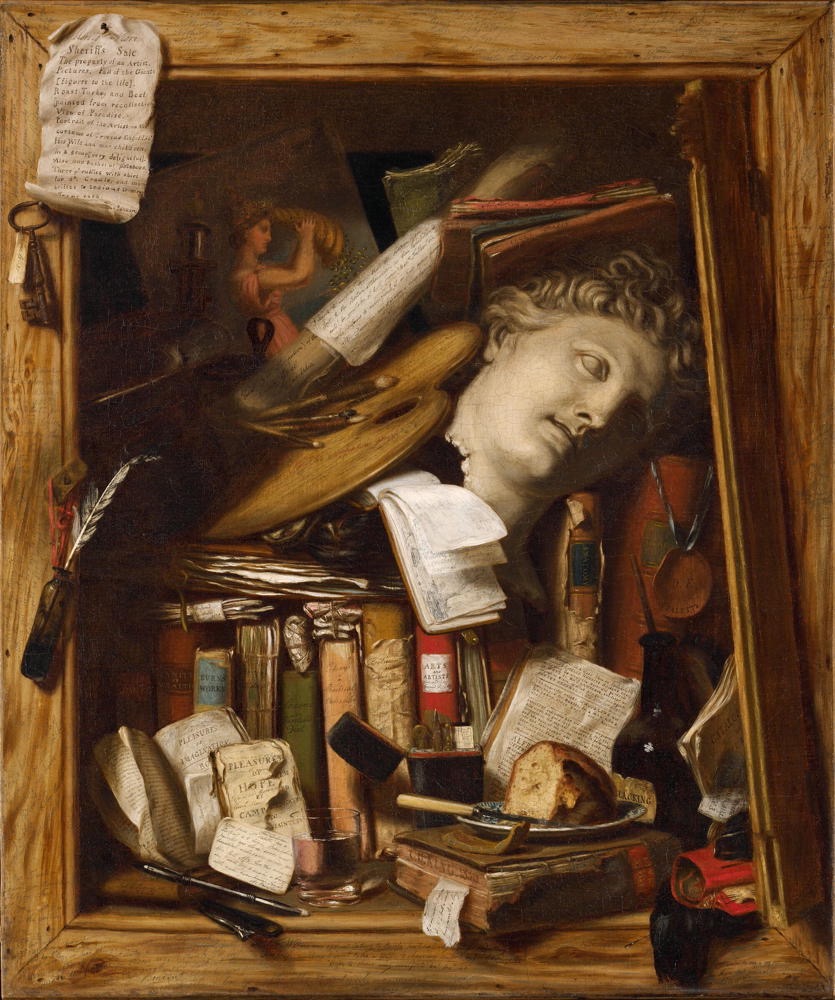
Charles Bird King:
The Vanity of the Artist's Dream (1830)
Former Title: The Anatomy of Art Appreciation
Former Title: Poor Artist's Study
Former Title: Still Life, The Vanity of An Artist's Dream
Gallery Text:
In this humorous still life, King pokes fun at popular taste and laments the plight of the arts in America. A masterful example of trompe l’oeil illusion, the painting depicts a cupboard filled with the possessions of an ambitious and well-educated but financially unsuccessful painter. Brushes, drafting tools, treatises on art, and a cast of the head of the Apollo Belvedere, the celebrated antique sculpture, are crammed in next to stacks of unpaid bills, letters from parsimonious patrons, and a “last prize” medal. Behind the loaf of bread, a fictitious news report complete with typographical errors ridicules the unsophisticated tastes of the era, and makes clear that America was a difficult place for painters like King who wanted to emulate the arts culture of Europe in the new republic: "The exhibition of a Cats Skin in Philadelphia produced TWELVE HUNDRED DOLLARS, totally eclipsing its rival the splendid portrait of [Benjamin] WEST by Sir T. LAWRENCE, the later we regret to state, did not produce enough to PAY ITS EXPENSES. OH’ ATHENS OF AMERICA. I, American (Newport, RI 1785 - 1862 Washington, DC)"
"I was usually successful when staying his hand!"
Being Exiled necessitated resolving many long-settled dilemmas. For instance, I'd encountered the necessity of finding a barber shortly after we moved into our temporary quarters. This might have once been a trivial challenge, but no longer. Now, the field seems crowded with pretenders, people who might hang their shingle without the first idea of how to barber. Some characterize themselves as "stylists," a meaningless term strongly suggesting someone who chose beauty college over learning the barbering trade. Stylists tend to call their shops "salons," as if to announce that they are different, hugging to the higher end of style and service when, in fact, they're mostly beauty parlor operators. According to some long-ago misplaced agreement, men were never supposed to break the sanctity of beauty parlors, and women were to respect the neutrality of barber shops. Greying this boundary has radicalized what was once a simple hygiene activity, turning it into a cultural statement accompanied by many seething resentments.
I'd maintained the same stylist in Portland for over a quarter century.
Stranger

Walter Crane: The strangers entertained (1910)
"Avoiding traffic became my occupation …"
I recently had a conversation with one of The Muse’s fellow Port Commissioners. He reported that he had been worrying about an impending move. He and his wife had bought a condo in town into which they would soon relocate. He explained that when he first married, he’d moved out of his parent’s place on the farm and into what had been his grandparent’s house next door. He’d lived there until ten years ago when he built his present house three miles from where he was raised. This condo would be the furthest he’d ever lived from his home place. It was ten miles away, in town. He said he’d never been away for longer than two weeks in his whole life, and he was wondering what might become of him if he couldn’t look up to see the familiar hills or predict the weather by checking what the clouds were doing. He seemed to have been scared of becoming a Stranger. I knew too well how he felt.
Once the movers left, I realized I could no longer consider myself a visitor.
MisRemembering
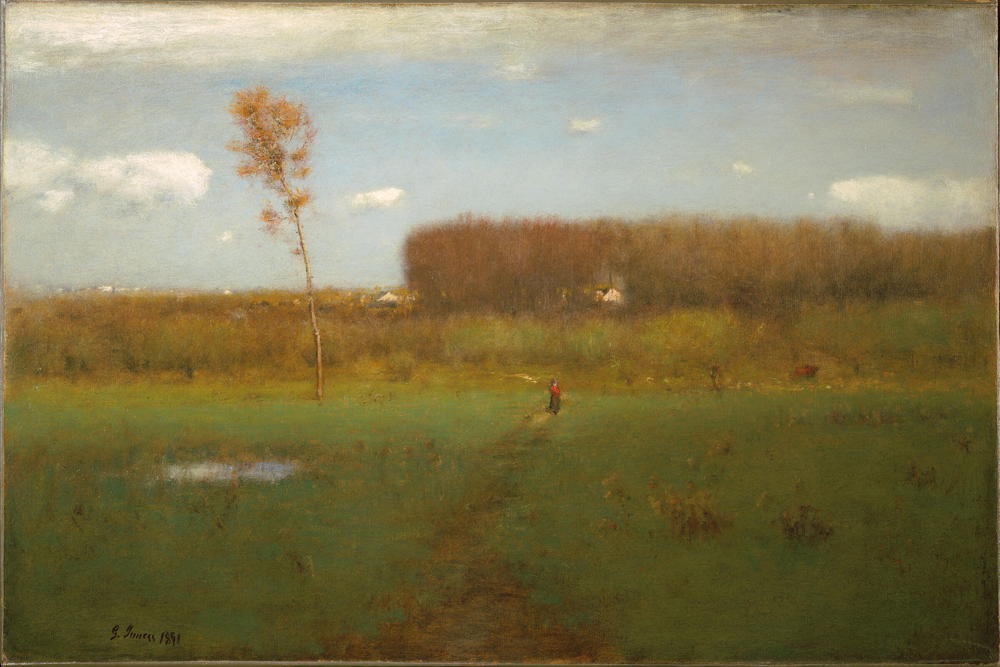
George Inness: October Noon (1891)
Gallery Text
Blurred, softly painted, and almost otherworldly, October Noon differs markedly from the realistic, crisply rendered American landscapes that hang nearby, such as Bierstadt’s magisterial view of the Rockies. Though Inness probably based this scene on the flat, marshy terrain near his New Jersey studio, his image retreats from hard facts and recognizable places to suggest a peaceful, imagined, or dimly remembered landscape. Formally evocative of work from the French Barbizon School, Inness’s quiet paintings found favor among New York patrons overwhelmed by the rumble of the new modern city. As one New York critic put it, “Now and then [Inness] has a picture of perfect peace. . . . It tranquilizes the soul even to look upon it.”
" … a heretic in Rome …"
Creating mémoire inevitably involves some MisRemembering. Dates, places, and sequences aren't always stored in recoverable order, and even short-term memory might prove unreliable. Still, it's a genuine shock whenever I discover that I've gone and done it again, presenting some fiction as representing what actually happened. The Muse usually serves up my undoing, for she has often been a witness or co-participant, and her memory might disagree with mine. Through such disassembly, the story might straighten, leaving me feeling at least temporarily crooked. But MisRemembering's no actual sin. It's more like a part of the price for engaging in remembering, with no way of escaping. The sin lies in the more deliberate DisRemembering, intentionally burnishing the facts, often to enhance the author's reputation. Every writer is probably capable of committing this sin. What matters might be how they respond to being outed.
I MisRemembered key elements of two recent stories, TheMove and SettlingIn.
Weekly Writing Summary For The Week Ending 10/17/2024
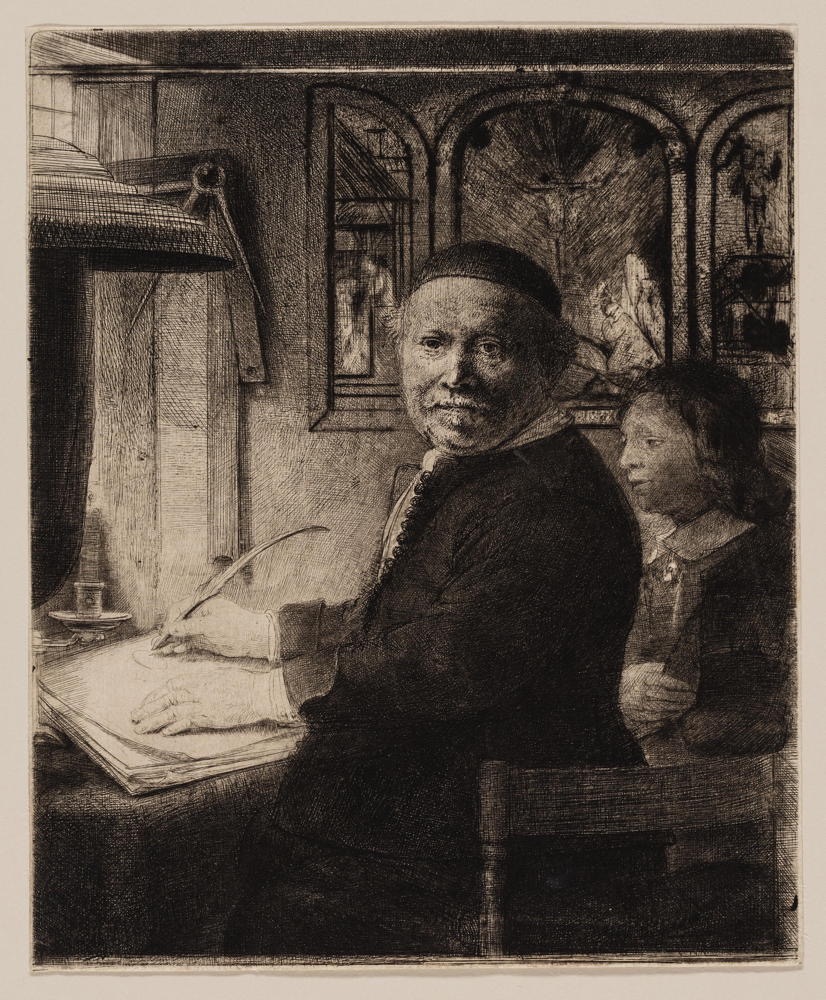
Rembrandt van Rijn: Lieven Willemsz van Coppenol,
Writing Master: The Smaller Plate (c. 1658)
Trading In Authentic Impressions
I feel grateful for my unreliable memory. The Muse corrects me at inconvenient times, often after any possibility of properly correcting the record exists. This frustrates me, but it's exasperation of my own making. I can always make amends or attempt to. Even an inadequate explanation might restore some lost credibility if only to reset my listeners’ expectations that I'm not the most reliable source. Gratefully, my stories don't have to be true to be useful. They might accurately represent my lasting impressions even if they materially misrepresent what happened. Time scales shift. Whatever happens becomes different if seen through any rearview mirror. I'm never entirely sure I'm present at any moment, anyway. I'm reasonably confident that I was effectively absent through the first few Exiled months and I still find reason, now that I've returned, to question just how present I ever become. I distract myself partly by reflecting and attempting to remember things. I cannot simultaneously be there and here, though I don't go anywhere different when I'm in reverie, writing. I shift my attention, which doesn't demand that I watch whatever's playing before my eyes. I remain grateful that I'm so easily distracted I possess the genuine superpower to doze off, particularly when in the middle of some traumatic experience, so I never accurately record what happens. I trade in authentic impressions that might or might not necessarily strongly correlate with what actually happened.
Settling_In
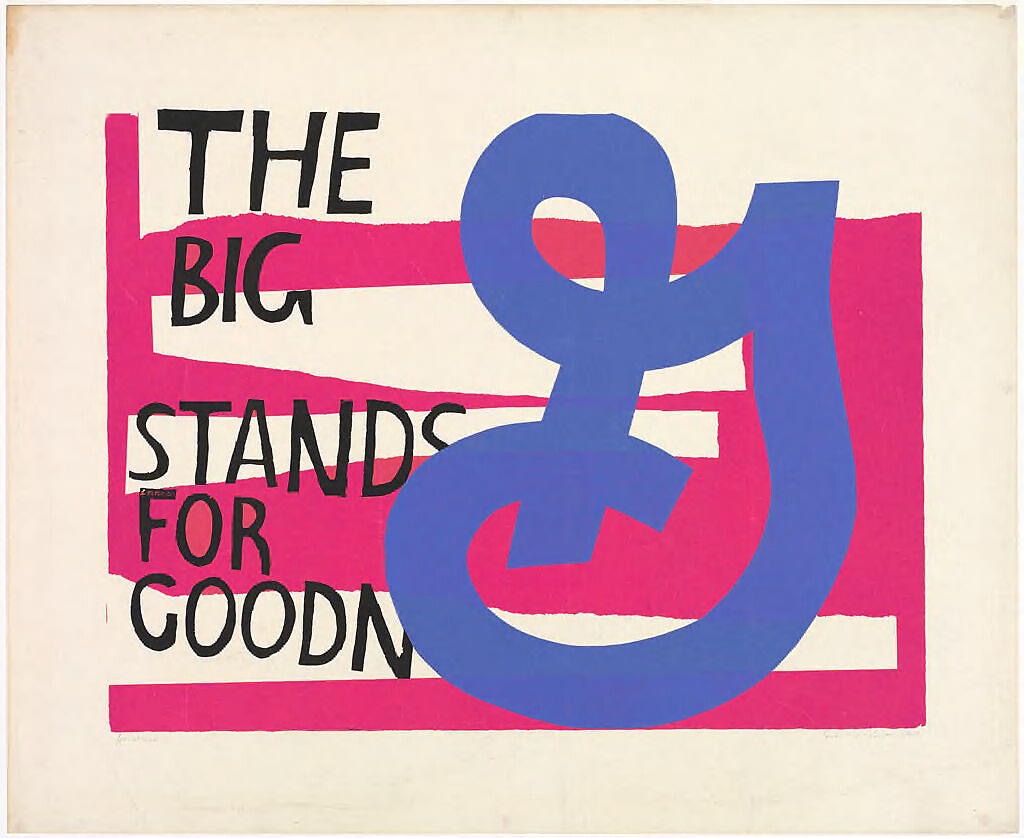
Corita Kent (Sister Mary Corita): for eleanor (1964)
Inscriptions and Marks Signed: l.r.: Sister Mary Corita IHM
(not assigned): Printed text reads: THE BIG G STANDS FOR GOODN[ESS] / 4 Eleanor
" … we could read their deep disappointment at what their future had wrought."
When I was little, on Christmas morning, my siblings and I would sometimes rewrap already-opened presents so we could open them again. July 2, 2009, brought that feeling back into focus for me. After more than three dog months living without our stuff—that having been boxed up, carted off, and stored somewhere until we found a place to live—opening those boxes felt like a ginned-up Christmas. The Muse was overjoyed to be reconnected to her extensive dish collection. That house was the only one we considered that came even close to having enough kitchen cupboard space to contain it. We parked our china cabinet along the one blank kitchen wall to hold the display items.
My office space, a narrow windowed room off the dining room, seemed perfectly dimensioned for my purpose.
TheMove
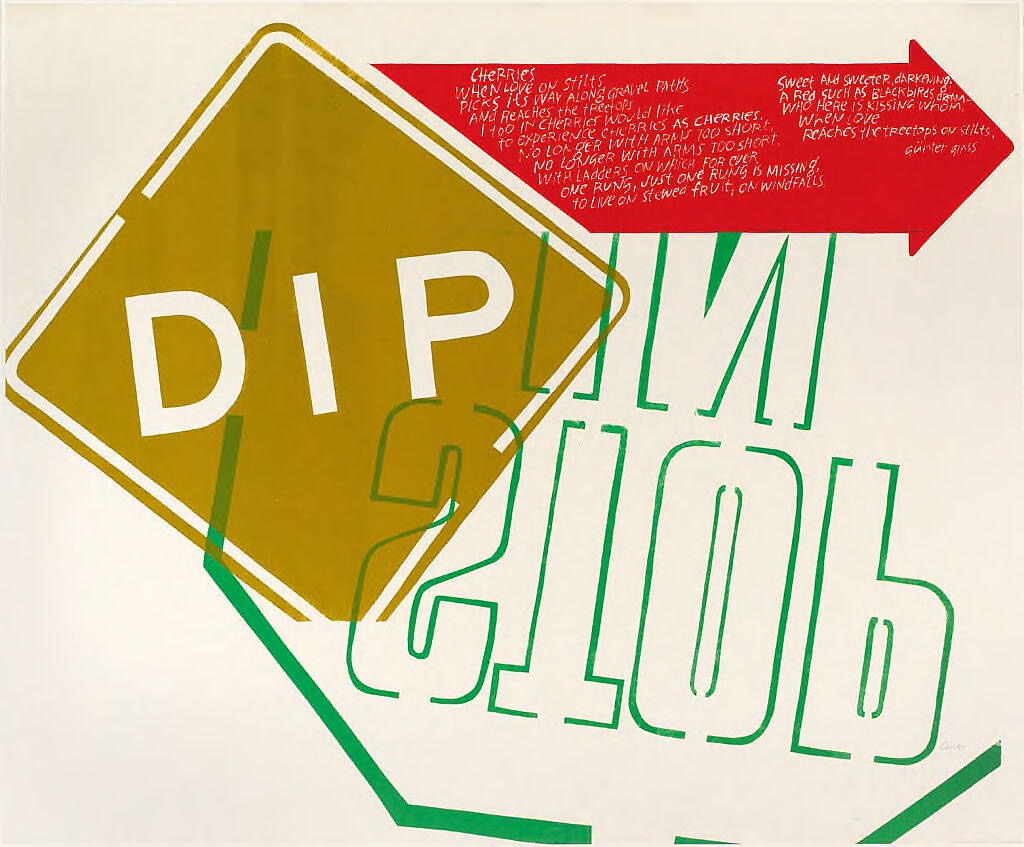
Corita Kent (Sister Mary Corita): dip (1967)
Inscriptions and Marks: Signed: l.r.: Corita
(not assigned): Printed text reads: DIP / IN STOP / Cherries when love on stilts picks its way along gravel paths and reaches the treetops I too in cherries would like to experience cherries as cherries. No longer with arms too short, no longer with arms too short, with ladders on which for ever one rung, just one rung is missing, to live on stewed fruit, on windfalls. Sweet and sweeter, darkening; A red such a blackbirds dream-who here is kissing whom, when love reaches treetops on stilts. Günter Grass
"We would be months getting accustomed to Tacky Park …"
July 1, 2009, would be warm and sticky, hanging in the high seventies into the low eighties. In the unaccustomed humidity, it certainly seemed much warmer to The Muse and I with The GrandOtter beside us, as we packed up our few belongings and the cats and left the temporary housing high-rise for the last time. We were unaccustomed to the drive to the other side of The District, for Rosslyn was just over the Southern border and Takoma Park, hard on the Northeastern edge, eleven miles and nearly an hour's drive. We were to meet up with the movers at the Sherman Street house. This was the day we would finally move in; TheMove was at hand. We'd left home three full months before and overstayed our temporary housing welcome by a month, but we were finally going to land somewhere.
As it does in summer back there, the world smelled musty and damp. I'd already sweated through my clothes by the time we arrived.
Finders
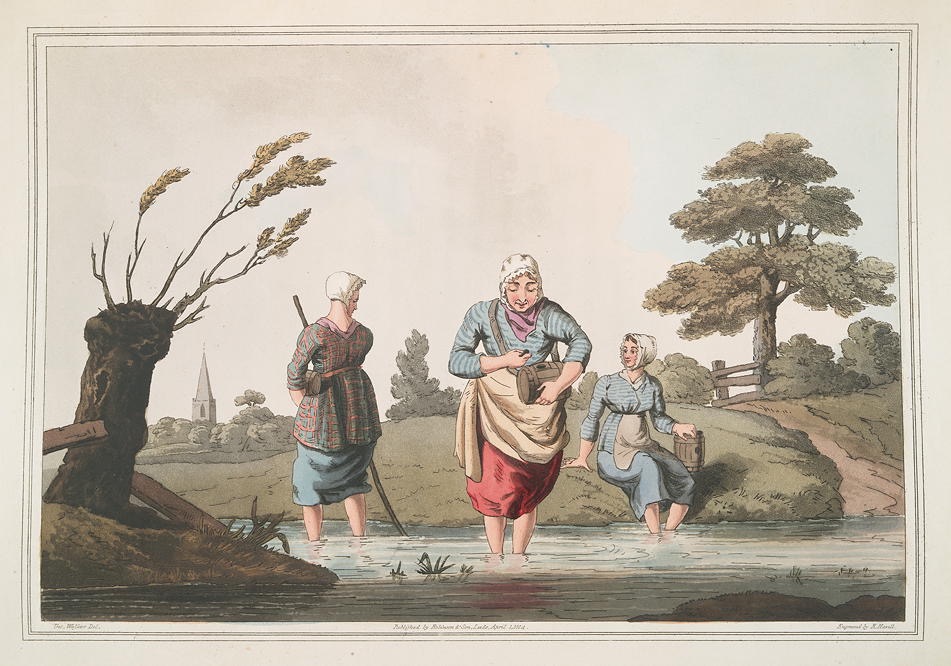
George Walker: Leech finders, Plate 35 (1814)
Engraver: R. & D. Havell
"We mostly avoided going that way."
The transition from seekers to Finders felt abrupt. After weeks of fruitless seeking, we became Finders one early Sunday morning in May. We had almost overstayed our welcome in our temporary housing, for our search had apparently been unusually fruitless. The Muse pleaded for an extension, which was granted, but we were already more than ready to regain access to our stuff and move out of that high-rise. We had taken to cruising our chosen destination on weekends. The Muse with her Blackberry at the ready, refreshing CraigsList postings, so we were around the corner when our new home's listing first appeared. We were there in seconds. The owners had recruited the neighbor to show the place. They'd relocated to The Hague for the wife's job. The neighbor and I turned out to be brothers from different mothers. We instantly hit it off, and he became our champion. We learned later that he called the owners when we left to tell them that the right tenant had just left. He implored them to say "Yes," that they wouldn't ever be sorry for a second. They weren't.
A financial and credential check was still required.
North

Corita Kent (Sister Mary Corita): right (1967)
Inscriptions and Marks — Signed: l.r.: Corita
(not assigned): Printed text reads: [W]RON[G] WAY / Prophets of boom / and if only we arrange our life according to that principle which counsels us that we must always hold to the difficult, then that which now seems to us the most alien will become what we most trust and find most faithful. How should we be able to forget those ancient myths that are at the beginning of all peoples, the myths about dragons that at the last moment turn into princesses; perhaps all the dragons of our lives are princesses who are only waiting to see us once beautiful and brave. Perhaps everything terrible is in its deepest being something that wants help from us. Rilke
" … With our attention finally properly focused …"
To move to Washington, DC, is to confront racism face to face. In many places, the racism seems securely hidden to the point that you'd swear it doesn't exist there, except, perhaps, in that one isolated quarter where African-Americans traditionally settled. In Portland, Oregon, where I spent twenty-nine years of my adult life, the "black" neighborhoods had been developed using an overt discrimination called "redlining." Banks would only loan mortgage money to African Americans in certain areas. When I-5 was created, it was built right through the middle of that designated area, further fragmenting and isolating the neighborhoods there. This practice was hardly unique to Portland, though. Seattle was no better and might well have been worse. The Bay Area in California designated Oakland as their minority area and the East Bay. East Palo Alto was, for years, the South Bay's designated ghetto.
When shopping for neighborhoods, our realtor advised me to avoid certain areas.
Circling
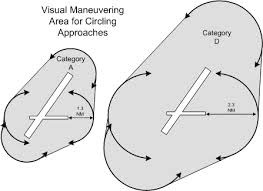
Corita Kent (Sister Mary Corita): tomorrow the stars (1966)
Inscriptions and Marks — Signed: l.r.: Sister Mary Corita (not assigned): Printed text reads: come alive / Tomorrow, the stars
"The East was looking iffy after Cheverly."
I employed a Circling process when searching for a place for us to live. Circling makes it particularly difficult to assess progress because the ending point of a Circling route is always back at the starting point. It often seems as though absolutely no progress has been made, affecting motivation. The only clues that I had been doing anything all day were the fresh marks on the master map denoting identified unsuitable areas. The Circling eventually managed to winnow down what seemed like infinite choices into a more blesséd few. I figured that any day I could disqualify an area had been well spent. I might not have produced any likely candidates, but if I had managed to eliminate territory, I wouldn't have to worry about further canvassing that area.
The elimination began before we started searching when we decided Northern Virginia would be unsuitable for our habitation.
AlmostRandomly
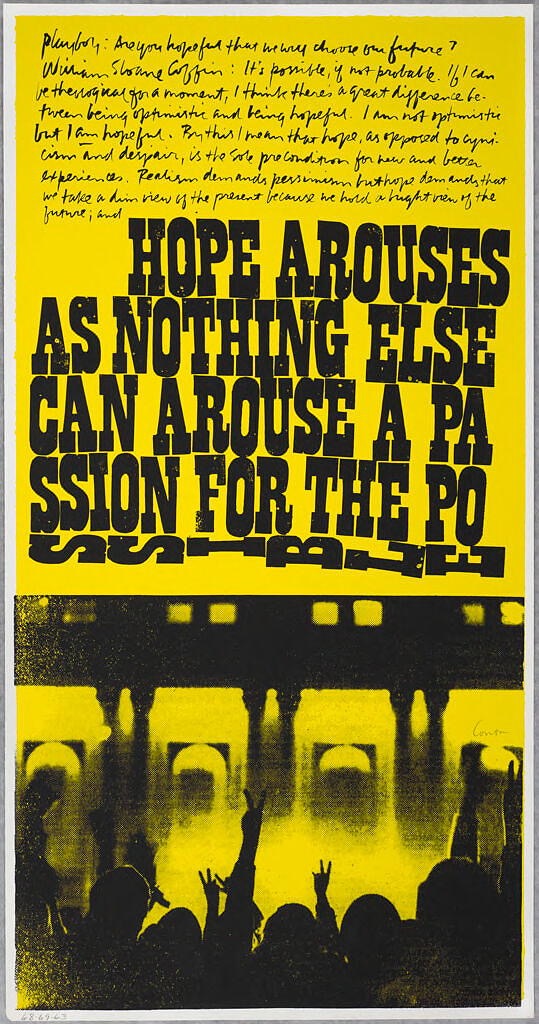
Corita Kent (Sister Mary Corita):
a passion for the possible (1969)
Inscriptions and Marks — Signed: l.r., within image: Corita
inscription: l.l., in graphite: 68-69-63
(not assigned): Printed text reads: Playboy: Are you hopeful that we will choose our future? William Sloane Coffin: It's possible, if not probable. If I can be theological for a moment, I think there's a great difference between being optimistic and being hopeful. I am not optimistic but I am hopeful. By this I mean that hope, as opposed to cynicism and despair, is the sole precondition for new and better experiences. Realism demands pessimism but hope demands that we take a dim view of the present because we hold a bright view of the future; and HOPE AROUSES AS NOTHING ELSE CAN AROUSE A PASSION FOR THE POSSIBLE.
"We continued searching AlmostRandomly …"
Our highest priority upon arriving in Exile became finding suitable digs. The Muse's employer had thoughtfully provided temporary housing through an Oakwood franchise, the sort of housing guaranteed to encourage short tenancy. I'd lived in an Oakwood property when working for a boutique Silicon Valley consulting firm fifteen years earlier. That was a sprawling two-story suburban affair ringing a swimming pool. This latest one was a fifteen-story highrise overlooking a firehouse. The swimming pool was situated out back behind security fencing and a thick hedge. Both were places that reeked of dislocation. I inhabited my Silicon Valley one four nights each week, baffling myself at the supermarket when failing to remember which refrigerator I was stocking. I'd invariably end up with too much and too little of some things because I could never keep my inventories straight. Our Arlington neighborhood of Rosslyn apartment wouldn't offer any such entertainment.
The apartment proved to be a definite downgrade from our usual and customary.
Weekly Writing Summary For The Week Ending 10/10/2024
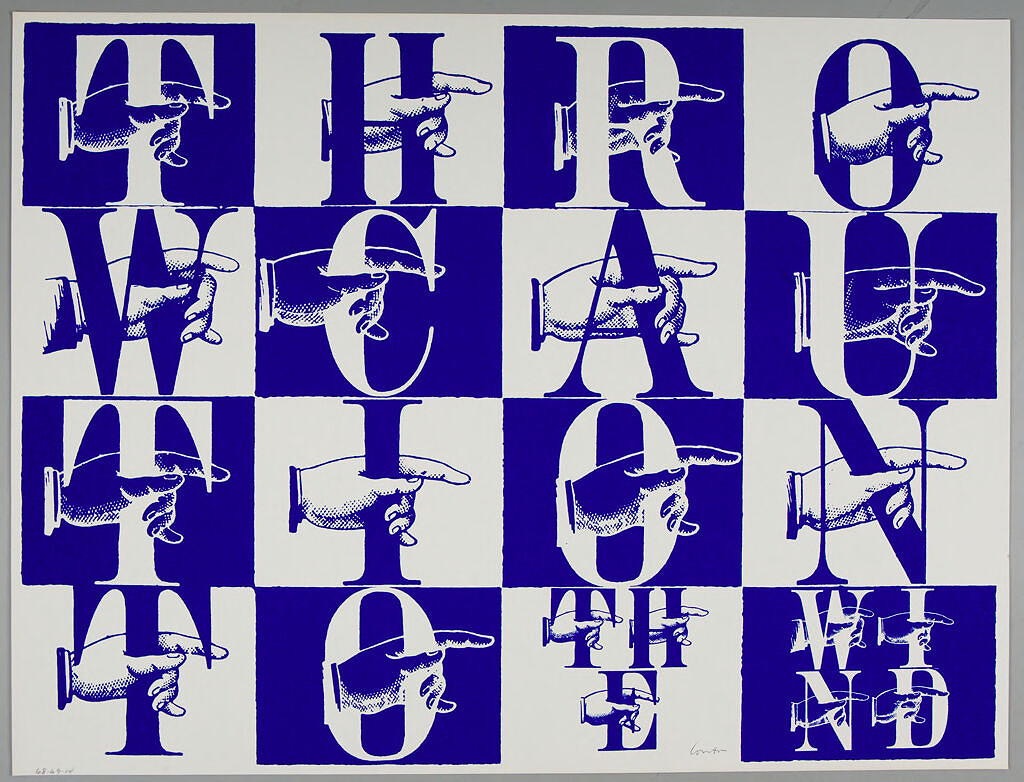
Corita Kent (Sister Mary Corita): n is for caution (1968)
Inscriptions and Marks
Signed: l.r.: Corita
(not assigned): Printed text reads: Throw caution to the wind
inscription: l.l.: 68-69-14
—
My Context Trying To Clue Me In
During an optometrist appointment this week, I was delighted to notice that I could easily read the bottom line on the chart with or without my glasses. My eyesight improved and stabilized after cataract surgeries four or five years ago. Those surgeries marked the end of my middle ages, for it was when prepping for the surgery that my high blood pressure was first acknowledged. I pled that I suffered from White Coat Syndrome, where the presence of a medical professional elevated my blood pressure to alarming levels, but neither The Muse nor the doctors bought my story. The Muse insisted, as only The Muse can insist, that I finally find a personal doctor. I'd successfully avoided having one through my remarkably healthy fifties and well into my sixties, but I complied and began regularly visiting pharmacies shortly after that. My blood pressure returned to normal, and my eyesight improved, so I felt satisfied when my eyes seemed to see so well during that latest examination. Then came the part where I was told to cover one eye and read the chart. My right eye worked fine, but the chart became a complete blur when I covered it to read from my left unassisted. I couldn't even read the largest letters. I spent the better part of a half-hour fussing about my performance before I checked my glasses. The left lens had some severe scratching, obscuring the view. I needed new lenses, not new eyes. How often have I mistaken some shortcoming as defining me when it was just my context trying to clue me in?
Variety
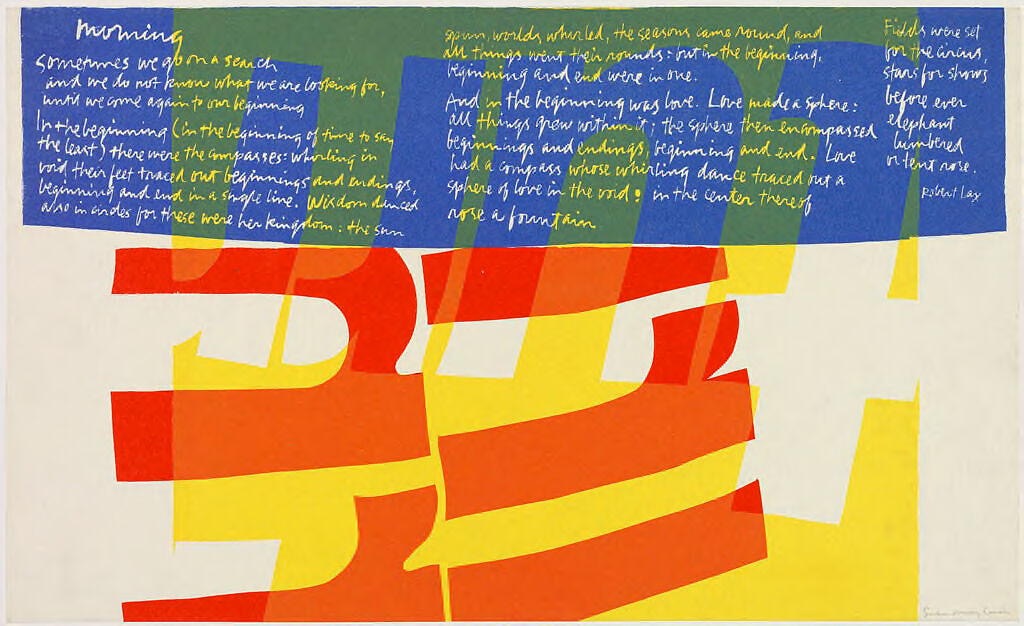
Corita Kent (Sister Mary Corita): morning (1966)
Inscriptions and Marks
Signed: l.r.: Sister Mary Corita
(not assigned): Printed text reads: [tu]r[n] [tu]rn / turn / Morning Sometimes we go on a search and we do not know what we are looking for, until we come again to our beginning In the beginning (in the beginning of time to say the least) there were the compasses: whirling in void their feet traced out beginnings and endings, beginning and end in a single line. Wisdom danced also in circles for these were her kingdom: the sun spun, worlds whirled, the seasons came round, and all things went their rounds: but in the beginning, beginning and end were in one. And in the beginning was love. Love made a sphere: all things grew within it; the sphere then encompassed beginnings and endings, beginning and end. Love had a compass whose whirling dance traced out a sphere of love in the void: in the center thereof rose a fountain. Fields were set for the circus, stars for shows before ever elephant lumbered or tent rose. Robert Lax
—
"I feel nostalgia for those times without wishing to return to them for a minute."
Washington, DC, surprised me. Like most cities, it seemed as if it would be something different than it turned out to be. Like New York City, which is merely a close association of remarkably small neighborhoods, DC is also tiny at its root. It carries much history on its shoulders, but it's not a very complicated place. It is, or always was, a "Chocolate City," one of the few with a genuine African-American majority. It also features one of the more entrenched aristocracies in this country, featuring diplomats and higher-ups to match or better any other place. It has more blue-collar workers than most places but also more white-collar ones. It features more professional administrators than anywhere. Those elected to high office might maintain their offices there, but an invisible cadre of office workers and security personnel manages their affairs. It's the best-guarded city, and nothing happens there without many pairs of eyes witnessing, confirming, and cataloging. It features more Variety than any other ten cities anywhere.
I noticed the Variety of goods sold in supermarkets first.
Shoestrings
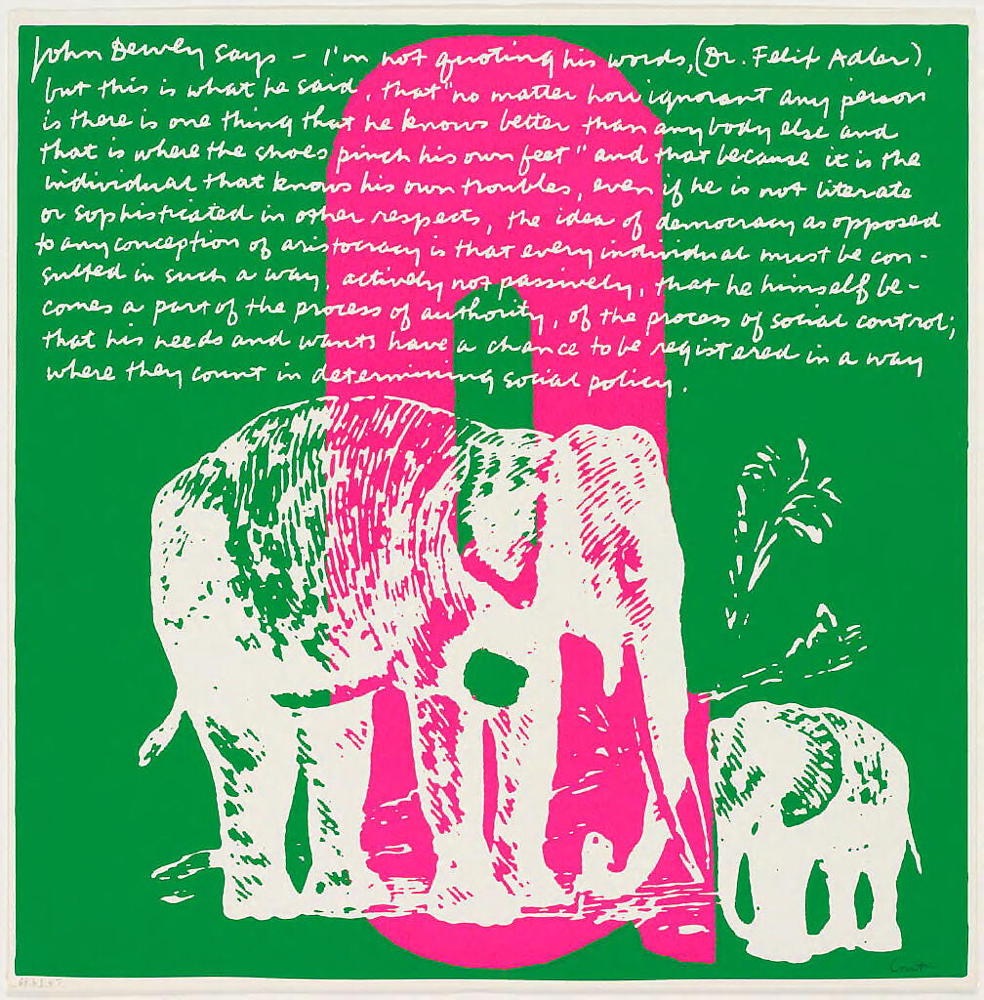
Corita Kent (Sister Mary Corita): elephant's q (1968)
Inscriptions and Marks
Signed: l.r.: Corita
(not assigned): Printed text reads: Q / John Dewey says-I'm not quoting his words, (Dr. Felix Adler), but this is what he said, that "no matter how ignorant any person is there is one thing that he knows better than anybody else and that is where the shoes pinch his own feet " and that because it is the individual that knows his own troubles, even if he is not literate or sophisticated in other respects, the idea of democracy as opposed to any conception of aristocracy is that every individual must be consulted in such a way, actively not passively, that he himself becomes part of the process of authority, of the process of social control; that his needs and wants have a chance to be registered in a way where they count in determining social policy.
inscription: l.l.: 68-69-47
" … undifferentiated others certainly originally came from one."
My parents' birth families seemed to the childhood me to be filled with contradictions. There appeared to be a profusion of odd relations: second and third cousins, step- and half-siblings, what my mom referred to as "Shoestring" relatives. Some were actually related by blood or marriage, while others were adopted, the sort of people one might choose, which, of course, one can never do with any blood relative. Most lived far away. We might have seen them once in all my growing-up years, through town for a reunion or funeral, and never to return. Most had legends associated with them. My mom could recite the stories as if she'd written them, though I suppose her mother taught them before she realized she was teaching her anything. Our Shoestrings complete already complicated enough family portraits.
When The Muse and I were Exiled, we could have sworn that we didn't personally know anybody in the entire region into which we were cast.
Escape

Edward Ruscha: Crackers [How to Derive the Maximum Enjoyment from Crackers] (1969)
"My incarceration was also an Escape …"
Being Exiled felt like an assault, an insult to my dignity and reputation. It was also a great gift that I couldn't, for the life of me, perceive at first, for every life is a mix of liberation and sentence. As liberation, it overflows with freedoms. As a sentence, it severely restricts movement. One must always be here rather than there, no matter how one might wish to be there instead. Perhaps a week away on what passes for vacation must serve as the only possibility for distraction. Most of the time, one must contend with the intended and unintended consequences of being themselves. No place seems all that glamorous that sees the same face waking up every morning. Variety might be the spice of life, but most lives are explicitly constructed to inhibit too much variety. They generally promote even more of even more of the same.
So, being Exiled served as an Escape from those patterns.
AShamed
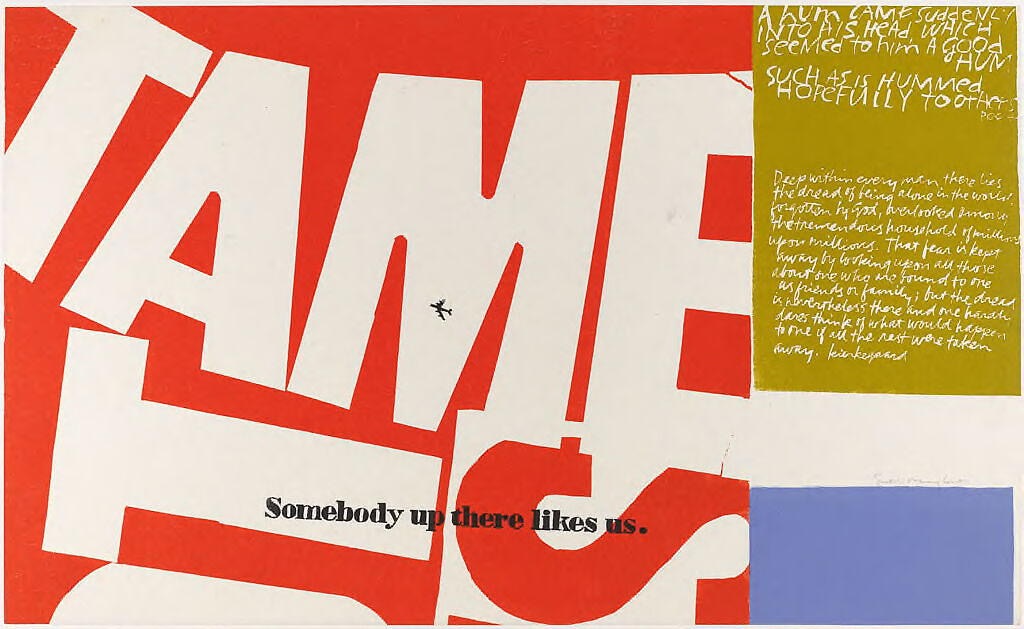
Corita Kent (Sister Mary Corita):
(tame) hummed hopefully to others (1966)
Inscriptions and Marks- Signed: l.r.: Sister Mary Corita
Printed text reads: TAME [IT']S [NO]T / Somebody up there likes us. / A hum came suddenly into his head, which seemed to him a good hum such as is hummed hopefully to others. Pooh / Deep within every man there lies the dread of being alone in the world, forgotten by God, overlooked among the tremendous household of millions upon millions. That fear is kept away by looking upon all those about one who are bound to one as friends or family; but the dread is nevertheless there and one hardly dares think of what would happen to one if all the rest were taken away. Kierkegaard
" … one helluva way to make a name for myself."
I was Exiled in considerable shame. Not shame bestowed by anybody else, with the possible exception of a certain misguided skip-chaser who called several times each day from different numbers to harass me about my recent bankruptcy, and most certainly not the citizens of my hometown, who treated The Muse and I with only the utmost decency and respect once our dilemma became public. No, I'm afraid I shamed myself. This was perhaps a misguided act of sincere contrition, for it sure seemed that someone should take the blame for everything leading up to our being expelled from our Eden. In my own misguided fashion, I blamed myself and set about extracting satisfaction in the form of the most profound damage anyone can ever do to themself.
Shaming is no simple form of blaming.
AnAloneliness
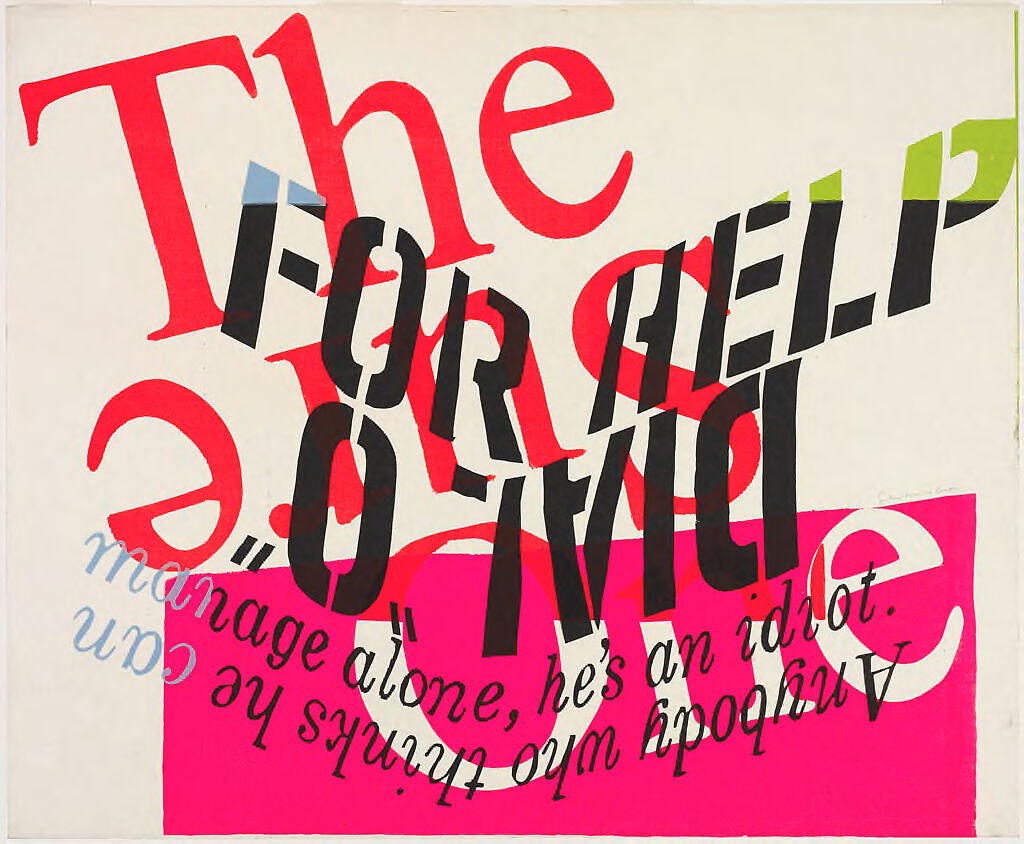
Corita Kent (Sister Mary Corita): the sure one (1966)
Printed text reads: Dial "0" FOR HELP
/ The Sure One
/ Anybody who thinks he can manage alone,
he's an idiot
" … damned to return to a world poorer for his absence after inhabiting a world seemingly poorer for his presence."
The Exile didn't begin until about ten days after The Muse and I left our home behind. We spent most of that first week driving across the country to our temporary apartment in the Rosslyn neighborhood of Arlington, Virginia, every inch of twenty-six hundred miles from what had been our home. On the way, we stayed over one night outside of Kansas City with dear old friends, though we were hardly even shadows of ourselves by then. We'd seen Sandhill Cranes gathering like angelic buzzards along the Platte River reaches near Grand Forks, Nebraska. Our cats were grateful for a night over in something other than a motel room. I guess we were sociable enough. The next night found us in Lexington, Kentucky, and the following in Rosslyn. It took three trips to empty the car of all our possessions, up and down in the elevator from the underground parking garage.
Other old friends happened to be passing through town that weekend.
Grooves
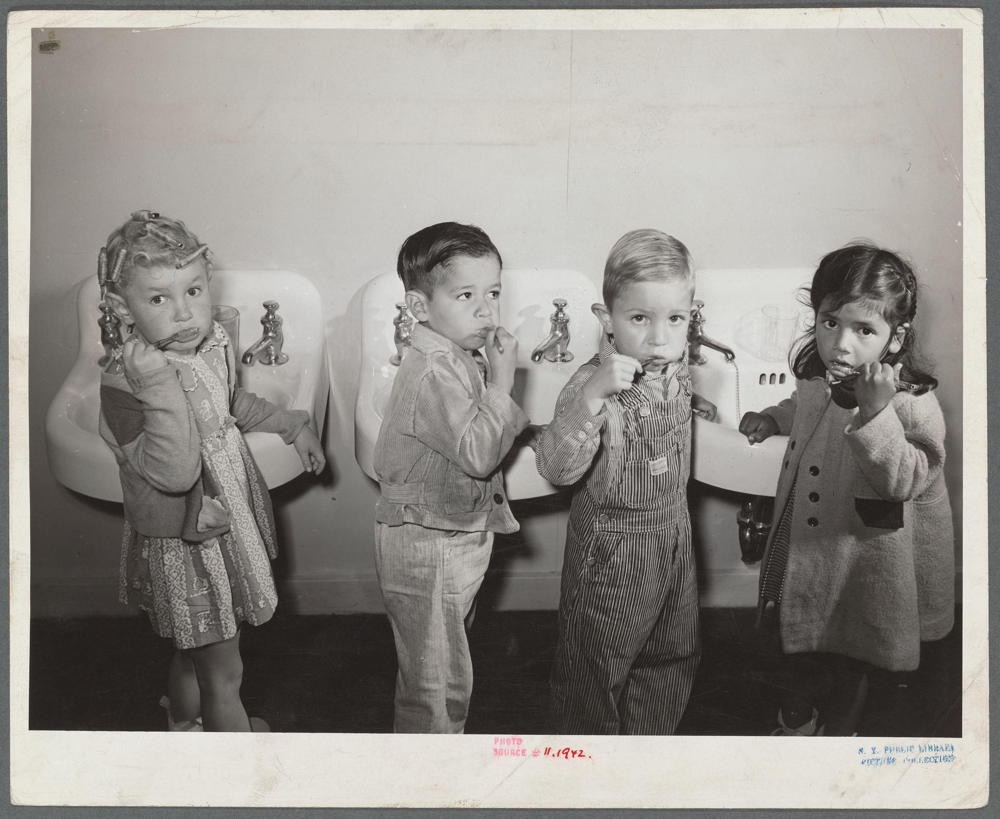
Arthur Rothstein: Morning routine, nursery school,
Harlingen, Texas. FSA camp. (1942)
United States. Farm Security Administration
"Losing our Grooves leaves us wandering relatively aimlessly in wilderness."
Being Exiled separates one from their Grooves, their essential routines that pretty much define them. Grooves might seem non-essential, but after losing every other point of orientation, a Groove or two prove at least reassuring, perhaps even confirming. They are who you are and were inseparable before they weren't. Loss of home might feel like loss of self, but losing those Grooves seals the separation. Through early Exiled days, I moved around in a definite haze. I couldn't find my rhythms, the cadences within which I engaged. I suffered from a form of arrhythmia where nothing seemed to work right. I could continue doing anything I'd done before, but without an essential elegance, as if I'd been thrown back into rank amateur status. Even activities in which I'd grown skilled became difficult. I was more likely to slice my thumb when in the kitchen. I'd even nick my chin when shaving.
Grooves grow to become invisible.
Weekly Writing Summary For The Week Ending 10/03/2024
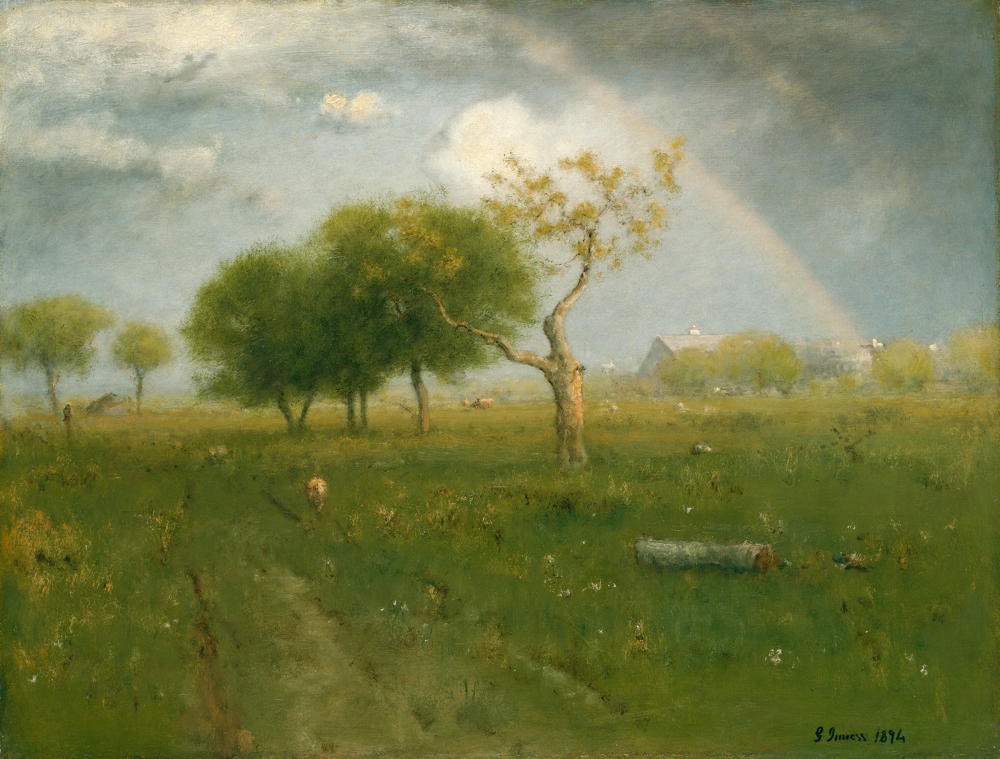
George Inness: After a Summer Shower (1894)
It Cost Us Much More
I woke this morning to find Molly, our nearly feral girl cat, curled up on top of The Muse's open suitcase. We'd returned home the afternoon before to find our boy cat Max waiting and ready to mount my lap for some overdue petting. Molly had slipped in unnoticed later for her quick bite of supper before disappearing back out into her waning summer. The Muse harvested the week's worth of ripe tomatoes from our extraordinarily productive garden, and we took supper inside, the outside temperature having plummeted into Autumn in the short time we'd been gone. Our absence had made our hearts grow fonder for this place from which we were so long ago Exiled. Homecomings since have been uniformly sweet. They make the leaving seem worthwhile even though the world we find out there seems increasingly hostile to innocent visitors. Decent digs seem almost impossible to find. We traveled well again, our style honed in no small measure by our long-ago exile. We travel almost exclusively via roads few consider taking. We avoid schedules, often stopping to read and learn from those roadside readerboards. I gratefully slow to allow whoever's behind me to pass, lest they follow too closely and learn our sacred secrets. We learned to find our way by being rudely Exiled and thriving anyway. May we never have to go away like that again. I'm grateful, though, for the learning being laid low afforded us. I'd say our understanding's priceless, but it cost us much more than that. It's worth more, too.
SecretPassages
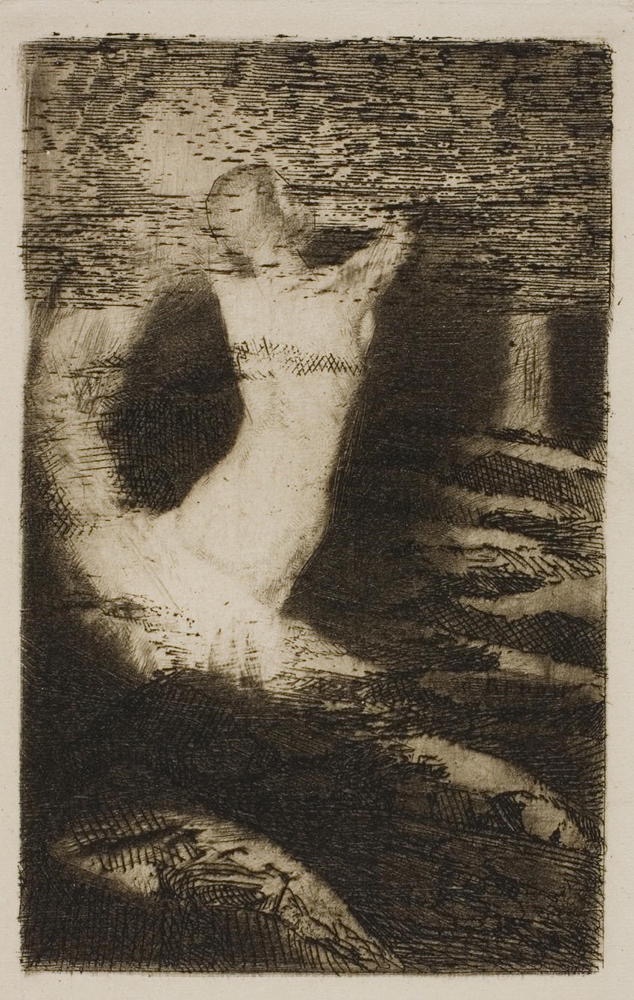
Odilon Redon: Passage of a Soul (1891)
"The roads least taken tend to be the ones most worth taking."
The Exiled do not readily adopt their new home. They naturally resist assimilation because too easy an integration might serve to disrespect their "real" home. They will find many reasons why their new station seems inferior, however superior it might objectively seem to every other observer. Traffic became chief among my complaints when we landed in Northern Virginia. Traffic had evolved into absolutely unworkable patterns there, where the bulk clogged what were euphemistically referred to as arteries. These often proved to be among the longest paths between any two points, but paradoxically also the most traveled. I believed that this had more to do with habit than design. People often follow what appear to be the wider paths, for instance, when narrower ones might make more sense. Of course, if everyone followed these shorter paths, they'd become clogged, too, so I worked hard to keep my emerging SecretPassages secret.
Chief among my strategies for keeping my SecretPassages secret involved turning off any navigation apps that might be recording my passage.
Anonymity
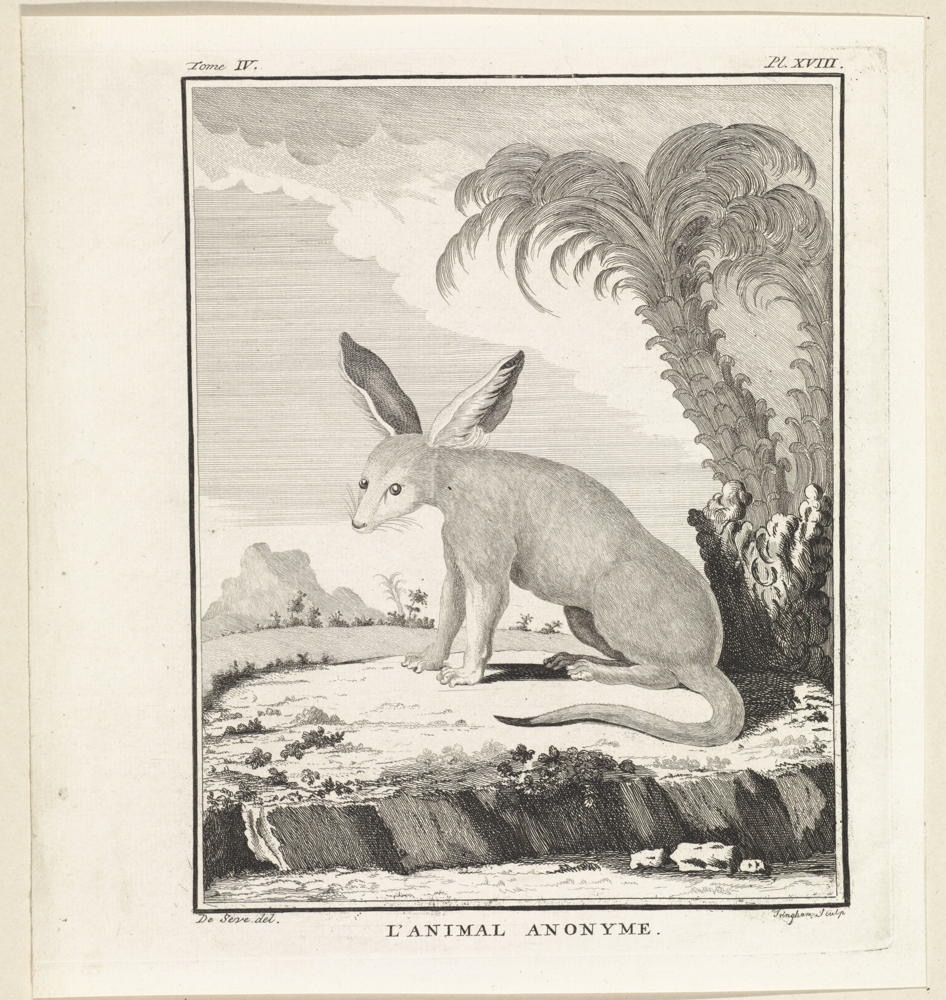
W. Tringham, after Jacques de Sève:
Onbekend dier [Anonymous Animal] (1773)
" … I sense myself a better man …"
Anonymity might be the one utterly reliable superpower that the newly Exiled possess. Though stripped of most of their possessions, they all acquire this one in exchange. It might initially seem freeing to move about the world with nobody watching or anyone watching having no clue what they're seeing, but this gift has indefinite limits. The anonymous hold little influence. They have nobody they can call to help them out should they get themselves into a jam. They can go anywhere without fear of being recognized, but they tend to roam few places where such recognition might matter. It's as if they exist without any observers, without any risk or hope of accidentally bumping into someone influential and embarrassing themselves. The Anonymity, while initially freeing, comes to wear one down. If nobody knows you from Adam or Eve, it might become difficult to know what you believe. Acquaintances can at least remind you who you are or who you used to be, and without that feedback, it grows difficult to remember who you are or were in this world.
Anonymity reliably produces ghosts.
ExPat
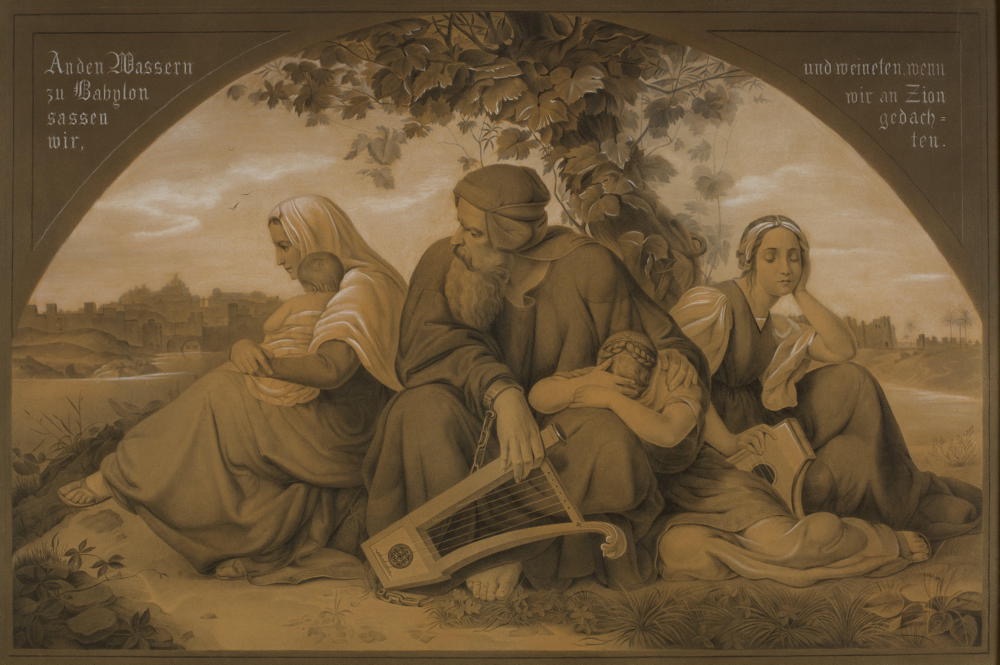
Eduard-Julius-Friedrich Bendemann:
The People of Jerusalem in Exile (c. 1832)
" … not actually sentenced to spend time in jail but still there, even if Just Visiting."
Before we'd found permanent housing, we discovered that we'd been Exiled into the one place with more Exiles than any other place in this country. Federal government employees are routinely sent "on station," assigned to work in Washington for periods ranging from a few months to a few years. Thousands are encouraged to volunteer for these assignments, promised better future promotions, and a deeper understanding of how the system they're a part of works. Many bring their families, but more don't, and consequently, there are thousands of people left wondering what to do on weekends. Many work right through their weekends, figuring that the sooner they finish their assignment, the sooner their exile might end. Local connections seem challenging to make. The locals have families to attend to, and other ExPats have their own lives to live. Further, the sheer size of the DC Metro area means that people who work next to each other throughout the week might bunk fifty or more miles apart. Consequently, an Expat's life can be lonely.
The Muse and I, within a couple of weeks of arriving, began hosting a Sunday night potluck supper at our temporary digs.
Accidentally
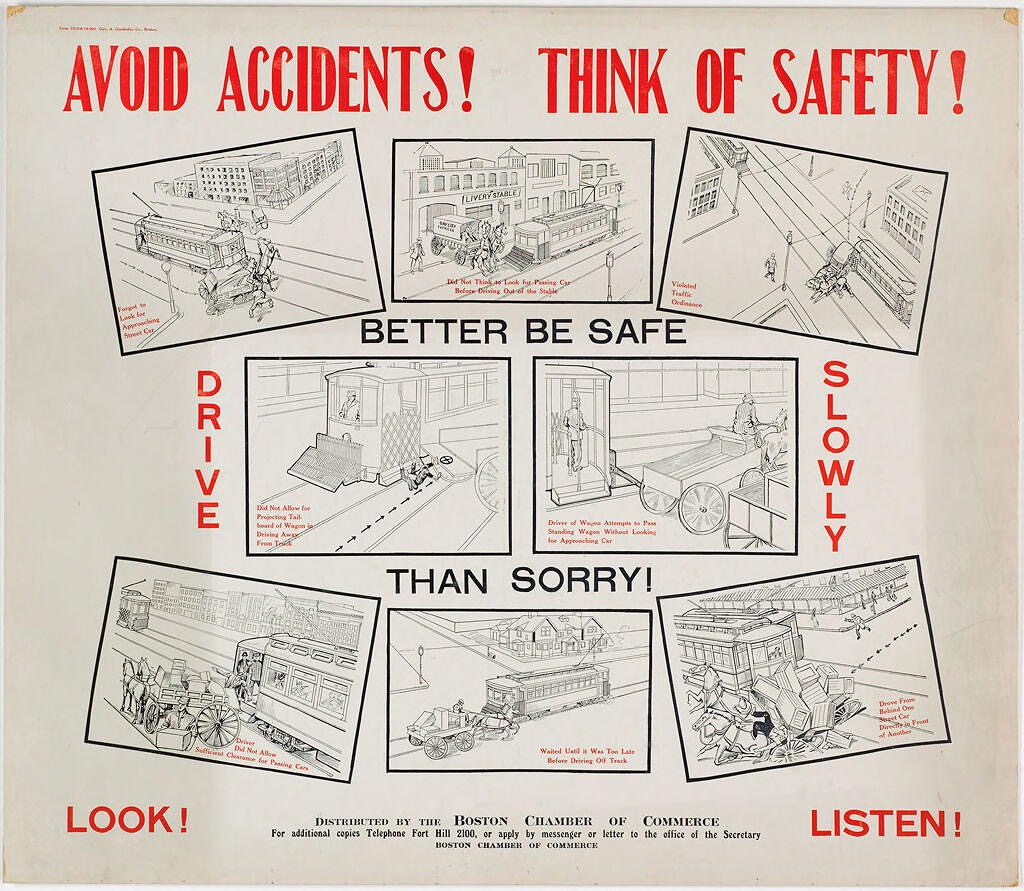
Unidentified Artist: Avoid Accidents! Think of Safety!
[Series/Book Title: Social Museum Collection] (c. 1903)
" … we ended up Accidentially thriving there …"
Our Exile separated The Muse and me from much more than our beloved home. It also separated us from our accustomed means of thriving. The Bankruptcy cleaned out our liquidity and, with that, our sense of identity. If we lacked money, how would we be able to continue pursuing our purpose? How would we be able to purchase what we needed to survive, especially once we'd relocated into one of the pricier housing markets in the country? We had no idea how we'd survive. We kept moving forward As If, perhaps taking heart from the parable of The Birds of the Field, who apparently manage to get by without the usual means to survive. They manage to live Accidentally On Purpose if that makes any sense. Of course, that notion makes no sense whatsoever to anyone schooled in this culture. Here, we carefully plot our course before purchasing passage. We thrive through planning, or so we continually insist. We're schooled to avoid accidents and believe that accidents result from poor planning and that accidents suggest terrible things about us. We even revile the accident-prone.
The Muse and I set about living Accidentally On Purpose.
Familiars
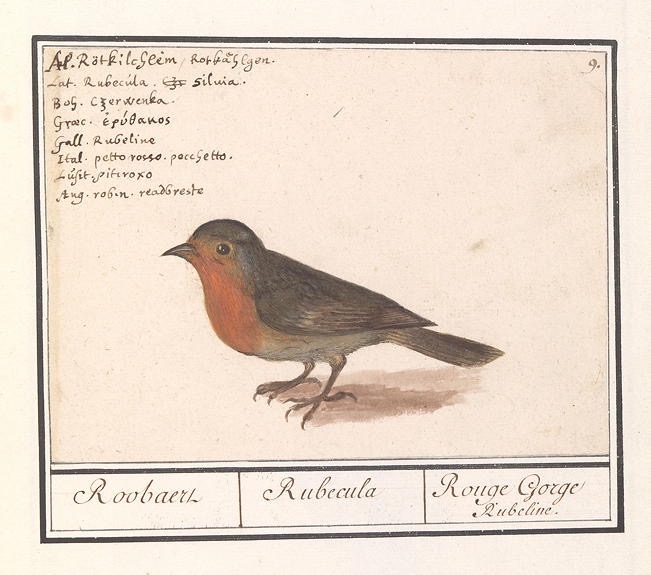
Anselmus Boëtius de Boodt: Robin
[Erithacus rubecula] (1596 - 1610)
" … long ago when I still expected novelty to light my way home."
I sought out novelty before we were Exiled. After, I felt more attracted to Familiar things, to Familiars. Before, I'd considered myself adventurous when seeking some odd or unusual experience. I'd order the wild boar in the restaurant and seek out the Stearnwheeler supper cruise. I'd gather these experiences like some collect bracelet charms, believing myself especially blessed and a bit courageous. I once drove over an hour to find a trailer in the Arizona desert where a retired fireman from Poughkeepsie had set up shop selling rattlesnake rattles so I could return from that trip with unique gifts for my kids. I preferred to take the less-traveled roads and thought myself unique. That was before I was Exiled.
After being Exiled, I sought out Familiars, even the formerly banal ones.
Leaving

Harry Sternberg:
Father Leaving Home with Suitcase
[Series/Book Title: Life in Woodcuts] (20th century)
"I no longer need to take leave."
The drive up and out of The Walla Walla Valley that first morning of Exile felt promising, for our possessions were already on their way, and we'd been left behind. It seemed as though we were only trying to catch up to our life as we headed East across the Blue Mountains and on through Southern Idaho into Utah. We made Evanston that first evening, just as far as my to-be first wife and I had made it the first morning of our initial Exile thirty-five years earlier. We were catching up to our lives then, too. She was chasing her first job after graduating from university, and I was tagging along, heading into what was then still a seemingly great unknown. I was twenty-two and had never experienced humidity, which made me a virgin of sorts. I'd never imagined what most of the rest of the country routinely experienced, clear evidence that I'd left Eden for some alternate universe inhabited by heathens. Why would any sentient being tolerate high humidity? It did not make sense!
With that first Exile experience and a lifetime's accumulation of others, I'd grown familiar with Leaving.
Weekly Writing Summary For The Week Ending 9/26/2024
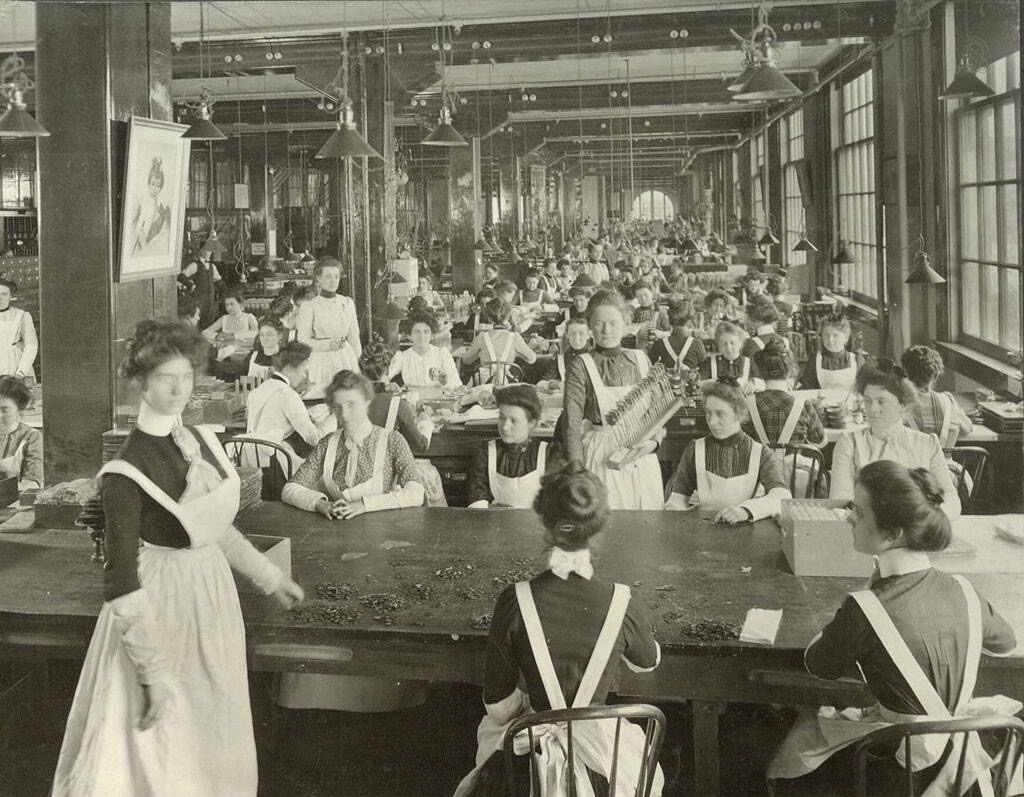
Unidentified Artist: Industrial Problems, Welfare Work: United States. Ohio. Dayton. National Cash Register Company: Welfare Institutions of the National Cash Register Company, Dayton, Ohio.: Departments: Showing White Aprons
Series/Book Title: Social Museum Collection (c. 1903)
A Requisite Humility
Six hundred and sixty square feet of clear verticle grain Douglas Fir tongue and groove boards were delivered to my driveway yesterday. They represent the start of the final chapter in a two-year quest to refurbish our formerly beleaguered front porch here at The Villa Vatta Schmaltz. Those who have been paying attention will have noticed the continuing disruptions I've been reporting for nearly two months. At least two more months of effort remain to finish constructing the structure that will support the porch deck and then to lay those lovely gold-plated deck boards and the bead board ceiling, not to mention the dressing out of the new posts and beams and the construction of the new railing, top and bottom. My role in all this effort has largely been as sponsor and chief miscommunicator, for however skilled I might be as a writer, I suck as the supervisor of construction efforts. The workers speak in nearly indecipherable dialects heavy with incomprehensible terms. I banter through sixteen-inch centers as if I understand what I am saying. I later learned that I sometimes misrepresent my best interests by simply showing interest. Those trying to read the boss imperil the whole enterprise. Any boss trying actually to boss anybody proves to be a serious hazard to navigation. I am reminded how critically important ineptness always proves to be in every undertaking. It usually insists upon a requisite humility and more patience than Job.
CashEconomy
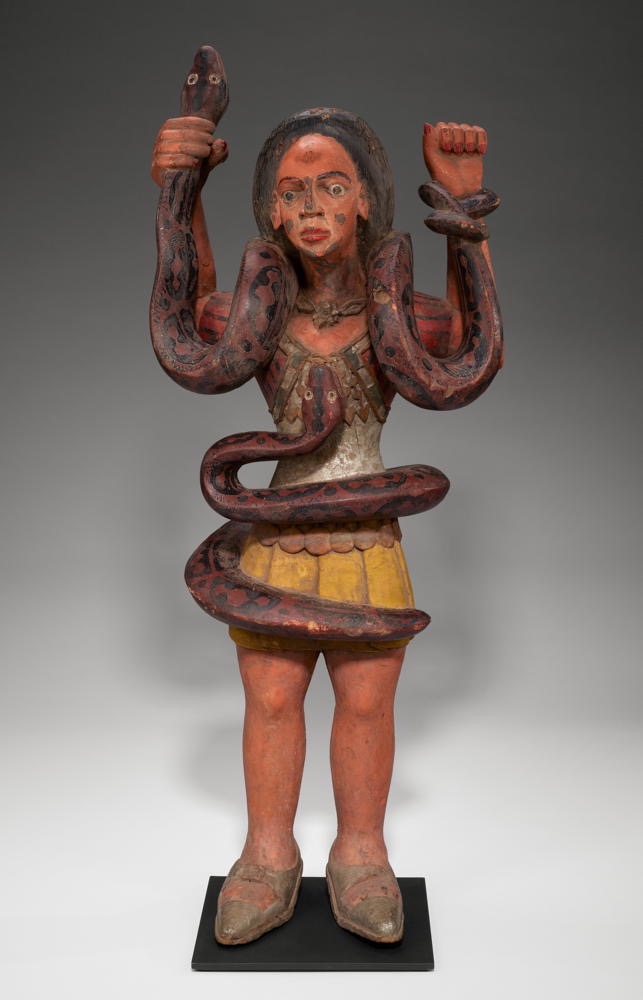
Unknown Igbo Artist: Mami Wata figure (1950s)
"I might have been broke, but never broken."
The bankruptcy rendered us effectively insolvent. We entered a previously unperceived CashEconomy. It was as if the economy had suddenly returned to the gold standard, and we had no access to gold. Modern economies do not trouble themselves very much with cash. It serves more as an artifact than as a means of exchange. It becomes a metaphor, a way of speaking about value rather than a means for holding it. Modern economies transact exchanges with symbols once or more times removed from actual specie, just as CashEconomies sit at least once removed from their underlying gold. It's enough that Fort Knox holds reserves. Remember, it became illegal for private citizens to hold too much gold, even when we were still on the so-called gold standard. Such conventions ultimately came to limit economic potential, and so were done away with in favor of plastic and similar, more imaginative systems.
The most profound initial effect of the bankruptcy was a radical loss of liquidity.
Hopefulling
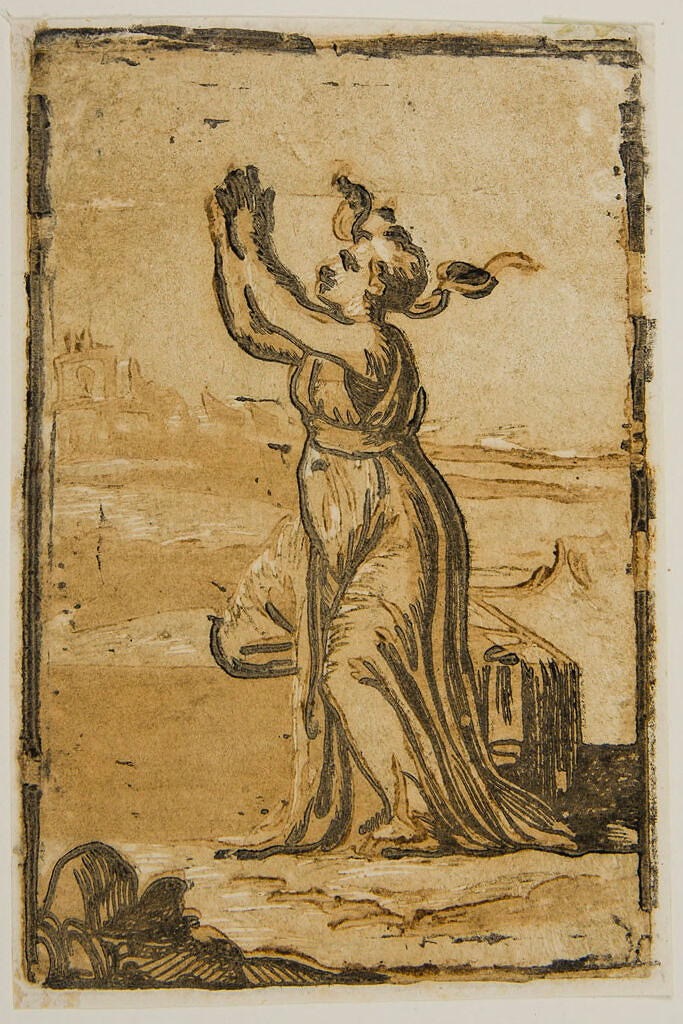
"(Giuseppe Niccolò Vicentino)(After Parmigianino)
(Previously attributed to Circle of Ugo da Carpi): Hope
(Sixteenth Century)
"We were never caught once."
We entered our Exile curiously hopeful. We had every right to engage in despair, for we had fallen far. We'd been within a month of moving into barrels, becoming cartoon-character destitute wearing barrels with suspenders, yet we felt hopeful instead. Obama had just been inaugurated, and Hope was in the air. We would be there, near where the upcoming miracle would happen, next to ground zero of the transformation. The Muse would even participate in her role in the bowels of The Department of Energy's Biofuels Development Office.
My role was unclear.
BeneathMe
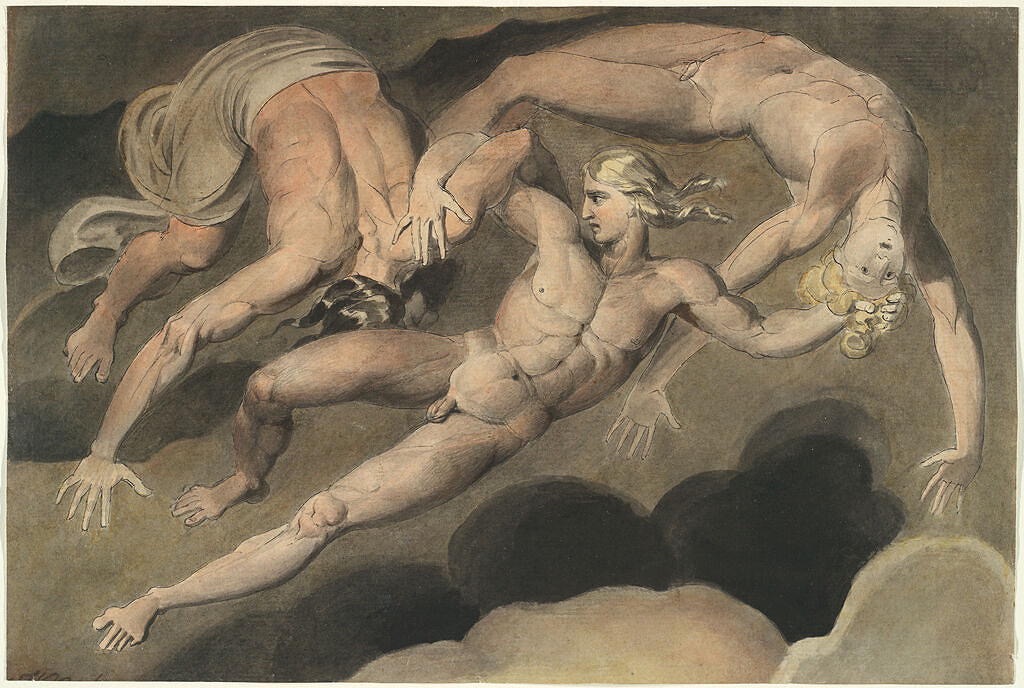
William Blake: Fallen Angels,
Alternate Title: Three Falling Figures (c. 1793)
"Maybe I could find a new identity, even one AboveMe there."
While attending university in Portland, my first wife and I lived in a main-floor-of-an-old-house apartment on a busy arterial. When friends moved out of their main-floor-of-an-old-house apartment on top of Mt. Tabor with views of both Mt. Hood and Mt. Saint Helens, we moved in a minute and soon came to think of ourselves as the sort of people who lived on top of one of the more prominent vistas in the city. Later, when our landlord decided to raise the rent by the amount of the increase in the Consumer Price Index each month, we decided to buy a house. The best we could afford was located down in what we called The Flats, a neighborhood far beneath our accustomed station, with industrial operations squeezed between houses. The adjacent milk bottling plant left the neighborhood smelling of sour milk most mornings. All claims to have been urban pioneering aside, we felt as if we had been Exiled into a third-world nation. It would be where we'd raise our kids and live our lives. In retrospect, it doesn't seem half as demeaning as it felt.
I recognized that old familiar feeling when The Muse and I landed in Roslyn, Virginia, at the beginning of our later Exile.
Experienced
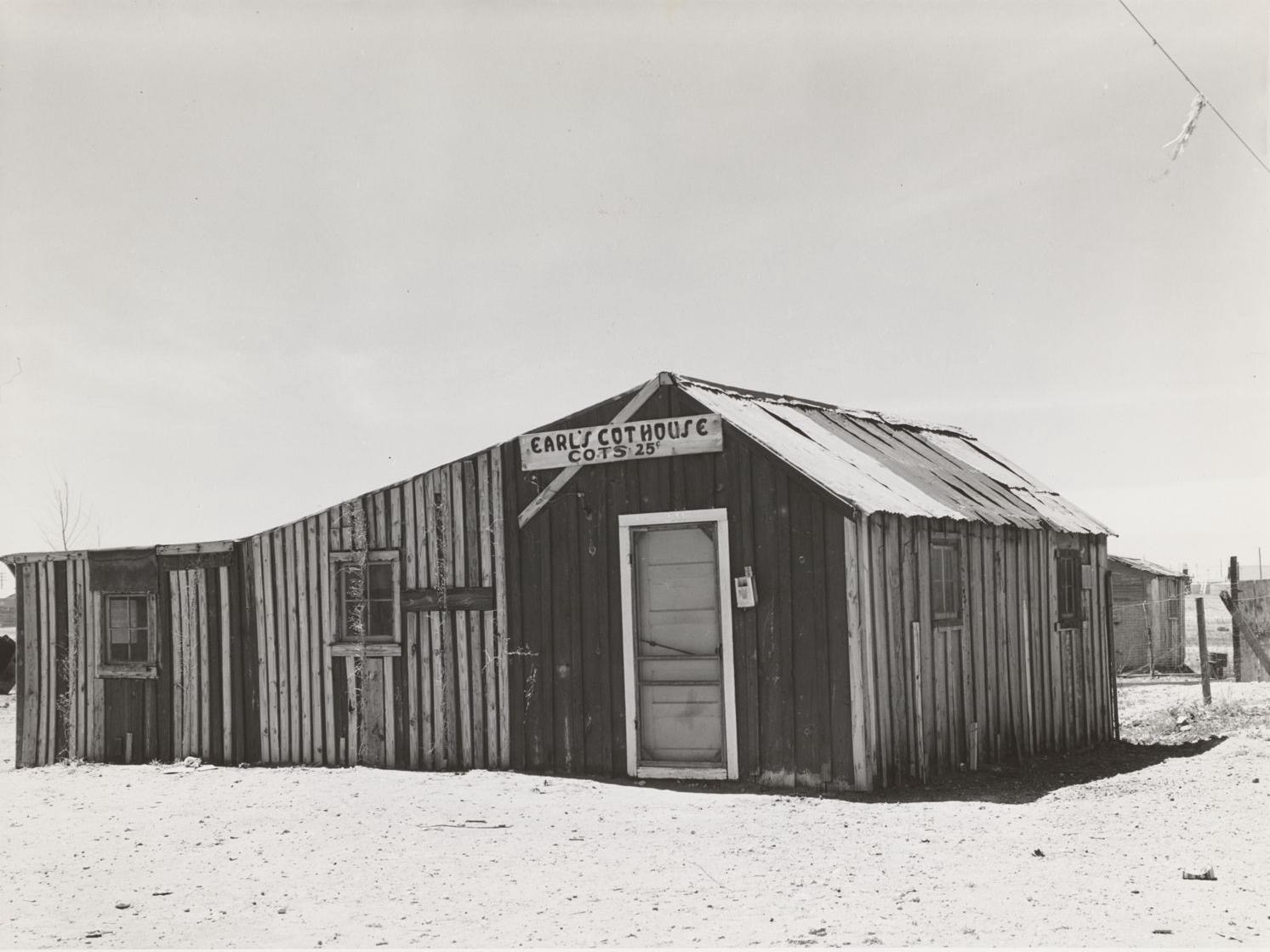
Russel Lee: Cot house in the oil town of Hobbs, New Mexico. Hobbs is now experiencing a boom and the cot houses are necessary for the swarms of workers who come in. This is typical of all oil boom towns. (1940) United States. Farm Security Administration
"I'd been shipwrecked before. I knew the routine."
Until The Muse and I were Exiled following our unfortunate bankruptcy, I hadn't understood how Experienced I had been at the odd art of exiling. Anyone accustomed to living and working in a place might never suspect a simmering exile economy surrounding them. Traveling salespersons might live in perpetual exile, as do consultants. I had been a consultant before the crash, so I had grown accustomed to working anywhere but home. One year, I stayed in fifty different hotel rooms and a few for longer than overnight. Each business trip amounted to a practice exile, for I would be rechallenged to find a cup of decent decaf and an acceptable bakery. I ultimately came to pride myself on being able to locate both within an hour of landing in any strange city. Traveling for a living seemed little different from being Exiled, except for the returning home part.
Leaving home was another matter.
Exiled
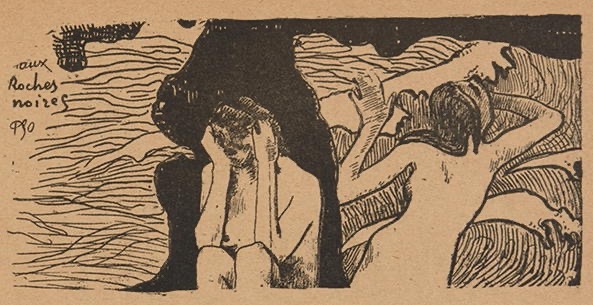
Paul Gauguin:
cover art for Catalogue de l'Exposition de Peintures du Groupe Impressionniste et Synthétiste
[Catalogue of the Exhibition of Paintings of the Impressionist and Synthetist Group] (1889)
Book containing eight zincographs and letterpress text
in black ink, with photomechanically printed gray stripes on cover, on tan wove paper
"I never learned how to feel as though I belonged there."
In late March 2009, The Muse and I left our beloved Villa Vatta Schmaltz for an indeterminate exile. Over the prior month, our local newspaper had published my series of essays entitled The White Collar Recession, which recounted our recent dénouement, our fall from grace. The prior autumn's economic crash had left our once-thriving business and us bankrupt. Coming concurrently with my father's death, the blow had been devastating. We fully expected to lose everything, including our beloved Villa, once the symbol of our success turned into our most visible evidence of failure. The bankruptcy administrator found us faultless, but his judgment did little to assuage our feelings. We were less than a month away from moving into a barrel when The Muse was offered a prestigious job with one of the Department of Energy's National Laboratories. The rub was that we would have to relocate far from the center of our universe. When entering that stage of life where we had been expected to be winding down our wandering, we were forced to rewind ours. By the time the newspaper declared my White Collar Recession their second most popular series of the year, we were no longer there, for we had been Exiled.
We landed in a close suburb of Washington, DC, Roslyn, Virginia, in transition housing, a sixth-floor apartment overlooking a firehouse and beneath the final approach to National Airport with two restless, edgy cats.


